- Teaching & Library Information
- Administration & Finance
- Personnel & HR
- Governance & Policy
- Website Content Management & Comms
- Staff Wellbeing

Travel Insurance
Updated April 2024
How to apply for cover
The University has a block travel insurance policy which will provide cover to students and University staff travelling on University business. All travel insurance applications are made through an online applicati on process: once submitted, applications are automatically routed for departmental authorisation. If you do not wish to apply for University travel insurance, the system can also be used to register travel details so that in the event of any crisis the University can provide support. The University will not reimburse the cost incurred by individuals if they chose to take out their own, alternative insurance.
Supervisors
The on-line system asks for the name of a supervisor. For graduate students this must be the main supervisor named on GSS; for research staff this should be either the PI, supervisor or centre director, as applicable; and for undergraduates on their year abroad this will be the IECL Administrator. The supervisor will be sent a system-generated e-mail asking them to approve the travel, before the application then comes back to the Faculty Office to be processed as normal.
Application and Approval Process
Insurance cover will only be effective if the application has been approved by the Faculty Office prior to the date of outward travel . If insurance applications are not received prior to travel, staff will not be insured and will be personally liable for the costs of any loss, injury or delay which occurs while they are abroad. If booking flights, it is recommended that you apply for insurance at the time you make the booking and in all cases at least two weeks before the proposed date of travel to allow time for the application to be processed and approved. For high risk travel requiring Saftery Office approval please apply at least four weeks before the proposed date of travel .
The application process can be accessed through the University travel insurance website . You will be required to enter your personal traveller details the first time you use the system: these will be stored and need only be reviewed /amended as necessary for future applications. You will then need to add trip information and attach supporting documentation by file upload where applicable: this will include risk assessments.
The University’s policy will cover reasonable personal time (e.g. weekends off at the end of a full working week), but if you have considerable personal time booked then you are advised to arrange your own cover for that period. To be eligible for insurance, staff and students must be travelling on business for the University of Oxford, and must be members of staff or students in the Faculty of Law. Any queries about this should be forwarded to Tarquin Holmes in the first instance.
Risk Assessments
In accordance with University policies on fieldwork and overseas travel a suitable and sufficient risk assessment is required for all international travel on University business, as well as all fieldwork. Click below to download the template.
Academic postholders : must complete the whole risk assessment if they are undertaking fieldwork, but need not complete it for low risk travel, because low level risk is managed through the online insurance system.
Students and researchers : must always complete the first stage of the risk assessment for all travel, and must complete the whole risk assessment for fieldwork and/or medium or high risk travel, and in all cases this must be signed by their PI or Supervisor.
Fieldwork and Travel Risk Assessment Template
See also: assessing risk for fieldwork and travel
A completed risk assessment must be uploaded to the insurance application prior to submission: your application cannot be progressed without it. Where travel includes any destination which is the subject of a Foreign and Commonwealth Office warning then referral will be needed to the insurers and the template must be submitted at least six weeks prior to planned departure in order for the Faculty to ensure that insurance cover can be obtained. In all cases the Dean or her authorised deputy must authorise travel requests.
High Risk Travel
High risk travel is travel to countries / regions where the Foreign, Commonwealth and Development Office ( FCDO ) have advised against all travel or all but essential travel, including any ‘red list’ countries.
The University Safety Office must review and advise on the suitability of risk assessments for high risk travel. The Faculty will review your risk asessment in the first instance and it will then go to the Safety Office for review and sign-off. This may involve requests for additional information and corrections so your timetable must allow at least two weeks from submission for the Safety Office to review and respond.
In addition to Safety Office sign-off, the Dean of the Law Faculty must approve high risk travel, which must be academically essential. Full details, including information on what constitutes academically essential travel, are provided in the International travel approval framework for HIGH RISK travel .
Ethics approval
If your research involves human participants, for example interviewing, participant observation, or archival research where the researcher can trace information back to an individual, you may need ethics approval before you undertake your fieldwork. Please refer to the further information about research ethics .
On this page
Related websites.

Study abroad
As a truly global institution, the University of Oxford understands the importance of international experiences to your academic, career and personal development. There are opportunities to study, work, or undertake research in dozens of countries across the globe.
For a wide range of study, exchanges and research opportunities abroad, including eligibility, funding and application deadlines, visit the international opportunities webpage.
Before undertaking a period of study abroad, please ensure that you are aware of the following information.
Costs while abroad
In most circumstances you will still be required to pay fees for your course if you are undertaking a period of study abroad. Undergraduates on a course that includes a compulsory or optional year abroad will need to pay Undergraduate Year Abroad Fees at Oxford.
Living costs will vary according the country where you undertake your studies. You should be able to gain information on the cost of living from your department and other students who have previously undertaken the year abroad. Turing students receive a mobility grant in order to assist with the additional costs that occur when studying or working abroad.
Health and safety
Ensure you know what health measures you must take before travelling to your chosen country, whether it’s vaccinations, malaria tablets or having a supply of any prescription medication you require. The University Occupational Health Service can provide travel advice and immunisations for medical students doing electives abroad. Travel services are also available from your college doctor. Some countries will want to see documentation that you have had any necessary injections. If you require prescription medicines, take a full supply and also find out from your doctor the generic name for the medication as it may have a different brand name overseas. You might want to include basic medicine such as paracetamol and anti-diarrhoea drugs, sunscreen and insect repellent.
The societal attitudes and norms may be different from those you are used to. In particular freedom of political expression and rights to free speech, freedom of sexual expression and attitudes to same sex relationships; attitudes and the law pertaining to alcohol and other drugs. The age limits for participating in various activities can also vary according to location and, in most if not all countries, ignorance of the law is not a defence against prosecution.
HIV infection is common in developing parts of the world such as Africa and South East Asia. There are rising rates in India, tropical South America and the Caribbean. In addition there are emerging problems, particularly with infections such as syphilis, in the former USSR and other eastern European countries. There is considerable risk in having a blood transfusion in any of these areas. Unless it is a matter of life and death, a blood transfusion should be avoided, and it is very important that you have first-class insurance that covers repatriation on medical grounds without delay.
Advice may be obtained from the University Occupational Health Physician. Before you travel you may wish to consult the guidance on fieldwork issued by the University's Safety Office. Also ensure you note the address and contact details of the relevant Consular office in your chosen destination, available at the Foreign and Commonwealth Office website . It is essential that if you change your plans you contact your college or department and inform them of this.
If you are in receipt of an award you should consult your grant-giving authority to find out what assistance is obtainable for medical insurance cover. Whatever help is available, you should ensure that your level of insurance cover is adequate for the countries to be visited including the cost of prompt repatriation which may well be preferable if you have an accident or fall ill. The University has a travel insurance arrangement that can be used by those travelling abroad for a University purpose, including undertaking research.
Systems & Services
Access Student Self Service
- Student Self Service
- Self Service guide
- Registration guide
- Libraries search
- OXCORT - see TMS
- GSS - see Student Self Service
- The Careers Service
- Oxford University Sport
- Online store
- Gardens, Libraries and Museums
- Researchers Skills Toolkit
- LinkedIn Learning (formerly Lynda.com)
- Access Guide
- Lecture Lists
- Exam Papers (OXAM)
- Oxford Talks
Did you know?
University of Oxford students have worked overseas in more than
countries with the Internship Programme, including Japan, Brazil, Peru, Russia and India.
Latest student news
CAN'T FIND WHAT YOU'RE LOOKING FOR?
Try our extensive database of FAQs or submit your own question...
Ask a question
Planning a trip
There are some actions that you must take when planning to travel to help ensure that you have a safe and productive trip.
Check the table for steps you need to take when planning your trip, and refer to the details given below.
- 1. Department Approval
- 2. Complete risk assessments and fieldwork safety
- 3. Health advice
- 4. Visas and country guidance
- 5. Travel Insurance
- 6. Expenses
Obtain department approval
All flights must be authorised as necessary travel by the appropriate authority in your department. Premium economy class and business class flights are only permitted for flight durations of 7 hours or more, and require pre-approval by the Head of Department or their delegate. Evidence of pre-approval must be retained. First class flights are not permitted.
You should discuss any pre-existing medical conditions or disabilities that may affect your ability to travel with your department. This will allow your department enough time to give you the relevant advice and support.
Risk assessments and fieldwork safety
A suitable risk assessment should be undertaken for activities away from the University. The level of detail required depends on the risk involved and personal circumstances. For overseas travel and fieldwork, please refer to the Safety Office advice, complete a risk assessment and obtain appropriate departmental approval.
Any relevant fieldwork safety training courses should also be attended. The Safety Office runs several courses.
Check government advice on travel to your destination .
Travelling against FCDO (UK Government) advice
If a staff member or student plans to travel to a country (or parts of a country) to which the government advises against all travel, or against unnecessary travel, their department must submit a detailed written risk assessment to the University’s Safety Office for review. The Head of Department must approve the proposed travel, in accordance with the University’s Health and Safety Policy on Overseas Travel.
Check health advice
The University’s Occupational Health Service (OHS) offers a travel health clinic for individuals and groups. Advice is tailored to individual needs and can include assessment of any underlying health conditions and specific health needs, destination, circumstances of travel, and whether additional measures such as travel vaccinations and/or other medications are needed.
Requests for services should be submitted 6-8 weeks before departure using the travel health assessment form.
Access our forms and find out more about the OHS travel service .
Check visas and foreign travel advice
Check the government’s latest foreign travel advice for entry visa requirements to countries to which you are travelling. Obtain the necessary visas before travel. The preferred travel provider can provide visa services.
If you are a sponsored migrant worker, contact the Staff Immigration team for advice about travelling outside the UK for University business.
The University provides travel insurance for employees, students and volunteers travelling worldwide on University business. The cover is not automatic and must be applied for through the Travel Insurance Application and Travel Registration System (TIRS). Insurance cover includes emergency assistance. Full details of cover, eligibility and how to apply can be found on the Insurance website .
Check your expenses allowances in the following sections of the Expenses guide on the Finance Division website:
- Travel costs and car mileage rates
- Accommodation and subsistence
Expense advances
Travel expenses are usually paid in arrears. However, under certain circumstances you may qualify for advance payment of your expenses .
To request an advance payment you will need to complete a form explaining why you are eligible.
Before submitting this form you will need to
- complete a risk assessment for overseas work
- arrange appropriate travel insurance cover
You must give at least 5 working days’ notice if you require cash in foreign currencies or a pre-paid travel card.
Travel Policy
Review our policy
DOWNLOAD PDF
Related links
- Apply for travel insurance
- Travel health advice
- Fieldwork training courses
Find a contact
- Travel insurance team
- Occupational Health Service
- Research Services
- Compliance team

Search form
- Travel & Maps
- Our Building
- Supporting Mathematics
- Art and Oxford Mathematics
- Equality, Diversity & Inclusion
- Undergraduate Study
- Postgraduate Study
- Current Students
- Research Groups
- Case Studies
- Faculty Books
- Oxford Mathematics Alphabet
- Oxford Online Maths Club
- Oxford Maths Festival 2023
- It All Adds Up
- Problem Solving Matters
- PROMYS Europe
- Oxfordshire Maths Masterclasses
- Maths Week England
- Outreach Information
- Mailing List
- Key Contacts
- People List
- A Global Department
- Research Fellowship Programmes
- Professional Services Teams
- Conference Facilities
- Public Lectures & Events
- Departmental Seminars & Events
- Special Lectures
- Conferences
- Summer Schools
- Past Events
- Alumni Newsletters
- Info for Event Organisers & Attendees
- Health & Safety
- Foreign Travel
- Motor Insurance
- General Risk Assessment Info for Events
- Work Place Temperature
- Disability & Accessibility
- Safeguarding
- Children visiting the department
Bookings and transport for travel on university business
Current university guidance and links to the university preferred travel provider and process are available .
Travel Insurance for University Staff and Students
The University has a scheme to provide cover for the employee/student and their personal belongings while travelling on University business . Full details of the scheme (and policy coverage /exclusions) can be found on the University insurance web site .
Note that cover under the policy is subject to the following conditions:
- Applications may be rejected/insurance not provided. Cover is only in place if the application is approved, at which point you will receive a confirmation email. Cover is not automatic and you must not assume that you are covered simply because you have submitted the electronic form.
- Cover may only be granted for travel on University business only
- Cover is based on departure from and return to the UK
- Cover can also apply for travel within the UK
- All travellers must meet the requirements of the University Safety Office
- In some circumstances a full risk assessment must be completed by the traveller, for example, if travel is proposed to an area where the Foreign and Commonwealth Office has guidance in place or advises against travel. A risk assessment may also be required in relation to disabilities or medical conditions. If your travel could be deemed to be medium or high risk, please seek early advice from the Department Travel Administrator (Kefei Liang and Sara Jolliffe) or the Departmental Safety Officer (Keith Gillow).
- Following submission of an application you may be asked for additional information to assist in the review process.
As noted above, cover is also dependent on complying with the advice given on the Foreign, Commonwealth and Development Office travel website .
How to apply for cover
If you wish to apply for insurance cover under the scheme please complete the travel insurance application web form (found at https://travelinsurance.admin.ox.ac.uk/ ) and submit it for approval. In the case of travel that may not be low risk , please complete a travel risk assessment form (available below), and attach it to the online application.
Please note that students must set the 'supervisor approval' field to yes, and enter the long form official email address of their supervisor (i.e. typically something of the form @email ). The application will then first go to them for their approval before it proceeds onwards to the main review and approval processes. Academic faculty should leave the supervisor approval field set to no - i.e. postdocs and faculty should not interpret this as wanting an academic line manager name entered here!
Please allow a minimum of 5 working days for your application to be processed and longer if a risk assessment is required (contact the Travel Administrator for likely timescales for medium-high risk travel).
It is important to note that cover will only be in place once you have received email confirmation that your application has been approved . Cover is not automatic and you should not assume that you are covered simply because you have submitted the electronic form.
If you are a student, your application will require supervisor approval before it proceeds to the Travel Administrator.
Colleagues who are college-only employees will not normally be covered under the university’s travel insurance policy, and should seek appropriate insurance cover from their college in good time before they travel.
Any university user with an SSO (single sign on) login can create a travel insurance application. Staff who provide administrative support to other colleagues can make an application on their behalf.
Overseas Travel and Fieldwork
Information on how to manage the risks associated with fieldwork and overseas travel.

Every year staff and students undertake their learning and/or research away from University premises. This can vary from conferences overseas to year abroad study and fieldwork. Fieldwork covers a multitude of activities across a vast range of locations, varying from interviewing and ethnographic research, to specimen collection and landscape surveying.
The University has a duty of care to its staff and students when they are conducting University business away from its premises. Additionally, academic activities are likely to be more successful if they are completed safely and smoothly without incident. Activities undertaken away from the University therefore need to be thoroughly thought through and risk assessed to ensure suitable arrangements are put in place.
The head of department is responsible for ensuring that adequate fieldwork planning is carried out, including assessments of the risks that need to be managed and making sure that safe working procedures have been established for all staff and students.
Staff and students travelling overseas on University business should normally use the University’s travel insurance . Please read through these pages thoroughly as they contain a lot of important information.
If you intend to undertake fieldwork or overseas travel, or you are involved with approving or administering this, please take a look at the tabs below for all the information required to ensure health and safety is fully considered, including a range of training opportunities and useful resources.
- Risk assessment and procedures
- Training and resources
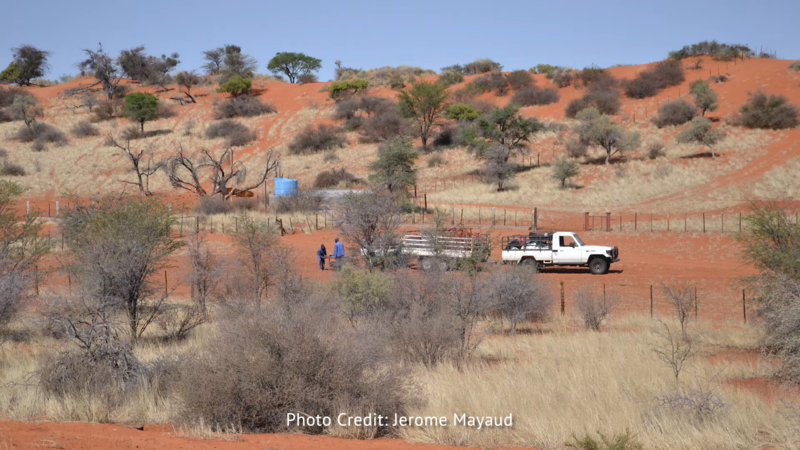
All activities must have a suitable and sufficient risk assessment which considers the location, the activities to be undertaken and individual factors (such as experience). The level of detail needs to be proportionate to the risk.
The University has a standard template for its Travel and Fieldwork Risk Assessment (see below). Departments are required to use the standard template for overseas travel. However, the template can be tailored to individual departmental risk profiles.
A local decision on whether Section 1 of the template is uploaded to the University's Travel Insurance Application and Travel Registration System (TIRS) can be made. For example, it may be unnecessary to upload Section 1 of the template onto TIRS where staff travel is assessed as low risk and elements of Section 1 are managed appropriately and proportionately via other means.
The University strongly supports the use of TIRS for registering overseas travel in all cases (even where insurance is not being applied for), so they're able to locate and contact all travellers in the event of an overseas crisis.
You can obtain further advice from the Safety Office.
The Travel Insurance Team provide a Travel Insurance Training Presentation at Travel Insurance | Finance Division (ox.ac.uk) .
Please note: The Travel and Fieldwork Risk Assessment template has been updated (February 2024)
If you would like to see what changes have been made, please contact the Safety Office
Travel and Fieldwork Risk Assessment template
International travel approval framework for high risk travel.
Heads of department must approve any international travel on University business to countries or regions that the Foreign Commonwealth and Development Office (FCDO) advises against travel to. The Safety Office must also review risk assessments for travel to locations where the FCDO advises against.
It's also good practice for heads of department to approve other high-risk travel, which may put the researcher at significant risk due to the topic area or activity. This could include working on a controversial subject in a politically sensitive or autocratic context, empirical research that delves into criminality or conflict, working in extreme terrains or with highly infectious/dangerous material.
For other travel, the head of department can delegate approval, such as to academic supervisors in the case of students.

Overseas travel
Heads of department maintain a responsibility for the health and safety of their staff and students when they travel overseas for University business. The Overseas Travel policy statement sets out the arrangements for the safe management of overseas travel, including:
- risks involved in overseas work
- risk assessment
- FCO Travel Advice
- contingency planning
- health matters
Staff and students often undertake fieldwork in the UK and overseas. Fieldwork is any practical work carried out away from the University premises for the purposes of University-related research and/or teaching. Heads of department maintain a responsibility for the health and safety of their staff and students on fieldwork. The Safety in Fieldwork policy statement sets out the arrangements for the safe management of fieldwork.
Where fieldwork is undertaken overseas, you should also refer to the University policy statement on overseas travel .
Student placements
Some undergraduate courses include periods where the student works in third party host institutions away from the University. Heads of department are responsible for ensuring these placements do not expose students to significant risks to their health and safety. The Student Placements policy statement outlines the arrangements which need to be put in place. Anyone organising student placements should be familiar with this policy. It specifically covers:
- sector guidance
- the legal framework
- risk management approach
- roles and responsibilities
- what factors to include in risk assessments
- placement approval and review
- pre-placement visits
- raising and resolving problems
- planning for contingencies
- preparation of students
- training of staff

The Safety Office provides a range of online and face-to-face training courses for traveller s , supervisors and administrators .
For those looking to embark on overseas travel, a classroom session , which incorporates practical scenarios and case studies involving remote and urban locations, will provide a multitude of practical tips and resources. Equally, a pre-recorded online training presentation gives an overview of the fieldwork and overseas travel risk assessment. First aid skills, in contexts with limited paramedic support including remote and challenging environments, can be acquired through an all-day course .
Alongside a core module, supervisors have three optional E-learning modules to supplement their existing academic expertise and ensure they are fully equipped with the necessary skills. These hone in on working with human participants, outdoor/environmental fieldwork and leading student groups.
Meanwhile, a pre-recorded online training presentation looks at fieldwork and overseas travel risk assessment administration.
There may also be training available locally by your department or division. Social Sciences run termly fieldwork safety courses and workshops coping with vicarious trauma.
Book onto a training course
Further resources
The Social Sciences Division have some excellent resources and links to useful information on travel and fieldwork. You can also find a page full of written case studies and videos documenting researchers' individual fieldwork experiences .
Security expert Kelsey Hoppe, CEO of Safer Edge, aimed to address fears and anxieties about travel in her TED talk, Where is Safe? . Kelsey questioned the common belief that safe is a place, while helping people understand the concepts of risk, safety and security and how they can analyse and manage it themselves.
You can obtain travel health advice, including vaccinations and prophylaxis for eligible groups, via the Occupational Health website .
Some other useful links are:
- Stay safe on the move | Information Security Team
- Trusted Research - Countries and Conferences | National Protective Security Authority
- UCEA Health and Safety Guidance for the placement of Higher Education students
- Travelling for work | Staff Gateway
- Central University Research Ethics Committee | Governance and Planning
- Anti-money Laundering and Sanctions Guidance | Finance Division
Related Content
- Travel Insurance
- Memo S7/21 Overseas Travel
- Occupational Health
- Foreign travel advice
Travel Claims and Emergency Contact
The traveller shall take all reasonable steps to avoid or minimise any loss or damage and to recover any property which has been lost or stolen. all claims are subject to a policy excess.
- If emergency assistance is required, contact the Emergency Assistance Provider on 0044 207 173 7797 (for callers outside the UK) or 0207 173 7797 (for callers within the UK), You will be asked to provide your policy number which can be found in the summary of cover. The document lists the full services available, the cost of which may have to be borne by the traveller.
- Please note that the Emergency Assistance Provider must be contacted in the event that emergency repatriation is required .
- All incidents should be notified to your Departmental Administrator and the Insurance Office as soon as possible. Notification to the Insurance Office must be made within 28 days of the incident even if you have not returned to the UK within that time.
- It is a policy condition that you report any loss, theft or crime to the police or relevant security personnel immediately and obtain a written and signed report.
2. SUBMIT DOCUMENTATION
Notification of a claim to Insurance Office is required within 28 calendar days of the incident date - Failure to comply will result in your claim being refused.
To make a claim:
- Please see the adjacent list - Documents - Claim Forms.
- Please return the completed and signed form to the Insurance Office as soon as possible following notification .
All evidence in support of your claim is to be received by the Insurance Office for processing within 4 calendar months of the incident date including (where applicable) but not limited to:
Refunds for travel/accommodation costs where journeys are cancelled/curtailed
Evidence of expenses incurred
Original purchase receipts where lost/damaged items are being claimed
Police Report/ Lost property report
In the event of a medical claim where you wish to keep the medical information confidential from the Insurance Office, arrangements can be made for you to submit your claim direct to the Insurer. Please contact the Insurance Office who will provide you with a reference number which will enable you to submit the claim directly.
Travel insurance claims will be paid in accordance with the University Expenses Principles and therefore the University’s Expenses Policy should be followed when arranging travel: https://finance.admin.ox.ac.uk/expenses - although please note that the insurance claim should not be confused with any other standard expense claim for the trip.
3. SETTLEMENT OF CLAIM
- Where the settlement is to be made to the individual, payment will be made to the claimant's nominated bank account by BACS (account details to be entered on the claim form).
- Where settlement is to be made to the department, please provide the departments full journal code so the reimbursement can be sent to the department. Please liaise with your Departmental Administrator for this information.
- Settlement will be made net of the standard policy excess of £50 (per person) or £100 (per person when travelling for more than 364 days).
Claim Forms:
- Cancellation Claim Form (PDF)
- Medical Expenses Claim Form (PDF)
- Personal Effects Claim Form (PDF)
- Emergency contact and information sheet (PDF)
For trips commencing prior to 1st August 2023
Confirmation and Summary of Cover 2022-23 (PDF)
For trips commencing on or after 1st August 2023
Summary of Cover 2023-24 (PDF)
Oxford Mutual Ltd Finance Division, University of Oxford 23-38 Hythe Bridge Street, Oxford, OX1 2ET
Nomadic Matt's Travel Site
Travel Better, Cheaper, Longer
Oxford Travel Guide
Last Updated: September 1, 2023
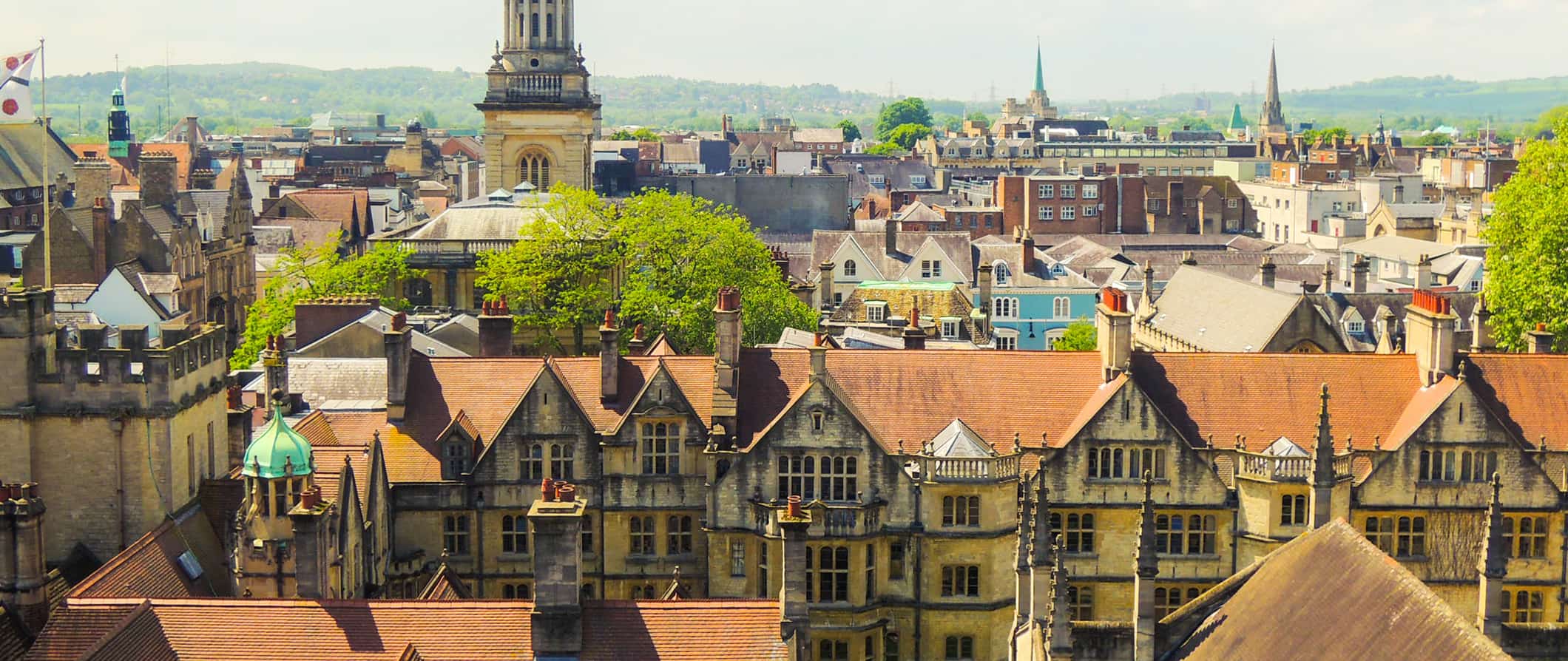
Oxford is a charming, historic city located just a short ride from London . The city is famed for its prestigious university, which is one of the oldest in the world (it was founded in the 11th century).
Oxford first earned fame in the Middle Ages as a hub for theological learning. It then expanded into medicine and law. Today, the university is home to over 24,000 students and you can study with the best and brightest in pretty much any field here.
While the city can feel stuffy and lacks the cut-loose university town feel that cities like Bristol have, visiting Oxford and seeing the old architecture more than makes up for it.
This Oxford travel guide can help you plan your trip, save money, and ensure you have an amazing visit to the historic city!
Table of Contents
- Things to See and Do
- Typical Costs
- Suggested Budget
- Money-Saving Tips
- Where to Stay
- How to Get Around
- How to Stay Safe
- Best Places to Book Your Trip
- Related Blogs on Oxford
Top 5 Things to See and Do in Oxford
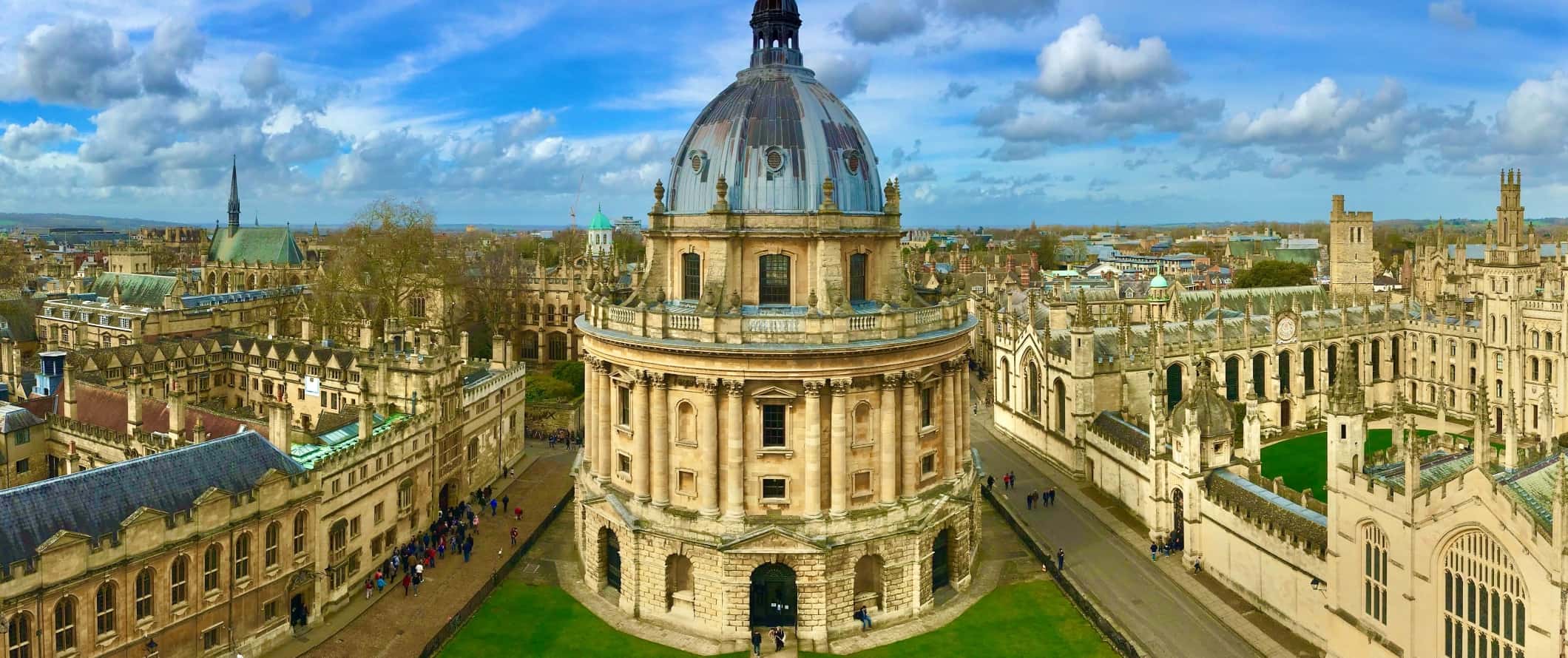
1. Tour Oxford
The University is the main attraction here. 24,000 students study at the famed college and on a visit to Oxford, you can tour fascinating museums, botanical gardens, and relax in the many pristine green spaces around campus. Bodleian Libraries offers guided tours of the university, including the inside of many historic buildings, which have been featured in countless movies over the years (including Harry Potter). They provide a look at university life, the history of the school, the architecture, and more. Tours last a couple of hours and cost 20 GBP.
2. Visit Balliol College
Founded in 1263 by wealthy landowner John I de Balliol, Balliol College is one of the oldest colleges in the University of Oxford. After Balliol’s death, his widow Dervorguilla continued to fund the founding of the college. This college was one of the first to create academic opportunities for women after only admitting men for 700 years and now the walls inside are lined with portraits of female graduates. Four Prime Ministers are alumni of Balliol college, as well as influential philosophers like Adam Smith and Aldous Huxley. It’s a prestigious college within Oxford and has a student body of about 400 who study Biology, English, History, Law, and more.
3. Admire South Park
Located in east Oxford, South Park is the largest park in Oxford, with free admission and a sweeping view of the city, including the university skyline. The land was privately owned until 1932 when the Oxford Preservation Trust acquired it and transformed it into a public park. The park is a favorite spot for photographers and from the highest point you’ll be able to see the towers of Oxford College. Within the park, you’ll find a 19th-century bridge and the Oxford Artisan Distillery. On a nice day, the park is filled with locals getting a tan, playing sports, and lounging. There are also a variety of events held there throughout the year including parades, firework displays, food festivals, and concerts.
4. Stroll under Hertford Bridge
This bridge is known as the ‘Bridge of Sighs’ because college students sigh under it on their way to take exams, and because it resembles the Bridge of Sighs in Venice. Hertford Bridge has an iconic design and connects the Old and New Quadrangles of Hertford College. It was completed in 1914 and serves as a convenient link between the two buildings. Visit the nearby Turf Tavern and commiserate with the students over a pint. You’ll be drinking in good company — Elizabeth Taylor, Stephen Hawking, and Margaret Thatcher have all paid a visit to Turf Tavern over the years.
5. Visit the Ashmolean Museum
Founded in 1683, this is Britain’s oldest public museum with a focus on art and archeology. It was originally constructed to house a “cabinet of curiosities” that Elias Ashmole donated to the University of Oxford in 1677. Ashmole’s collection was combined with older university treasures that supposedly included Guy Fawkes’ lantern and Jacob’s Coat of Many Colors. It recently went through a renovation in 2009 and displays Ancient Egyptian art, as well as an impressive Eastern Art collection. Today the museum is also working to preserve history, while simultaneously decolonizing the language and practices surrounding certain exhibits. Make sure to see the Amarna Princess Fresco and the Alfred Jewel before you leave. Admission is free.
Other Things to See and Do in Oxford
1. take a free walking tour.
One of the first things I do in a new city is take a free walking tour. It’s the best way to get the lay of the land and connect with a local guide. Footprints Tours are run by students and offer a solid introduction to the city. Just be sure to tip your guide at the end!
2. Admire the University of Oxford Botanical Gardens
When it opened in 1621, the botanical gardens here were the first of their kind in the UK. Today, the collection includes traditional English landscape designs and some of the UK’s oldest redwood trees. There are over 5,000 plant species here spread out over 4.5 acres. Admission is 6.30 GBP and pre-booking is highly recommended to guarantee entry.
3. Shop for snacks at the Covered Market
This historic 250-year-old market has dozens of coffee bars, restaurants, traditional butchers, fish merchants, and independent shops. You’ll be able to find everything from artisanal sausage to sushi. There are a lot of homemade meals served here and it’s the best place to do some cheap shopping for groceries in the city. In addition to food, there are also lots of local vendors selling handmade wares, including clothing, souvenirs, and jewelry.
4. Browse the Bodleian Library
As the main research library of the University of Oxford, the Bodleian is one of the oldest libraries in Europe and the second-largest library in the UK (after London’s British Library). Opened in 1602, its English Gothic architecture is gorgeous — so much so that it has served as a set for numerous films, including the first two Harry Potter films (its Divinity School, with its fan-vaulted ceiling and ornate decoration, was used as the Hogwarts hospital wing.) Entry is free and tours start at 9 GBP.
5. Go punting
Punting is a quirky and unique summer activity in Oxford. It’s essentially pushing a small boat around the River Thames or the River Cherwell with a pole. Punting season takes place from mid-March to mid-October when you can rent a boat or hire someone to take you. Rentals cost 30 GBP per hour and can fit up to 5 people.
6. Visit the Museum of Natural History
Established in 1850, this museum holds the University’s scientific collections of zoological, entomological, geological, paleontological, and mineralogical specimens. The exhibits are devoted to the history and diversity of life on Earth. One of their most famous exhibits is the Oxford Dodo. It has the only surviving dodo soft tissue remains in the world as well as a dodo skull (the dodo is an extinct flightless bird that was endemic to Mauritius). Admission is free.
7. Learn about medieval life at Oxford Castle Prison
Originally built in the 11th century, visiting this Norman castle prison (which was in operation until 1996) is like stepping back in time. You can descend into a 900-year-old crypt and then climb to the top of Saxon St George’s Tower for a 360-degree panoramic view of the surrounding area. You’ll also learn about the past residents of the prison and hear stories of their crimes, which range from murder to tyranny to religious rebellion. Admission is by guided tour only and costs 15.25 GBP.
8. Get lost in Blackwell’s Books
For the bookworm, this historic shop is a must. Opened in 1879, it’s home to the Norrington Room, which holds the Guinness Record for the largest bookselling room in the world. Named after Sir Arthur Norrington, a former president of Trinity College, the 10,000-square-foot (929-square-meter) basement is just one of Blackwell’s four floors of books.
9. Take a day trip to Blenheim Palace
This underrated attraction is just 8 miles (12 kilometers) outside of Oxford. Built in the early 18th century, it is the seat of the Dukes of Marlborough and a UNESCO World Heritage Site. Aside from the amazing Baroque architecture, the rooms are preserved with their original furniture and the grounds include a beautiful garden and a butterfly house. The entire palace is filled with statues, tapestries, priceless furniture and fine china, and huge oil paintings. Highlights include the room in which Winston Churchill was born and the Blenheim Tapestries, which are 10 large tapestries that commemorate the first duke’s conquests. Fun fact: this 17th-century palace is the only non-royal house in the UK that’s still allowed to be referred to as a palace. Admission to the palace, park, and gardens is 35.00 GBP.
10. Have a pint at the student pubs
A lot of Oxford’s energy comes from the huge student population. Around Oxford, you’ll find everything from small, quirky dive bars to romantic cocktail bars. The Eagle and Child pub on St Giles’ street is one of the most famous of Oxford’s pubs. The pub was a popular meeting spot for literary heavyweights like J.R.R. Tolkien and C.S. Lewis.
For more information on other cities in England, check out these guides:
- Bath Travel Guide
- Brighton Travel Guide
- Bristol Travel Guide
- Cambridge Travel Guide
- Liverpool Travel Guide
- London Travel Guide
- Manchester Travel Guide
Oxford Travel Costs
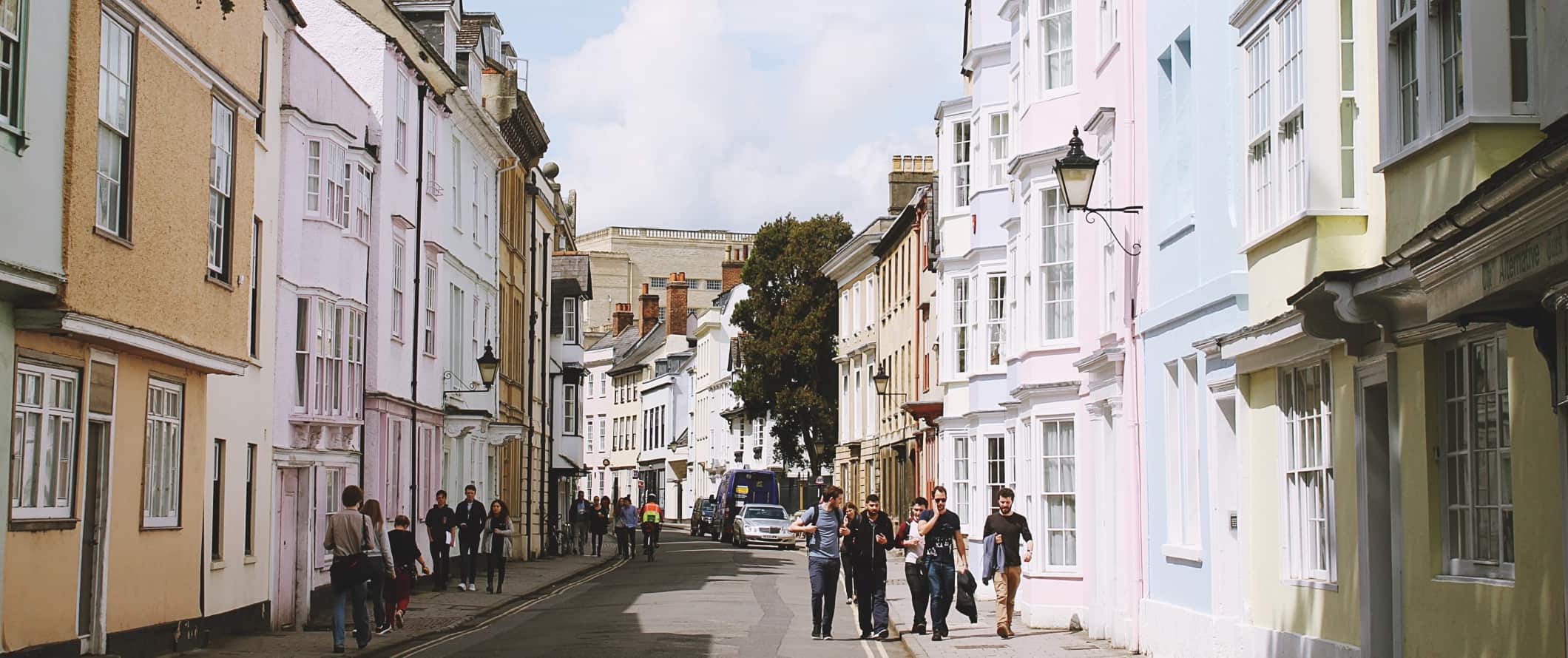
Hostel prices – There is currently just one hostel in Oxford and a bed in a dorm with 8 beds costs 35-40 GBP. Free Wi-Fi and self-catering facilities are included.
For those traveling with a tent, camping is available outside the city for 14 GBP per night. This gets you a basic tent plot without electricity.
Budget hotel prices – Budget hotels that include free Wi-Fi and breakfast start at around 80 GBP per night.
There are lots of Airbnb options available in Oxford. A private room costs at least 25-35 GBP per night, while an entire home/apartment starts around 60-90 GBP per night.
Avoid visiting during alumni weekend (which takes place in September) and the annual Oxford Boat Race, which draws 250,000 visitors around Easter. The city fills up fast and prices rise!
Food – While British cuisine has evolved in leaps and bounds due to immigration (and colonialism), it’s still very much a meat and potatoes country. Fish and chips remain a popular staple for both lunch and dinner while roasted and stewed meats, sausages, meat pies, and the quintessential Yorkshire pudding are all common options as well. Curry (and other Indian dishes, such as tikka masala), are super popular here too.
You can eat cheaply in Oxford if you stick to the cafes centered close to the university. Most give discounts to students, and whether you pick up a sandwich, salad, or bagel, you won’t pay more than 9 GBP for a meal (even if you aren’t a student).
You’ll find most student restaurants on and around George Street with small takeaway windows and stands selling everything from falafel to burritos. Fast food (think McDonald’s) costs around 7 GBP for a combo meal while a pint at a pub costs around 5 GBP.
A personal pizza can cost as little as 5.55 GBP while Chinese food costs around 8 GBP for a meal.
Expect to pay 12 GBP for a meal at an inexpensive casual restaurant, while a three-course meal at a mid-range restaurant costs 25 GBP per person, including a drink.
If you’re cooking your own food, a week’s worth of groceries costs around 40-60 GBP. The best places to buy cheap groceries are Lidl, Aldi, and Sainsbury’s.
Backpacking Oxford Suggested Budgets
If you’re backpacking Oxford, expect to spend about 70 GBP per day. This budget covers a hostel dorm, public transit, limiting your drinking, cooking your own meals, and doing mostly free attractions like hanging out in the parks and exploring Oxford University. If you plan on drinking, add 5-10 GBP per day to your budget.
A mid-range budget of 140 GBP per day covers staying in a private Airbnb room or private hostel room, eating out for most of your meals, taking the occasional taxi, enjoying a few drinks, and doing some paid activities like a guided tour of Oxford or going punting.
On a “luxury” budget of about 240 GBP or more per day, you can stay in a hotel, eat out anywhere you want, drink more, rent a car or bike to explore, and do as many tours and activities as you want. This is just the ground floor for luxury though. The sky is the limit!
You can use the chart below to get some idea of how much you need to budget daily, depending on your travel style. Keep in mind these are daily averages – some days you’ll spend more, some days you’ll spend less (you might spend less every day). We just want to give you a general idea of how to make your budget. Prices are in GBP.
Oxford Travel Guide: Money-Saving Tips
As one of the UK’s biggest university towns, Oxford has many free and low-cost things to do. With plenty of cheap pubs, student-focused restaurants, and lots of public spaces, cutting your costs and saving money is easy here. Here are my top ways to save money when you visit Oxford:
- Take a free walking tour – One of the best ways to learn about Oxford is with a free walking tour. Footprints Tours runs free walking tours that can introduce you to the city. Just be sure to tip your guide!
- Cook your own food – Like elsewhere in the UK, eating out in Oxford will destroy your budget. Cook as much as you can to save money.
- Eat cheap food – If you do plan on eating out, head out to neighborhoods outside the city center, where most of the students live. Stick to fast food and take-out joints for the cheapest options.
- Bike or walk everywhere – Oxford is not a large city so you can pretty much walk or bike everywhere. Skip the taxis and public transportation if you can.
- See the student theater – You can see cheap and cutting-edge student theater for a couple of pounds at the Burton Taylor Studio (near the bus station). It’s a small theater, but because it hosts student and independent productions, you can find a good deal on the ticket prices — even for last-minute tickets.
- Stay in an Oxford University dorm – When classes aren’t in session, it’s possible to stay in a dorm on the university campus. Exeter College is located in the center of the city and offers bed-and-breakfast-style accommodation in the dormitory. Rooms are only available during the Easter, summer, and winter vacations. (Not currently available due to COVID).
- Stay with a local – If you’re on a budget you’ll definitely want to try Couchsurfing . It’s a great way to cut costs while connecting to the local scene. Many students are away in the summer, however, so be sure to apply early.
- Bring a water bottle – The tap water here is safe to drink so bring a reusable water bottle to save money and reduce your plastic use. LifeStraw is my go-to brand as their bottles have built-in filters to ensure your water is always clean and safe.
Where to Stay in Oxford
Oxford currently has just one operational hostel. Fortunately, it’s a good one!
- Central Backpackers
How to Get Around Oxford
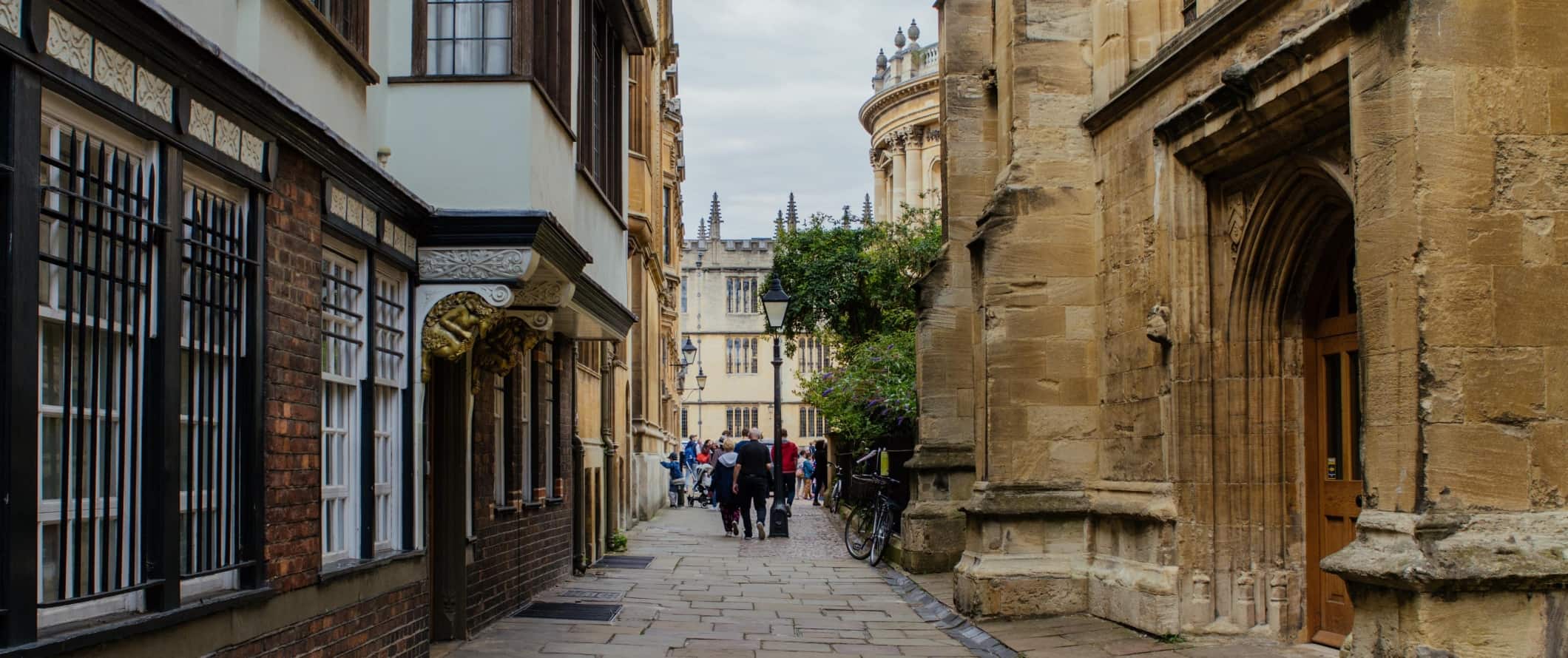
The easiest way to get around Oxford, especially if you stick to the central tourist areas, is by walking. Oxford is compact enough to get around on foot.
Bus – There is an extensive bus network through Oxford to get around if you choose to take public transportation. Three separate bus companies operate public transport in Oxford, with single trip fares as low as 1.20 GBP and day passes costing around 3.90 GBP.
Bicycle – Oxford is very bike-friendly if you stick to the bike paths. Pony Bikes and Donkey Bikes are dockless bike companies operating in Oxford, meaning the bikes can be picked up and left anywhere on the sidewalk. Download and rent directly from their respective apps.
If you’d rather pay for a full day of access, you can rent a bike from Summertown Cycles for as little as 18 GBP for your first day (6 GBP for each following day). Brompton Bike Hire offers folding bikes for 5 GBP per day, which you can pick up from the self-serve bike locker next to Oxford Station.
Taxi – Taxis cost around 4.60 GBP to start and 2.40 GBP per mile, but the price depends on the time of day and traffic. You can also use an app like MyTaxi to order your ride. Given how expensive they are, I wouldn’t take one unless absolutely necessary.
Uber – Uber is available in Oxford, but again, walking or cycling are the easiest way to get around in the compact city so I’d skip them if you can.
Car rental – Car rentals can be found for as little as 25 GBP per day for a multi-day rental. Keep in mind you’ll be driving on the left and that most cars have a manual transmission. Drivers need to be at least 21 and have had their license for at least one year.
When to Go to Oxford
Summer (July-August) is peak tourism season in Oxford, and temperatures are the warmest during this time — but rarely do they go above 22°C (72°F). It’s perfect weather for exploring, punting, and relaxing in the many parks.
Spring (May-June) and autumn (September-October) are also fantastic times to visit as the city is abuzz with student life and temperatures are mild. This is my favorite time to visit.
Winter lasts from December through February, and tourism crowds thin out dramatically during this time. Temperatures can dip below freezing, and prices are slightly lower. The days are cold and grey, however, so I wouldn’t suggest visiting during this time if you can avoid it.
How to Stay Safe in Oxford
Oxford is safe and the risk of violent crime is low. The biggest risk here is petty theft and pickpocketing, especially in the busy student pubs and clubs (however, it’s still quite rare).
Solo travelers, including female travelers, should generally feel safe here, however, the standard precautions apply (never leave your drink unattended at the bar, never walk home alone intoxicated, etc.).
If you’re partying in the student pubs, be aware of your surroundings and avoid dimly lit alleys and pathways when heading home. Pickpockets tend to work in teams, so stay alert and keep your valuables tucked away.
Scams here are rare, but if you’re worried about getting ripped off you can read about common travel scams to avoid here.
If you experience an emergency, dial 999 for assistance.
The most important piece of advice I can offer is to purchase good travel insurance. Travel insurance will protect you against illness, injury, theft, and cancellations. It’s comprehensive protection in case anything goes wrong. I never go on a trip without it as I’ve had to use it many times in the past. You can use the widget below to find the policy right for you:
Oxford Travel Guide: The Best Booking Resources
These are my favorite companies to use when I travel. They consistently have the best deals, offer world-class customer service and great value, and overall, are better than their competitors. They are the companies I use the most and are always the starting point in my search for travel deals.
- Skyscanner – Skyscanner is my favorite flight search engine. They search small websites and budget airlines that larger search sites tend to miss. They are hands down the number one place to start.
- Hostelworld – This is the best hostel accommodation site out there with the largest inventory, best search interface, and widest availability.
- Booking.com – The best all around booking site that constantly provides the cheapest and lowest rates. They have the widest selection of budget accommodation. In all my tests, they’ve always had the cheapest rates out of all the booking websites.
- HostelPass – This new card gives you up to 20% off hostels throughout Europe. It’s a great way to save money. They’re constantly adding new hostels too. I’ve always wanted something like this and glad it finallt exists.
- Get Your Guide – Get Your Guide is a huge online marketplace for tours and excursions. They have tons of tour options available in cities all around the world, including everything from cooking classes, walking tours, street art lessons, and more!
- The Man in Seat 61 – This website is the ultimate guide to train travel anywhere in the world. They have the most comprehensive information on routes, times, prices, and train conditions. If you are planning a long train journey or some epic train trip, consult this site.
- Rome2Rio – This website allows you to see how to get from point A to point B the best and cheapest way possible. It will give you all the bus, train, plane, or boat routes that can get you there as well as how much they cost.
- FlixBus – Flixbus has routes between 20 European countries with prices starting as low 5 EUR! Their buses include WiFi, electrical outlets, a free checked bag.
- SafetyWing – Safety Wing offers convenient and affordable plans tailored to digital nomads and long-term travelers. They have cheap monthly plans, great customer service, and an easy-to-use claims process that makes it perfect for those on the road.
- LifeStraw – My go-to company for reusable water bottles with built-in filters so you can ensure your drinking water is always clean and safe.
- Unbound Merino – They make lightweight, durable, easy-to-clean travel clothing.
- Top Travel Credit Cards – Points are the best way to cut down travel expenses. Here’s my favorite point earning credit cards so you can get free travel!
- BlaBlaCar – BlaBlaCar is a ridesharing website that lets you share rides with vetted local drivers by pitching in for gas. You simply request a seat, they approve, and off you go! It’s a cheaper and more interesting way to travel than by bus or train!
Oxford Travel Guide: Related Articles
Want more info? Check out all the articles I’ve written on backpacking/traveling England and continue planning your trip:

The 14 Best Things to Do in Bristol
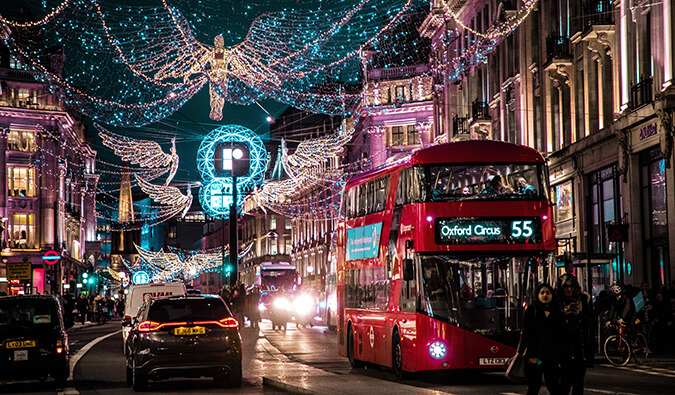
Where to Stay in London: The Best Neighborhoods for Your Visit
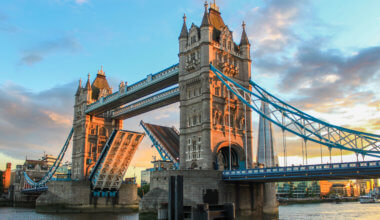
The 8 Best Hostels in London
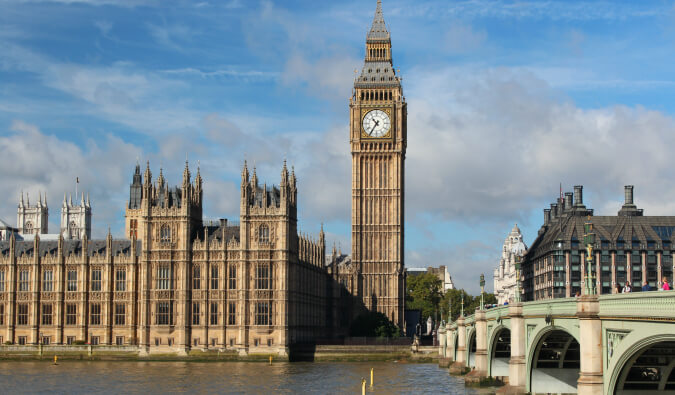
How to Spend a Week in London
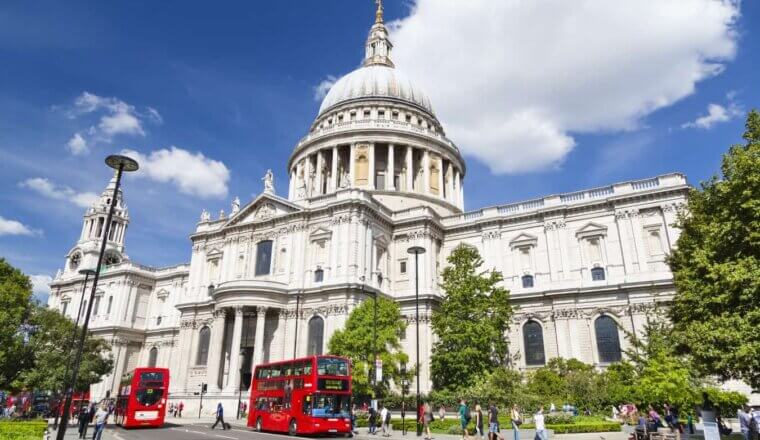
The 9 Best Walking Tour Companies in London
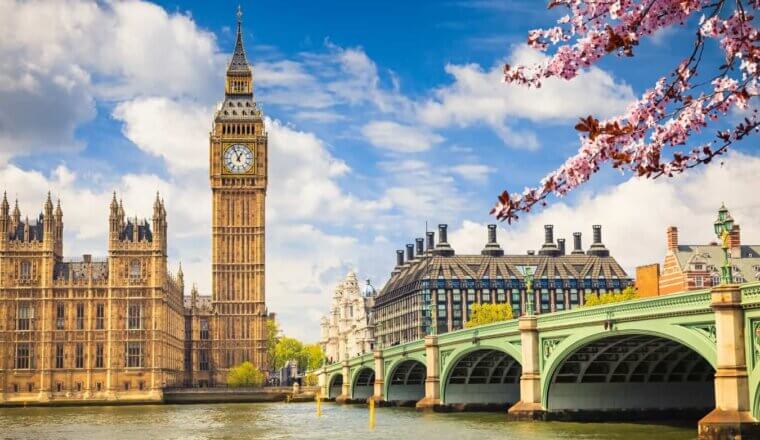
70+ Free Things to Do in London
Get my best stuff sent straight to you, pin it on pinterest.
- Where To Stay
- Transportation
- Booking Resources
- Related Blogs
Cookies on this website
We use cookies to ensure that we give you the best experience on our website. If you click 'Accept all cookies' we'll assume that you are happy to receive all cookies and you won't see this message again. If you click 'Reject all non-essential cookies' only necessary cookies providing core functionality such as security, network management, and accessibility will be enabled. Click 'Find out more' for information on how to change your cookie settings.

- Staff pages
Everything you ever wanted to know about the Universitys travel policy, but were too afraid to ask.
new Travel policy
As of August 1st 2022 The University travel policy has been updated with the intention that the new guidance aims to reduce the environmental impact of travel whilst on University business.
To this end:
- Domestic flights
- Flights to Paris and Brussels
- First class flights
are NOT PERMITTED .
To reduce flights, unless exceptions or reasonable adjustments are applicable,
- Rail should be used for all domestic journeys under 7 hours. Exceptions include flights to Northern Ireland, the Shetland Islands or the Outer Hebrides. Flights are also permitted to the Channel Islands and the Isle of Man.
- Eurostar should be used for all journeys to Paris and Brussels
- First class flights are not permitted
- Premium economy and business class flights require pre-approval by departments, with evidence retained.
Exceptions to these restrictions will only be made as a reasonable adjustment to account for disability or another protected characteristic, in emergencies or where abiding by them is impractical or unsafe.
All travel should be minimised and made as sustainably as reasonably possible. The department will incur a flight levy charge for all flights paid for, or reimbursed by, the University which will fund the University's Environmental sustainability strategy.
before travelling
If you are considering travelling for work or need to undertake travel on University business please see the University's "travelling for work" page for guidance and advice on a wide variety of useful topics.
travel cost
Travel costs should offer value for money. Value for money is the optimum balance between cost, quality, risk and environmental sustainability.
In order to meet a reduction in flights and carbon emissions from travel, it is permissible to spend more when:
- Travelling by rail for domestic journeys
- Travelling by Eurostar to Paris and Brussels
making travel bookings
The University's preferred supplier for travel bookings is Key Travel. Payment is made by the University, via invoice.
Key travel should always be used for:
- UK rail journeys
- Hotels and accommodation
- International flights
why do we use key travel?
- Access to academic fares, not publicly available, average 30% saving
- Price match promise on air fares
Convenience
- No requirement for personal payment and reimbursement
- Online booking facility for direct bookings
- Offline booking facility using a travel agent for complex bookings
- Travellers can capture loyalty scheme points
- Single point of contact for any/all necessary changes and refunds
- 24 hour emergency support
Sustainability
- Greenest search option available
- Comprehensive carbon emissions reporting
HOW DO I book?
1. Contact Key Travel directly to request a quote:
Tel: 0161 819 9763 Email: [email protected]
Once a quote has been obtained and you wish to make a booking please forward your quote details, including quote number, to [email protected] to obtain a purchase order to secure the booking. Alternatively, if you or a member of your team have access to Oracle iProcurement, you should create a requisition on R12 for finance approval.
2. Book via the online booking portal:
Bookings can be held for a period of days when reserved via the booking portal. A purchase order is still required in all cases; please submit a requisition via Oracle iProcurement. if you have R12 access or forward your booking details to [email protected] .
If you do not have access to the online booking portal, please email [email protected] requesting access.
Please see the main university guidance here (SSO required).
KEY TRAVEL CONTACTS
24/7 Emergency Support (general number) +44 (0) 207 843 9602
Online support, Emergency Out of Hours and to book by telephone: 0161 8199763
For queries relating to online bookings and the online portal [email protected]
For groups, meetings, conferences, and event bookings or enquiries [email protected]
Visa enquiries [email protected]
UNIVERSITY TRAVEL INSURANCE
The University provides travel insurance for University employees, students and volunteers travelling within the UK or worldwide on University business. Cover is not automatic – you have to arrange insurance each time you travel. Further information on insurance, including eligibility for University insurance, is available here . Cover and exclusions are set out here .
HOW DO I APPLY?
Visit this page (Single Sign On (SSO) required) to submit your travel insurance application. Once submitted, your application will be automatically routed to the department for authorisation.
Even if you do not wish to apply for University travel insurance, the system can be used to register travel details so that in the event of any crisis the University can provide support.
HINTS AND TIPS
- You will land on a ‘get started’ page : for ‘trip title’, write the purpose of the trip (conference, fieldwork, visit to archives, etc). Complete the other fields on this page, and hit ‘create’.
- You will be faced with a series of tabs. Please work your way through the self-explanatory fields on these tabs.
- Under the ‘Trip’ tab , there is a field entitled ‘How is trip funded’. Please provide the cost centre or project code here.
- Also under the ‘trip’ tab , you will be asked about a risk assessment. For overseas travel and fieldwork please complete and attach a risk assessment .
Training on the system is not mandatory but is encouraged. Please visit this link to access online training (SSO required – click ‘CoSy’, ‘Course search’ and search ‘Travel insurance’).
Accommodation
Standard rates.
In the UK, the University considers reasonable rates for overnight accommodation to be:
- up to £150 per night in major cities; or
- up to £100 per night elsewhere.
The University uses HMRC's published benchmark rates as 'reasonable rates' guidance for overseas accommodation. Expense claims that exceed these values may be queried and could be rejected if costs are considered to be unreasonable.
The University does not pay an allowance per day for overnight accommodation. Only actual and evidenced costs may be claimed and in all cases, receipts or evidence must be provided.
Guidelines for use of AirBnB
The University does not recommend the use of Airbnb. However, at departmental discretion, the University will reimburse the cost of Airbnb accommodation for overnight stays. The risks relating to Airbnb accommodation should be assessed in the usual way. All Airbnb accommodation should be appropriate in size for the number of guests. Overnight accommodation guidance rates also apply for all Airbnb bookings. The cost of an apartment or house for one individual is not value for money and should not be accepted.
CONTACTS IN PRIMARY CARE
As with all queries relating to finance matters, please contact [email protected] in the first instance
Travel Policy
This policy has been developed as part of the wider environmental sustainability strategy and applies to all business travel from 1 august 2022..
While the University recognises that some travel is necessary for learning, teaching, and research, this policy aims to reduce the environmental impact of travel. The policy was developed after extensive consultation and a pilot rollout in five departments.
It includes
- encouraging virtual alternatives to travel
- encouraging a shift from flights to rail
- eliminating 20% of flights by 2024/25
- charging a flight levy on University business travel
Money raised through the flight levy is allocated to the Oxford Sustainability Fund to finance the implementation of the Environmental Sustainability Strategy. We will use offsetting from 2034 onwards to offset the University’s residual carbon emissions and biodiversity impact and achieve the strategy’s 2035 targets. This approach of prioritising reducing emissions to minimise offsetting is in line with the Oxford Offsetting Principles .
Below you will find a summary of the policy. The full policy can be downloaded from this page.
Review our policy
DOWNLOAD PDF
Sustainable Travel team
+44 (0)1865 6 14814
Related links
- Environmental Sustainability Strategy
- Travelling for work

- Auto Insurance Best Car Insurance Cheapest Car Insurance Compare Car Insurance Quotes Best Car Insurance For Young Drivers Best Auto & Home Bundles Cheapest Cars To Insure
- Home Insurance Best Home Insurance Best Renters Insurance Cheapest Homeowners Insurance Types Of Homeowners Insurance
- Life Insurance Best Life Insurance Best Term Life Insurance Best Senior Life Insurance Best Whole Life Insurance Best No Exam Life Insurance
- Pet Insurance Best Pet Insurance Cheap Pet Insurance Pet Insurance Costs Compare Pet Insurance Quotes
- Travel Insurance Best Travel Insurance Cancel For Any Reason Travel Insurance Best Cruise Travel Insurance Best Senior Travel Insurance
- Health Insurance Best Health Insurance Plans Best Affordable Health Insurance Best Dental Insurance Best Vision Insurance Best Disability Insurance
- Credit Cards Best Credit Cards 2024 Best Balance Transfer Credit Cards Best Rewards Credit Cards Best Cash Back Credit Cards Best Travel Rewards Credit Cards Best 0% APR Credit Cards Best Business Credit Cards Best Credit Cards for Startups Best Credit Cards For Bad Credit Best Cards for Students without Credit
- Credit Card Reviews Chase Sapphire Preferred Wells Fargo Active Cash® Chase Sapphire Reserve Citi Double Cash Citi Diamond Preferred Chase Ink Business Unlimited American Express Blue Business Plus
- Credit Card by Issuer Best Chase Credit Cards Best American Express Credit Cards Best Bank of America Credit Cards Best Visa Credit Cards
- Credit Score Best Credit Monitoring Services Best Identity Theft Protection
- CDs Best CD Rates Best No Penalty CDs Best Jumbo CD Rates Best 3 Month CD Rates Best 6 Month CD Rates Best 9 Month CD Rates Best 1 Year CD Rates Best 2 Year CD Rates Best 5 Year CD Rates
- Checking Best High-Yield Checking Accounts Best Checking Accounts Best No Fee Checking Accounts Best Teen Checking Accounts Best Student Checking Accounts Best Joint Checking Accounts Best Business Checking Accounts Best Free Checking Accounts
- Savings Best High-Yield Savings Accounts Best Free No-Fee Savings Accounts Simple Savings Calculator Monthly Budget Calculator: 50/30/20
- Mortgages Best Mortgage Lenders Best Online Mortgage Lenders Current Mortgage Rates Best HELOC Rates Best Mortgage Refinance Lenders Best Home Equity Loan Lenders Best VA Mortgage Lenders Mortgage Refinance Rates Mortgage Interest Rate Forecast
- Personal Loans Best Personal Loans Best Debt Consolidation Loans Best Emergency Loans Best Home Improvement Loans Best Bad Credit Loans Best Installment Loans For Bad Credit Best Personal Loans For Fair Credit Best Low Interest Personal Loans
- Student Loans Best Student Loans Best Student Loan Refinance Best Student Loans for Bad or No Credit Best Low-Interest Student Loans
- Business Loans Best Business Loans Best Business Lines of Credit Apply For A Business Loan Business Loan vs. Business Line Of Credit What Is An SBA Loan?
- Investing Best Online Brokers Top 10 Cryptocurrencies Best Low-Risk Investments Best Cheap Stocks To Buy Now Best S&P 500 Index Funds Best Stocks For Beginners How To Make Money From Investing In Stocks
- Retirement Best Gold IRAs Best Investments for a Roth IRA Best Bitcoin IRAs Protecting Your 401(k) In a Recession Types of IRAs Roth vs Traditional IRA How To Open A Roth IRA
- Business Formation Best LLC Services Best Registered Agent Services How To Start An LLC How To Start A Business
- Web Design & Hosting Best Website Builders Best E-commerce Platforms Best Domain Registrar
- HR & Payroll Best Payroll Software Best HR Software Best HRIS Systems Best Recruiting Software Best Applicant Tracking Systems
- Payment Processing Best Credit Card Processing Companies Best POS Systems Best Merchant Services Best Credit Card Readers How To Accept Credit Cards
- More Business Solutions Best VPNs Best VoIP Services Best Project Management Software Best CRM Software Best Accounting Software
- Manage Topics
- Investigations
- Visual Explainers
- Newsletters
- Abortion news
- Coronavirus
- Climate Change
- Vertical Storytelling
- Corrections Policy
- College Football
- High School Sports
- H.S. Sports Awards
- Sports Betting
- College Basketball (M)
- College Basketball (W)
- For The Win
- Sports Pulse
- Weekly Pulse
- Buy Tickets
- Sports Seriously
- Sports+ States
- Celebrities
- Entertainment This!
- Celebrity Deaths
- American Influencer Awards
- Women of the Century
- Problem Solved
- Personal Finance
- Small Business
- Consumer Recalls
- Video Games
- Product Reviews
- Destinations
- Airline News
- Experience America
- Today's Debate
- Suzette Hackney
- Policing the USA
- Meet the Editorial Board
- How to Submit Content
- Hidden Common Ground
- Race in America
Personal Loans
Best Personal Loans
Auto Insurance
Best Auto Insurance
Best High-Yields Savings Accounts
CREDIT CARDS
Best Credit Cards
Advertiser Disclosure
Blueprint is an independent, advertising-supported comparison service focused on helping readers make smarter decisions. We receive compensation from the companies that advertise on Blueprint which may impact how and where products appear on this site. The compensation we receive from advertisers does not influence the recommendations or advice our editorial team provides in our articles or otherwise impact any of the editorial content on Blueprint. Blueprint does not include all companies, products or offers that may be available to you within the market. A list of selected affiliate partners is available here .
Travel Insurance
Cheapest travel insurance of April 2024
Mandy Sleight

Heidi Gollub
“Verified by an expert” means that this article has been thoroughly reviewed and evaluated for accuracy.
Updated 9:52 a.m. UTC April 11, 2024
- path]:fill-[#49619B]" alt="Facebook" width="18" height="18" viewBox="0 0 18 18" fill="none" xmlns="http://www.w3.org/2000/svg">
- path]:fill-[#202020]" alt="Email" width="19" height="14" viewBox="0 0 19 14" fill="none" xmlns="http://www.w3.org/2000/svg">
Editorial Note: Blueprint may earn a commission from affiliate partner links featured here on our site. This commission does not influence our editors' opinions or evaluations. Please view our full advertiser disclosure policy .
WorldTrips is the best cheap travel insurance company of 2024 based on our in-depth analysis of the cheapest travel insurance plans. Its Atlas Journey Preferred and Atlas Journey Premier plans offer affordable travel insurance with high limits for emergency medical and evacuation benefits bundled with good coverage for trip delays, travel inconvenience and missed connections.
Cheapest travel insurance of 2024
Why trust our travel insurance experts
Our team of travel insurance experts analyzes hundreds of insurance products and thousands of data points to help you find the best travel insurance for your next trip. We use a data-driven methodology to determine each rating. Advertisers do not influence our editorial content . You can read more about our methodology below.
- 1,855 coverage details evaluated.
- 567 rates reviewed.
- 5 levels of fact-checking.
Best cheap travel insurance

Top-scoring plans
Average cost, medical limit per person, medical evacuation limit per person, why it’s the best.
WorldTrips tops our rating of the cheapest travel insurance with two plans:
- Atlas Journey Preferred is the cheaper travel insurance plan of the two, with $100,000 per person in emergency medical benefits as secondary coverage and an optional upgrade to primary coverage. It’s also our pick for the best travel insurance for cruises .
- Atlas Journey Premier costs a little more but gives you $150,000 in travel medical insurance with primary coverage . This is a good option if health insurance for international travel is a priority.
Pros and cons
- Atlas Journey Preferred is the cheapest of our 5-star travel insurance plans.
- Atlas Journey Premier offers $150,000 in primary medical coverage.
- Both plans have top-notch $1 million per person in medical evacuation coverage.
- Each plan offers travel inconvenience coverage of $750 per person.
- 12 optional upgrades, including destination wedding and rental car damage and theft.
- No non-medical evacuation coverage.
Cheap travel insurance for cruises
Travel insured.

Top-scoring plan
Travel Insured offers cheap travel insurance for cruises and its Worldwide Trip Protector plan gets 4 stars in our rating of the best cruise travel insurance .
- Worldwide Trip Protector offers $1 million in emergency evacuation coverage per person and a rare $150,000 in non-medical evacuation per person. It also has primary coverage for travel medical insurance benefits, which means you won’t have to file medical claims with your health insurance first.
- Cheap trip insurance for cruises.
- Offers a rare $150,000 for non-medical evacuation.
- $500 per person baggage delay benefit only requires a 3-hour delay.
- Optional rental car damage benefit up to $50,000.
- Missed connection benefit of $500 per person only available for cruises and tours.
Best cheap travel insurance for families

Travelex has the best cheap travel insurance for families because kids age 17 are covered by your policy for free when they’re traveling with you.
- Free coverage for children 17 and under on the same policy.
- $2,000 travel delay coverage per person ($250 per day) after 5 hours.
- Hurricane and weather coverage after a common carrier delay of any amount of time.
- Only $50,000 per person emergency medical coverage.
- Baggage delay coverage is only $200 and requires a 12-hour delay.
Best cheap travel insurance for seniors

Evacuation limit per person
Nationwide has the best cheap travel insurance for seniors — its Prime plan gets 4 stars in our best senior travel insurance rating. However, Nationwide’s Cruise Choice plan ranks higher in our best cheap travel insurance rating.
- Cruise Choice has a $500 per person benefit if a cruise itinerary change causes you to miss a prepaid excursion. It also has a missed connections benefit of $1,500 per person after only a 3-hour delay, for cruises or tours. But note that this coverage is secondary coverage to any compensation provided by a common carrier.
- Coverage for cruise itinerary changes, ship-based mechanical breakdowns and covered shipboard service disruptions.
- Non-medical evacuation benefit of $25,000 per person.
- Baggage loss benefits of $2,500 per person.
- Travel medical coverage is secondary.
- Trip cancellation benefit for losing your job requires three years of continuous employment.
- No “cancel for any reason” (CFAR) upgrade available.
- Missed connection coverage of $1,500 per person is only for tours and cruises, after a 3-hour delay.
Best cheap travel insurance for add-on options

AIG offers the best cheap travel insurance for add-on options because the Travel Guard Preferred plan allows you to customize your policy with a host of optional upgrades.
- Travel Guard Preferred upgrades include “cancel for any reason” (CFAR) coverage , rental vehicle damage coverage and bundles that offer additional benefits for adventure sports, travel inconvenience, quarantine, pets, security and weddings. There’s also a medical bundle that increases the travel medical benefit to $100,000 and emergency evacuation to $1 million.
- Bundle upgrades allow you to customize your affordable travel insurance policy.
- Emergency medical and evacuation limits can be doubled with optional upgrade.
- Base travel insurance policy has relatively low medical limits.
- $300 baggage delay benefit requires a 12-hour delay.
- Optional CFAR upgrade only reimburses up to 50% of trip cost.
Best cheap travel insurance for missed connections

TravelSafe has the best cheap travel insurance for missed connections because coverage is not limited to cruises and tours, as it is with many policies.
- Best-in-class $2,500 per person in missed connection coverage.
- $1 million per person in medical evacuation and $25,000 in non-medical evacuation coverage.
- Generous $2,500 per person baggage and personal items loss benefit.
- Most expensive of the best cheap travel insurance plans.
- No “interruption for any reason” coverage available.
- Weak baggage delay coverage of $250 per person after 12 hours.
Cheapest travel insurance comparison

How much does the cheapest travel insurance cost?
The cheapest travel insurance in our rating is $334. This is for a WorldTrips Atlas Journey Preferred travel insurance plan, based on the average of seven quotes for travelers of various ages to international destinations with a range of trip values.
Factors that determine travel insurance cost
There are several factors that determine the cost of travel insurance, including:
- Age and number of travelers being insured.
- Trip length.
- Total trip cost.
- The travel insurance plan you choose.
- The travel insurance company.
- Any add-ons, features or upgraded benefits you include in the travel insurance plan.
Expert tip: “In general, travelers can expect to pay anywhere from 4% to 10% of their total prepaid, non-refundable trip costs,” said Suzanne Morrow, CEO of InsureMyTrip.
Is buying the cheapest travel insurance a good idea?
Choosing cheaper travel insurance without paying attention to what a plan covers and excludes could leave you underinsured for your trip. Comparing travel insurance plans side-by-side can help ensure you get enough coverage to protect yourself financially in an emergency for the best price.
For example, compare these two Travelex travel insurance plans:
- Travel Basic is cheaper but it only provides up to $15,000 for emergency medical expense coverage. You’ll also have to pay extra for coverage for children.
- Travel Select will cost you a bit more but it covers up to $50,000 in medical expenses and includes coverage for kids aged 17 and younger traveling with you. It also offers upgrades such additional medical coverage, “cancel for any reason” (CFAR) coverage and an adventure sports rider that may be a good fit for your trip.
Reasons to consider paying more for travel insurance
Make sure you understand what you’re giving up if you buy the cheapest travel insurance. Here are a few reasons you may consider paying a little extra for better coverage.
- Emergency medical. The best travel medical insurance offers primary coverage for emergency medical benefits. Travel insurance with primary coverage can cost more than secondary coverage but will save you from having to file a claim with your health insurance company before filing a travel insurance claim.
- Emergency evacuation. If you’re traveling to a remote location or planning a boat excursion on your trip, look at travel insurance with a high medical evacuation insurance limit. If you are injured while traveling, transportation to the nearest adequate medical facility could cost in the tens to hundreds of thousands. It may make sense to pay more for travel insurance with robust emergency evacuation coverage.
- Flexibility. To maximize your trip flexibility, you might consider upgrading your travel insurance to “ cancel for any reason” (CFAR) coverage . This will increase the cost of your travel insurance but allow you to cancel your trip for any reason — not just those listed in your policy. The catch is that you’ll need to cancel at least 48 hours before your trip and will only be reimbursed 50% or 75% of your trip expenses, depending on the plan.
- Upgrades. Many travel insurance plans have optional extras like car rental collision and adventure sports (which may otherwise be excluded from coverage). These will cost you extra but may give you the coverage you need.
How to find the cheapest travel insurance
The best way to find the cheapest travel insurance is to determine what you’re looking for in a travel insurance policy and compare plans that meet your needs.
“Travel insurance isn’t one-size-fits-all. Every trip is different, and every traveler has different needs, wants and concerns. This is why comparison is key,” said Morrow.
Consider the following factors when comparing cheap travel insurance plans.
- How often you’re traveling. A single-trip policy may be the most cost-effective if you’re only going on a single trip this year. But a multi-trip travel insurance plan may be cheaper if you’re going on multiple international trips throughout the year. Annual travel insurance policies cover you for a whole year as long as each trip doesn’t exceed a certain number of days, usually 30 to 90 days.
- Credit card has travel insurance benefits. The best credit cards offer perks and benefits, and many offer travel insurance-specific benefits. The coverage types and benefit limits can vary, and you must put the entire trip cost on the credit card to use the coverage. If your trip costs more than the coverage limit on your card, you can supplement the rest with a cheaper travel insurance plan.
- The coverage you need. When looking for the best travel insurance option at the most affordable price, only buy extras and upgrades you really need. A basic plan may only provide up to $500 in baggage insurance, but if you only plan to take $300 worth of clothes and accessories, you don’t need to pay more for higher coverage limits.
Is cheap travel insurance worth it?
Cheap travel insurance can be worth it, as long as you understand the plan limitations and exclusions. Taking the time to read your policy, especially the fine print, well before your trip can ensure there won’t be any surprises about what’s covered once your journey begins.
“If a traveler is looking for coverage for travel delays, cancellations, interruptions, medical and baggage — a comprehensive travel insurance policy will provide the most bang for their buck,” said Morrow. But if you’re on a tight budget and are only worried about emergency medical care and evacuation coverage while traveling abroad, stand-alone options are cheaper.
Before buying travel insurance, you should also consider what your health insurance will cover.
“Most domestic health insurance plans, including Medicare, will not cover medical bills abroad,” said Morrow. Even if you’re staying stateside, you may find value in an affordable travel insurance plan with medical coverage if you have a high-deductible health plan (HDHP).
A cheap travel insurance plan is better than none at all if you end up in a situation that would have covered some or all of your prepaid, nonrefundable trip expenses.
Methodology
Our insurance experts reviewed 1,855 coverage details and 567 rates to determine the best travel insurance . From those top-scoring travel insurance plans, we chose the most affordable for our rating of the cheapest travel insurance.
Insurers could score up to 100 points based on the following factors:
- Cost: 40 points. We scored the average cost of each travel insurance policy for a variety of trips and traveler profiles.
- Medical expenses: 10 points. We scored travel medical insurance by the coverage amount available. Travel insurance policies with emergency medical expense benefits of $250,000 or more per person were given the highest score of 10 points.
- Medical evacuation: 10 points. We scored each plan’s emergency medical evacuation coverage by coverage amount. Travel insurance policies with medical evacuation expense benefits of $500,000 or more per person were given the highest score of 10 points.
- Pre-existing medical condition exclusion waiver: 10 points. We gave full points to travel insurance policies that cover pre-existing medical conditions if certain conditions are met.
- Missed connection: 10 points. Travel insurance plans with missed connection benefits of $1,000 per person or more received full points.
- “Cancel for any reason” upgrade: 5 points. We gave points to travel insurance plans with optional “cancel for any reason” coverage that reimburses up to 75%.
- Travel delay required waiting time: 5 points. We gave 5 points to travel insurance policies with travel delay benefits that kick in after a delay of 6 hours or less.
- Cancel for work reasons: 5 points. If a travel insurance plan allows you to cancel your trip for work reasons, such as your boss requiring you to stay and work, we gave it 5 points.
- Hurricane and severe weather: 5 points. Travel insurance plans that have a required waiting period for hurricane and weather coverage of 12 hours or less received 5 points.
Some travel insurance companies may offer plans with additional benefits or lower prices than the plans that scored the highest, so make sure to compare travel insurance quotes to see your full range of options.
Cheapest travel insurance FAQs
When buying travel insurance, cheapest is not always the best. The most affordable travel insurance plans typically offer fewer coverages with lower policy limits and few or no optional upgrades. Add up your total nonrefundable trip costs and compare travel insurance plans and available features that cover your travel expenses. This strategy can help you find the cheapest travel insurance policy that best protects you from financial loss if an unforeseen circumstance arises.
Get the coverage you need: Best travel insurance of 2024
According to our analysis, WorldTrips , Travel Insured International and Travelex offer the best cheap travel insurance. Policy coverage types and limits can vary by each travel insurance provider, so the best way to get the cheapest travel insurance plan is to compare several policies and companies to find the right fit for your budget.
A good rate for travel insurance depends on your budget and coverage needs. The most comprehensive travel insurance plan is usually not the cheapest. But cheap trip insurance may not have enough coverage or the types of coverage you want. Comparing different levels of coverage and how much they cost can help you find the best cheap insurance for travel.
The average cost of travel insurance is between 5% to 6% of your total travel expenses for one trip, according to our analysis of rates. However, you may find cheaper travel insurance if you opt for a plan with fewer benefits or lower coverage limits. How much you pay for travel insurance will also depend on the number of travelers covered, their ages, the length of the trip and any upgrades you add to your plan.
Travel insurance covers nonrefundable, prepaid trip costs — up to the policy coverage limits — when your trip is interrupted or canceled for a covered reason outlined in your plan documents. Even the cheapest travel insurance policies usually provide coverage for:
- Medical emergencies.
- Trip delays.
- Trip interruption.
- Trip cancellation.
- Lost, stolen or damaged luggage.
However, if you’re looking to save on travel insurance, you can shop for a policy that only has travel medical insurance and does not include benefits for trip cancellation .
Even when you buy cheap travel insurance, you can often use upgrade options to customize your policy to meet your specific needs.
Some common travel insurance add-ons you may want to consider include:
- Rental car damage coverage.
- Medical bundle.
- Security bundle.
- Accidental death and dismemberment coverage.
- Adventure sports bundle.
- Pet bundle.
- Wedding bundle.
- “Cancel for work reasons” coverage.
- “Interruption for any reason” (IFAR) coverage.
- “Cancel for any reason” (CFAR) coverage .
Blueprint is an independent publisher and comparison service, not an investment advisor. The information provided is for educational purposes only and we encourage you to seek personalized advice from qualified professionals regarding specific financial decisions. Past performance is not indicative of future results.
Blueprint has an advertiser disclosure policy . The opinions, analyses, reviews or recommendations expressed in this article are those of the Blueprint editorial staff alone. Blueprint adheres to strict editorial integrity standards. The information is accurate as of the publish date, but always check the provider’s website for the most current information.

Mandy is an insurance writer who has been creating online content since 2018. Before becoming a full-time freelance writer, Mandy spent 15 years working as an insurance agent. Her work has been published in Bankrate, MoneyGeek, The Insurance Bulletin, U.S. News and more.
Heidi Gollub is the USA TODAY Blueprint managing editor of insurance. She was previously lead editor of insurance at Forbes Advisor and led the insurance team at U.S. News & World Report as assistant managing editor of 360 Reviews. Heidi has an MBA from Emporia State University and is a licensed property and casualty insurance expert.

10 worst US airports for flight cancellations this week
Travel Insurance Heidi Gollub

10 worst US airports for flight cancellations last week

Average flight costs: Travel, airfare and flight statistics 2024
Travel Insurance Timothy Moore

John Hancock travel insurance review 2024
Travel Insurance Jennifer Simonson

HTH Worldwide travel insurance review 2024

Airfare at major airports is up 29% since 2021

USI Affinity travel insurance review 2024

Trawick International travel insurance review 2024

Travel insurance for Canada
Travel Insurance Mandy Sleight

Travelex travel insurance review 2024


Best travel insurance companies of April 2024
Travel Insurance Amy Fontinelle

Best travel insurance for a Disney World vacation in 2024

World Nomads travel insurance review 2024

Outlook for travel insurance in 2024

Survey: Nearly 85% of Americans avoid family over the holidays
Travel Insurance Kara McGinley
We’re on the road right now – join in on the fun and follow @thebrokebackpacker on IG!
- Meet the Team
- Work with Us
- Czech Republic
- Netherlands
- Switzerland
- Scandinavia
- Philippines
- South Korea
- New Zealand
- South Africa
- Budget Travel
- Work & Travel
- The Broke Backpacker Manifesto
- Travel Resources
- How to Travel on $10/day
Home » Europe » Moscow
EPIC MOSCOW Itinerary! (2024)
Moscow is the heart of Mother Russia. Just the mention of this city conjures images of colorful bulbous pointed domes, crisp temperatures, and a uniquely original spirit!
Moscow has an incredibly turbulent history, a seemingly resilient culture, and a unique enchantment that pulls countless tourists to the city each year! Although the warmer months make exploring Moscow’s attractions more favorable, there’s just something about a fresh snowfall that only enhances the appearance of the city’s iconic sites!
If you’re a first-time visitor to Moscow, or simply wanting to see as much of the city as possible, this Moscow itinerary will help you do just that!

Unlock Our GREATEST Travel Secrets!
Sign up for our newsletter and get the best travel tips delivered right to your inbox.
Best Time To Visit Moscow
Where to stay in moscow, moscow itinerary, day 1 itinerary in moscow, day 2 itinerary in moscow, day 3 and beyond, staying safe in moscow, day trips from moscow, faq on moscow itinerary.
Here is a quick look at the seasons so you can decide when to visit Moscow!
The summer months (June-August) are a great time to travel to Moscow to take advantage of the enjoyable mild temperatures. This is considered peak travel season. Bear in mind that hotel prices rise along with the temperatures!
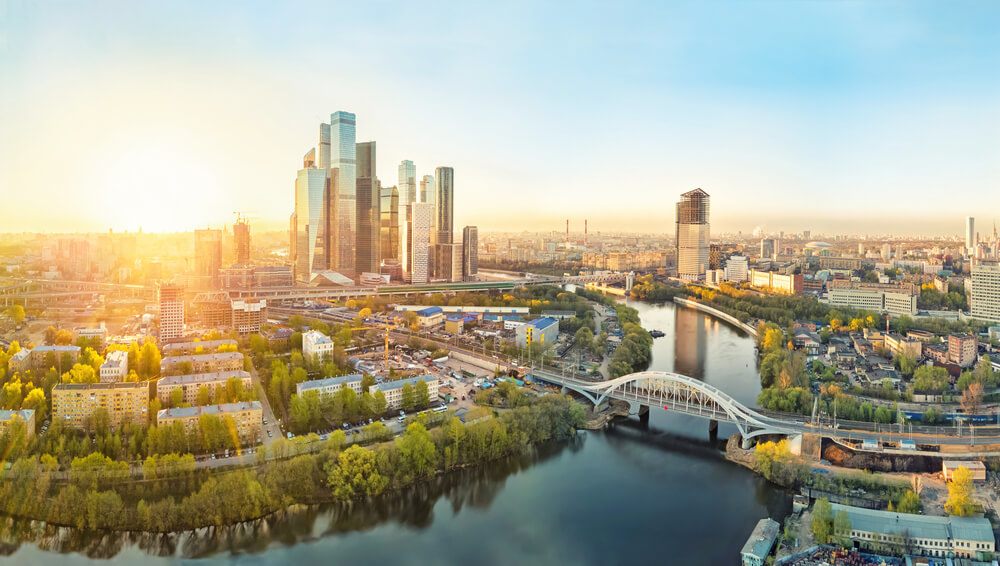
If you’re planning a trip to Moscow during fall (September-November) try to plan for early fall. This way the temperatures will still be pleasant and winter won’t be threatening.
Russian winters (December-February) are not for the faint of heart as Napoleon learned to his peril. Some days the sun will be out for less than an hour, and snow is guaranteed. Although winters are exceptionally cold, this is when you’ll get a true glimpse of the Moscow experience!
The best time to visit Moscow is during spring (March-May). The temperatures will begin to creep up and the sun begins to shine for significant portions of the day. Hotel rates will also have yet to skyrocket into peak ranges!
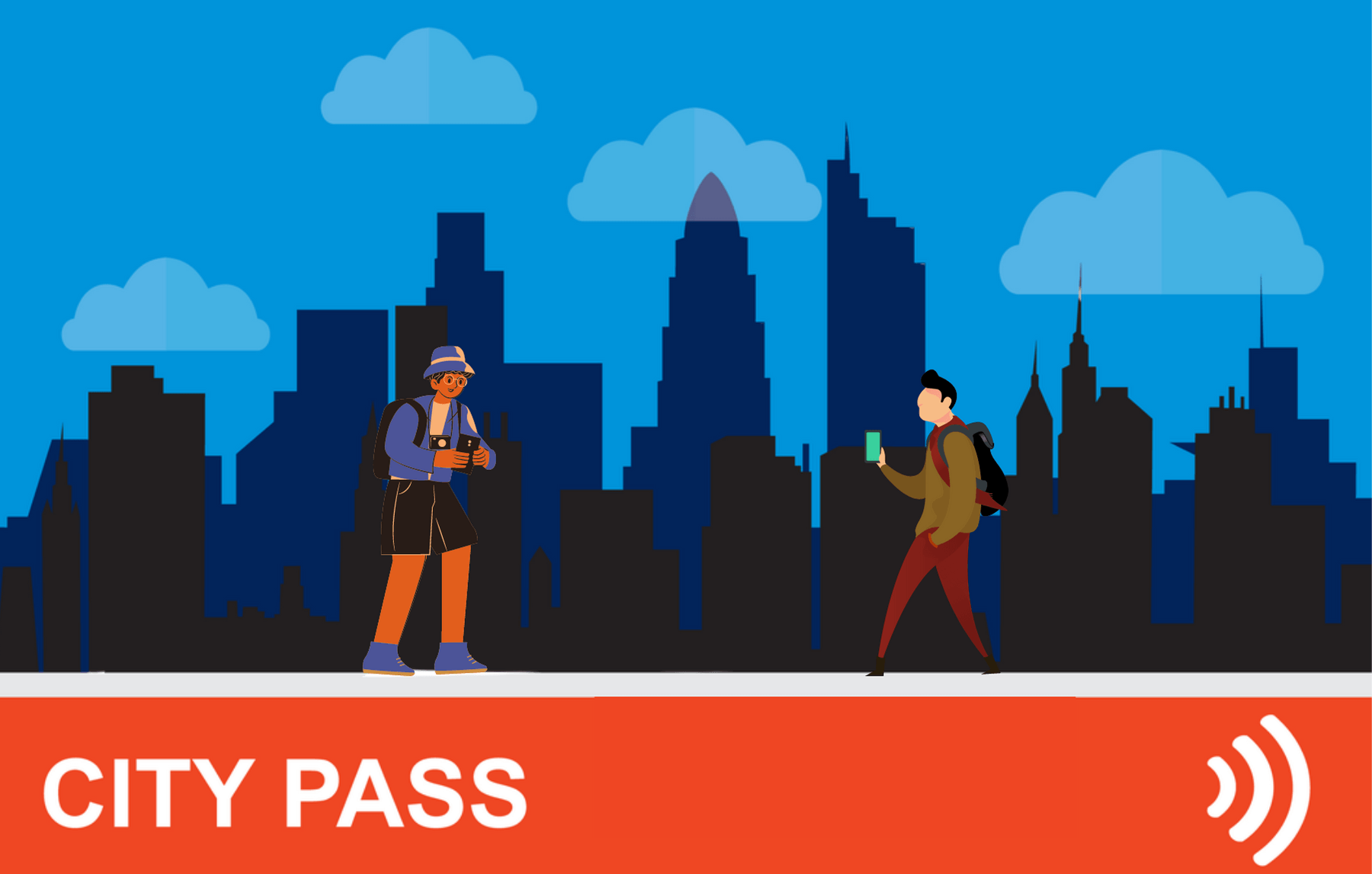
With a Moscow City Pass , you can experience the best of Moscow at the CHEAPEST prices. Discounts, attractions, tickets, and even public transport are all standards in any good city pass – be sure invest now and save them $$$ when you arrive!
Moscow is a large city with many accommodation options to choose from. Staying in a location that fits with your travel plans will only enhance your Moscow itinerary. Here is a brief introduction to a few great areas of the city we recommend checking out!
The best place to stay in Moscow to be close to all the action is Kitay-Gorod. This charming neighborhood will put you within walking distance to Moscow’s famous Red Square, thus cutting down on travel time. This will allow you to see more of the city in a shorter amount of time!
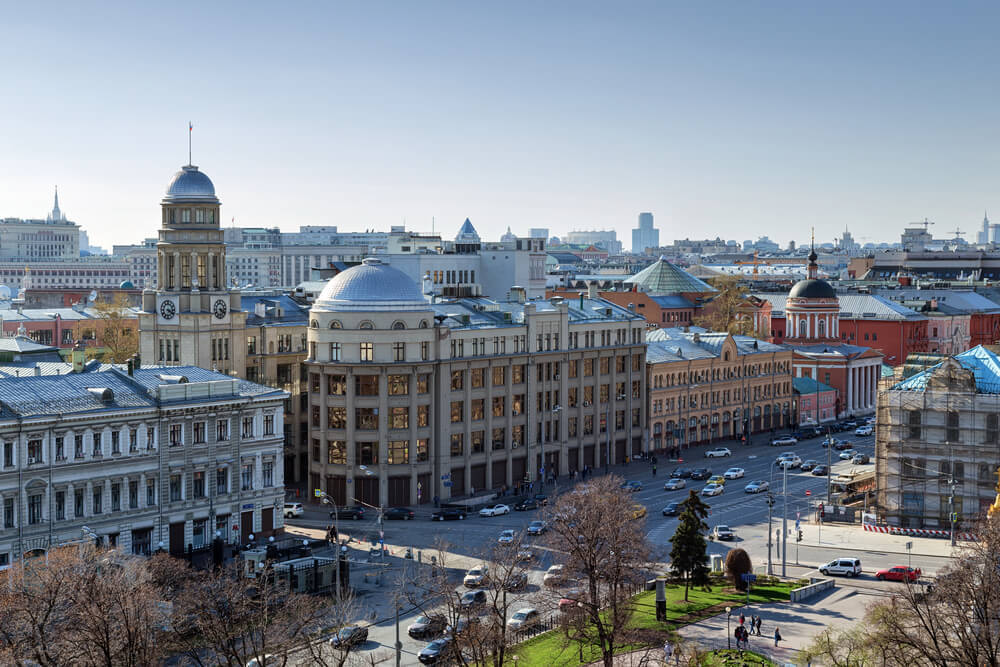
It’s surrounded by restaurants, cafes, bars, and shops. If you’re a first-time visitor to Moscow, or just planning a quick weekend in Moscow, then this area is perfect for you!
Another great area to consider is the Zamoskvorechye district. This area of the city offers a blend of new and old Moscow. It has an artsy vibe and there are plenty of fun sites you can explore outside of the main touristy areas of Moscow.
Of course, as in all areas of Moscow, it’s close to public transportation that will quickly connect you with the rest of the city and make your Moscow itinerary super accessible!
Best Airbnb in Moscow – Exclusive Apartment in Old Moscow
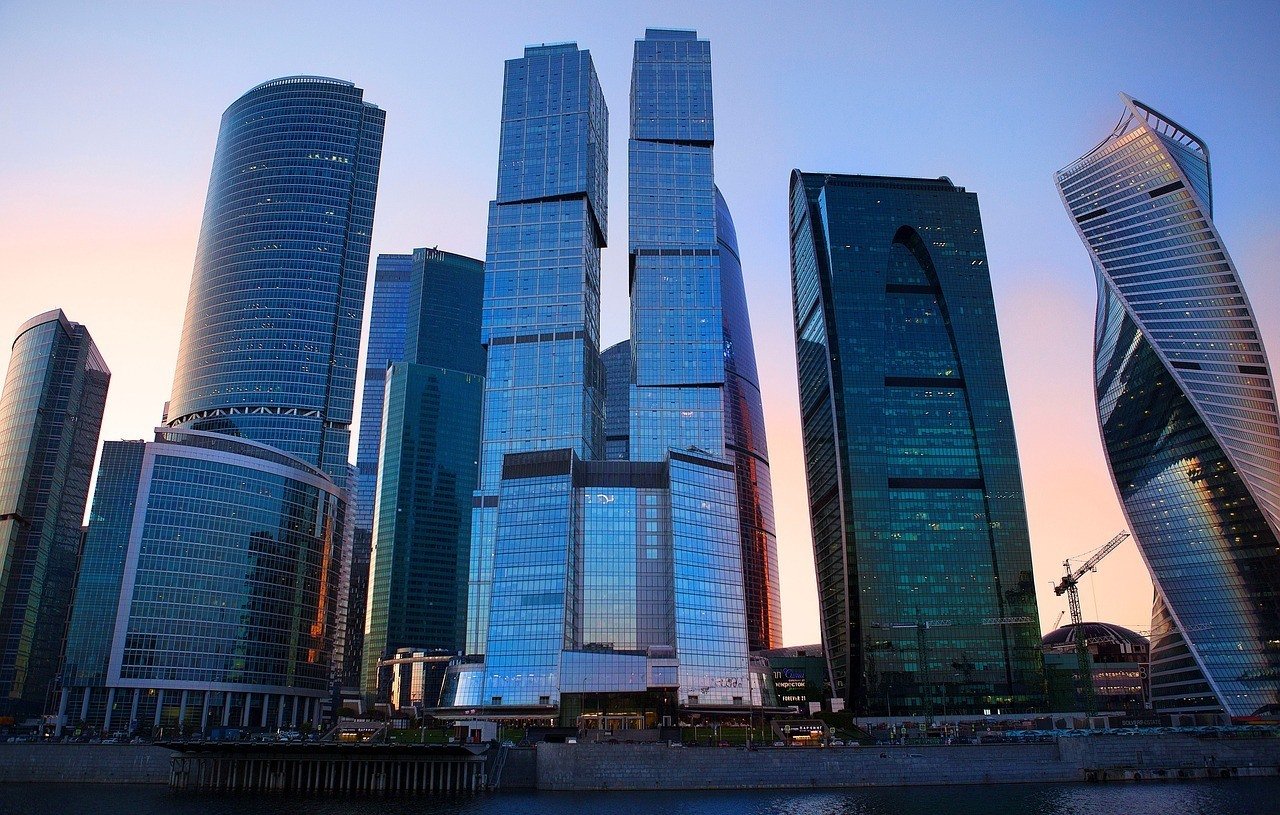
Modern and cozy, this apartment is in the heart of Old Moscow. Bordering the Basmanny and Kitay-Gorod districts, this two-bedroom flat is walking distance to the Kremlin and Red Square. Safe, quiet, and comfortable, this is the best Airbnb in Moscow, no question!
Best Budget Hotel in Moscow – Izmailovo Alfa Hotel

The Izmailovo Alfa Hotel is a very highly rated accommodation that provides all the components necessary for a comfortable trip to Moscow. There is an on-site restaurant, bar, fitness center, and an airport shuttle service. The rooms are modern and spacious and are equipped with a TV, heating/air conditioning, minibar, and more!
Best Luxury Hotel in Moscow – Crowne Plaza Moscow World Trade Centre
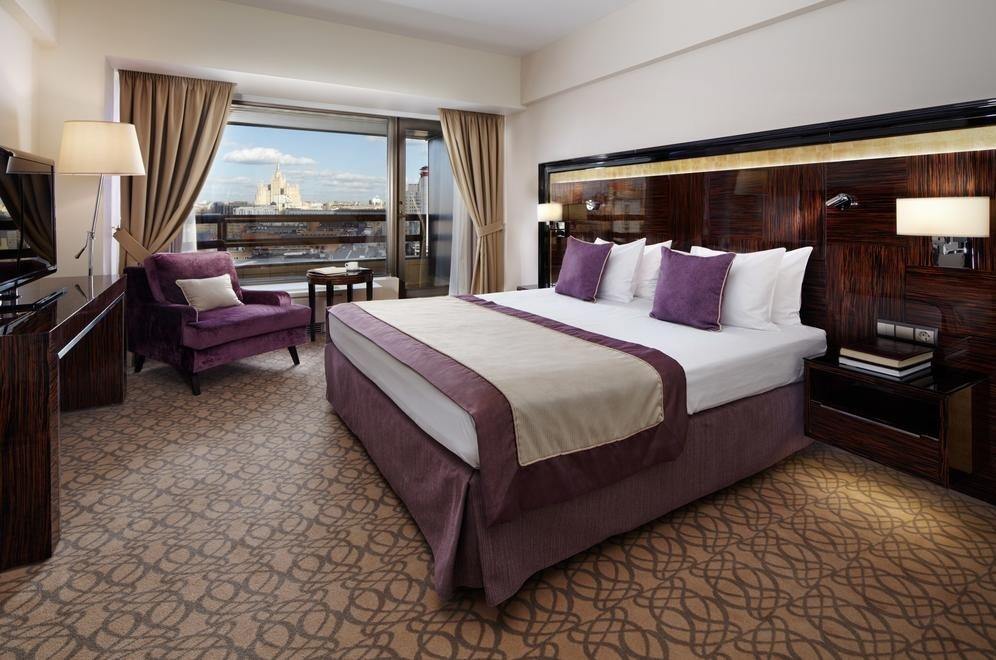
If you’re touring Moscow in luxury, the Crowne Plaza Moscow World Trade Centre is the hotel for you! Elegantly furnished rooms are equipped with a minibar, flat-screen TV, in-room safes, as well as tea and coffee making facilities! Bathrooms come with bathrobes, slippers, and free toiletries. There is also an onsite restaurant, bar, and fitness center.
Best Hostel in Moscow – Godzillas Hostel
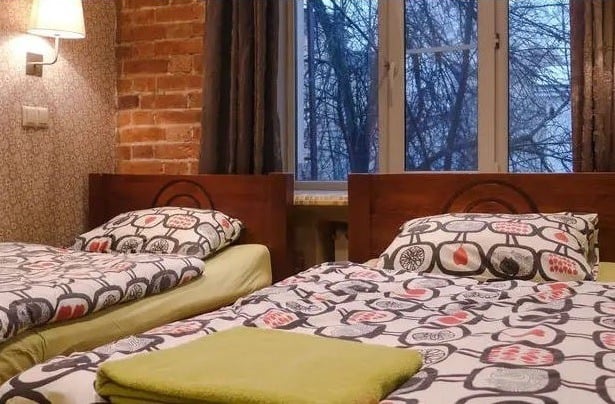
Godzillas Hostel is located in the center of Moscow, just a short walk from all the major tourist attractions and the metro station. Guests will enjoy all the usual hostel perks such as self-catering facilities, 24-hour reception, Free Wi-Fi, and security lockers. This is one of the best hostels in Moscow and its wonderful social atmosphere and will make your vacation in Moscow extra special!
Godzillas Hostel is one of our favourites in Moscow but they’re not taking guests right now. We’re not sure if they’re closed for good but we hope they’ll come back soon.
An important aspect of planning any trip is figuring out the transportation situation. You’re probably wondering how you’re going to get to all of your Moscow points of interest right? Luckily, this sprawling city has an excellent network of public transportation that will make traveling a breeze!
The underground metro system is the quickest and most efficient way to travel around Moscow. Most visitors rely exclusively on this super-efficient transportation system, which allows you to get to pretty much anywhere in the city! It’s also a great option if you’re planning a Moscow itinerary during the colder months, as you’ll be sheltered from the snow and freezing temperatures!
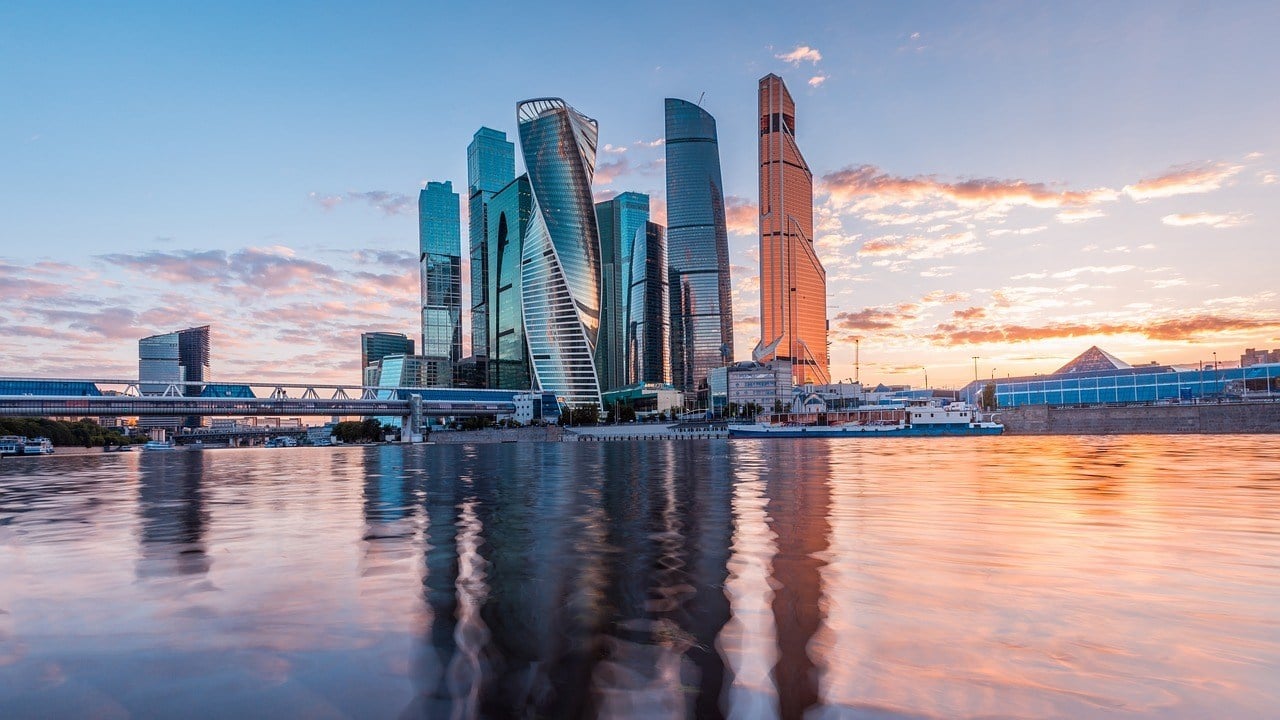
If you prefer above-ground transportation, buses, trams, and trolleybuses, run throughout the city and provide a rather comfortable alternative to the metro.
Moscow’s metro, buses, trams, and trolleybuses are all accessible with a ‘Troika’ card. This card can be topped up with any sum of money at a metro cash desk. The ticket is simple, convenient, and even refundable upon return to a cashier!
No matter which method you choose, you’ll never find yourself without an easy means of getting from point A to point B!
Red Square | Moscow Kremlin | Lenin’s Mausoleum | St. Basil’s Cathedral | GUM Department Store
Spend the first day of your itinerary taking your own self guided Moscow walking tour around the historic Red Square! This is Moscow’s compact city center and every stop on this list is within easy walking distance to the next! Get ready to see all of the top Moscow landmarks!
Day 1 / Stop 1 – The Red Square
- Why it’s awesome: The Red Square is the most recognizable area in Moscow, it has mesmerizing architecture and centuries worth of history attached to its name.
- Cost: Free to walk around, individual attractions in the square have separate fees.
- Food nearby: Check out Bar BQ Cafe for friendly service and good food in a great location! The atmosphere is upbeat and they’re open 24/7!
The Red Square is Moscow’s historic fortress and the center of the Russian government. The origins of the square date back to the late 15th century, when Ivan the Great decided to expand the Kremlin to reflect Moscow’s growing power and prestige!
During the 20th century, the square became famous as the site for demonstrations designed to showcase Soviet strength. Visiting the Red Square today, you’ll find it teeming with tourists, who come to witness its magical architecture up close!
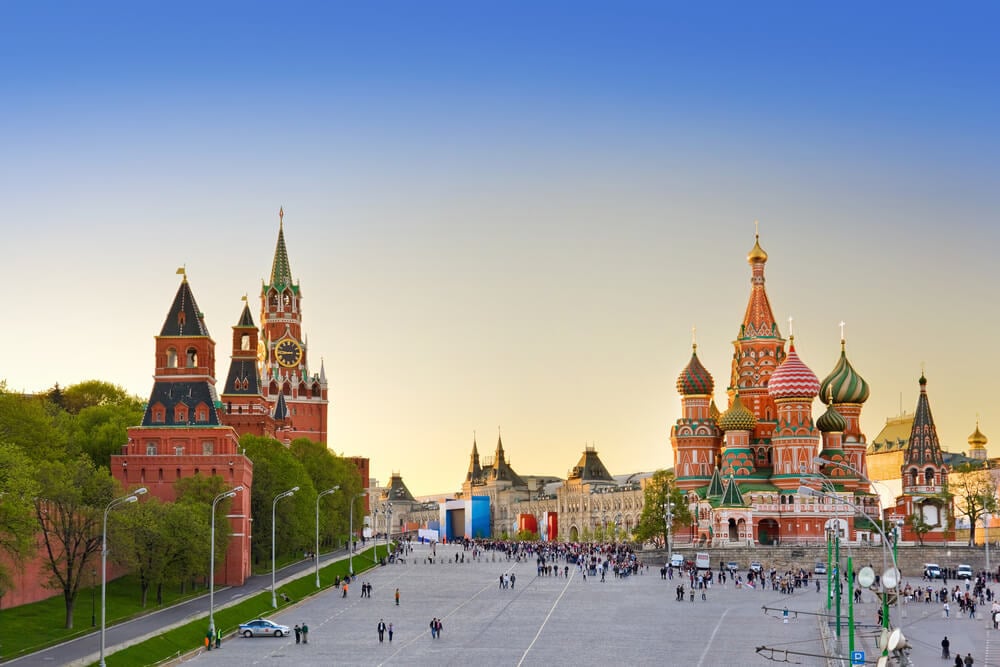
The square is the picture postcard of Russian tourism, so make sure to bring your camera when you visit! No matter the season, or the time of day, it’s delightfully photogenic!
It’s also home to some of Russia’s most distinguishing and important landmarks, which we’ve made sure to include further down in this itinerary. It’s an important center of Russia’s cultural life and one of the top places to visit in Moscow!
In 1990, UNESCO designated Russia’s Red Square as a World Heritage site. Visiting this historic site is a true bucket-list event and essential addition to your itinerary for Moscow!
Day 1 / Stop 2 – The Moscow Kremlin
- Why it’s awesome: The Moscow Kremlin complex includes several palaces and cathedrals and is surrounded by the Kremlin wall. It also houses the principal museum of Russia (the Kremlin Armory).
- Cost: USD $15.00
- Food nearby: Bosco Cafe is a charming place to grat a casual bite to eat. They have excellent coffee and wonderful views of the Red Square and the Moscow Kremlin!
The iconic Moscow Kremlin , also known as the Kremlin museum complex, sits on Borovitsky Hill, rising above the Moscow River. It is a fortified complex in the center of the city, overlooking several iconic buildings in the Red Square!
It’s the best known of the Russian Kremlins – citadels or fortress’ protecting and dominating a city. During the early decades of the Soviet era, the Kremlin was a private enclave where the state’s governing elite lived and worked.
The Kremlin is outlined by an irregularly shaped triangular wall that encloses an area of 68 acres! The existing walls and towers were built from 1485 to 1495. Inside the Kremlin museum complex, there are five palaces, four cathedrals, and the enclosing Kremlin Wall with Kremlin towers.
The Armoury Chamber is a part of the Grand Kremlin Palace’s complex and is one of the oldest museums of Moscow, established in 1851. It showcases Russian history and displays many cherished relics. Definitely make sure to check out this museum while you’re here!
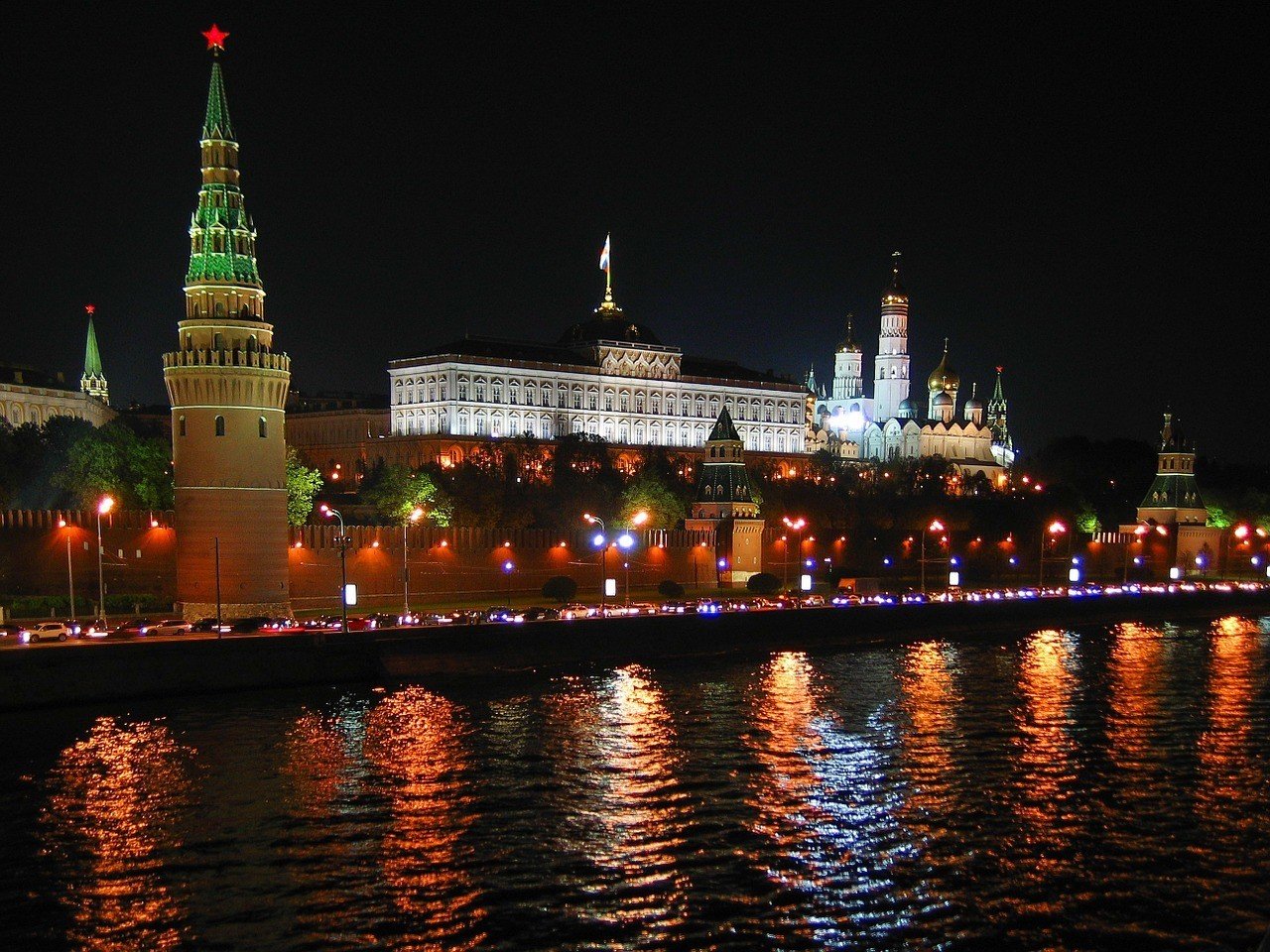
The churches inside the Moscow Kremlin are the Cathedral of the Dormition, Church of the Archangel, Church of the Annunciation, and the bell tower of Ivan Veliki (a church tower).
The five-domed Cathedral of the Dormition is considered the most famous. It was built from 1475–1479 by an Italian architect and has served as a wedding and coronation place for great princes, tsars, and emperors of Russia. Church services are given in the Kremlin’s numerous cathedrals on a regular basis.
The Grand Kremlin Palace was the former Tsar’s Moscow residence and today it serves as the official workplace of the President of the Russian Federation (Vladimir Putin seems to have bagged that title for life) .
Insider Tip: The Kremlin is closed every Thursday! Make sure to plan this stop on your Moscow itinerary for any other day of the week!
Day 1 / Stop 3 – Lenin’s Mausoleum
- Why it’s awesome: The mausoleum displays the preserved body of Soviet leader Vladimir Lenin .
- Cost: Free!
- Food nearby: Khinkal’naya is a charming Georgian restaurant with vaulted ceilings and exposed brick. It’s a popular place with locals and right next to the Red Square!
Lenin’s Mausoleum, also known as Lenin’s Tomb, is the modernist mausoleum for the revolutionary leader Vladimir Lenin. It’s located within the Red Square and serves as the resting place for the Soviet leader! His preserved body has been on public display since shortly after his death in 1924.
It’s located just a few steps away from the Kremlin Wall and is one of the most controversial yet popular Moscow attractions!
Admission is free for everyone, you’ll only need to pay if you need to check a bag. Before visitors are allowed to enter the mausoleum, they have to go through a metal detector first. No metal objects, liquids, or large bags are allowed in the mausoleum!
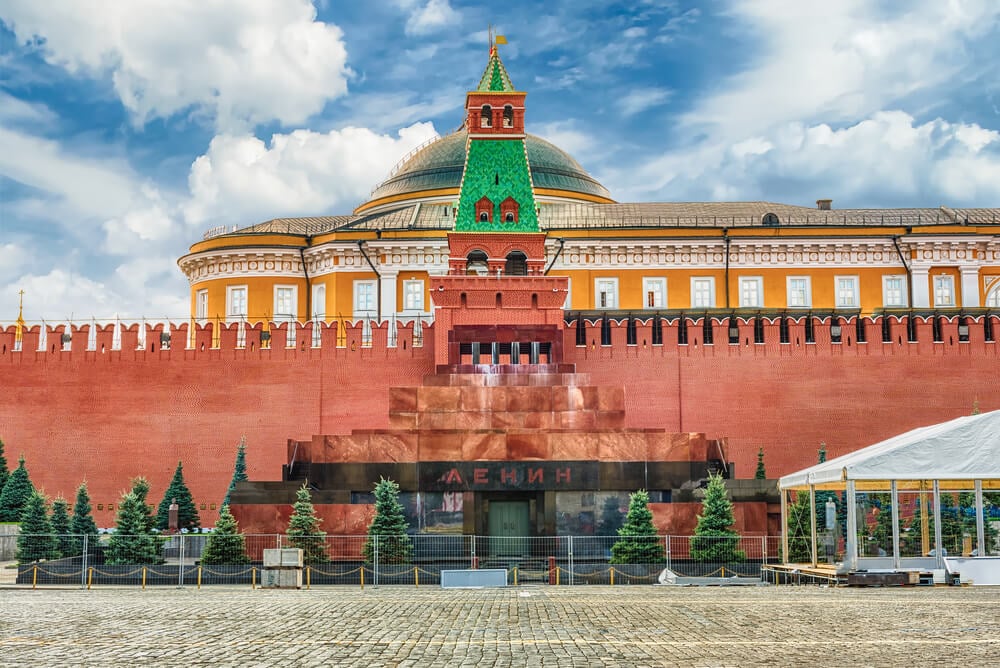
Expect a line to enter the building, and while you’re inside the building, you’ll be constantly moving in line with other visitors. This means you won’t be able to spend as long as you’d like viewing the mausoleum, but you’ll still be able to get a good look. Pictures and filming while inside the building are strictly prohibited, and security guards will stop you if they see you breaking this rule.
The mausoleum is only open on Tuesday, Wednesday, Thursday, and Saturday – unless it’s a public holiday or a day scheduled for maintenance. The hours it’s open for each day are limited, make sure to check online before you visit to make sure you can fit this into your Moscow itinerary for that day!
Insider Tip: The Lenin’s Museum is there for people to pay their respect; remember to keep silent and move along quickly, it’s not intended for people to congregate around. Also, men are not allowed to wear hats and everyone must take their hands out of their pockets when inside the building.
Day 1 / Stop 4 – St. Basil’s Cathedral
- Why it’s awesome: A dazzling designed cathedral that showcases Russia’s unique architecture. This cathedral is one of the most recognizable symbols of the country!
- Cost: USD $8.00
- Food nearby: Moskovskiy Chaynyy Klub is a cozy cafe serving food items and pipping hot tea; it’s the perfect place to go if you’re visiting Moscow during the winter months!
Located in the Red Square, the ornate 16th-century St. Basil’s Cathedral is probably the building you picture when you think of Moscow’s unique architecture. Its colorful onion-shaped domes tower over the Moscow skyline!
The cathedral was built from 1555-1561 by order of Tsar Ivan the Terrible. It was designed with an iconic onion dome facade and enchanting colors that captivate all who see it. Fun fact: If you’re wondering why Russian churches have onion domes, they are popularly believed to symbolize burning candles!
This iconic cathedral has become a symbol of Russia due to its distinguishing architecture and prominent position inside the Red Square. It’s one of the most beautiful, wonderful, and mesmerizing historical cathedrals in the world!
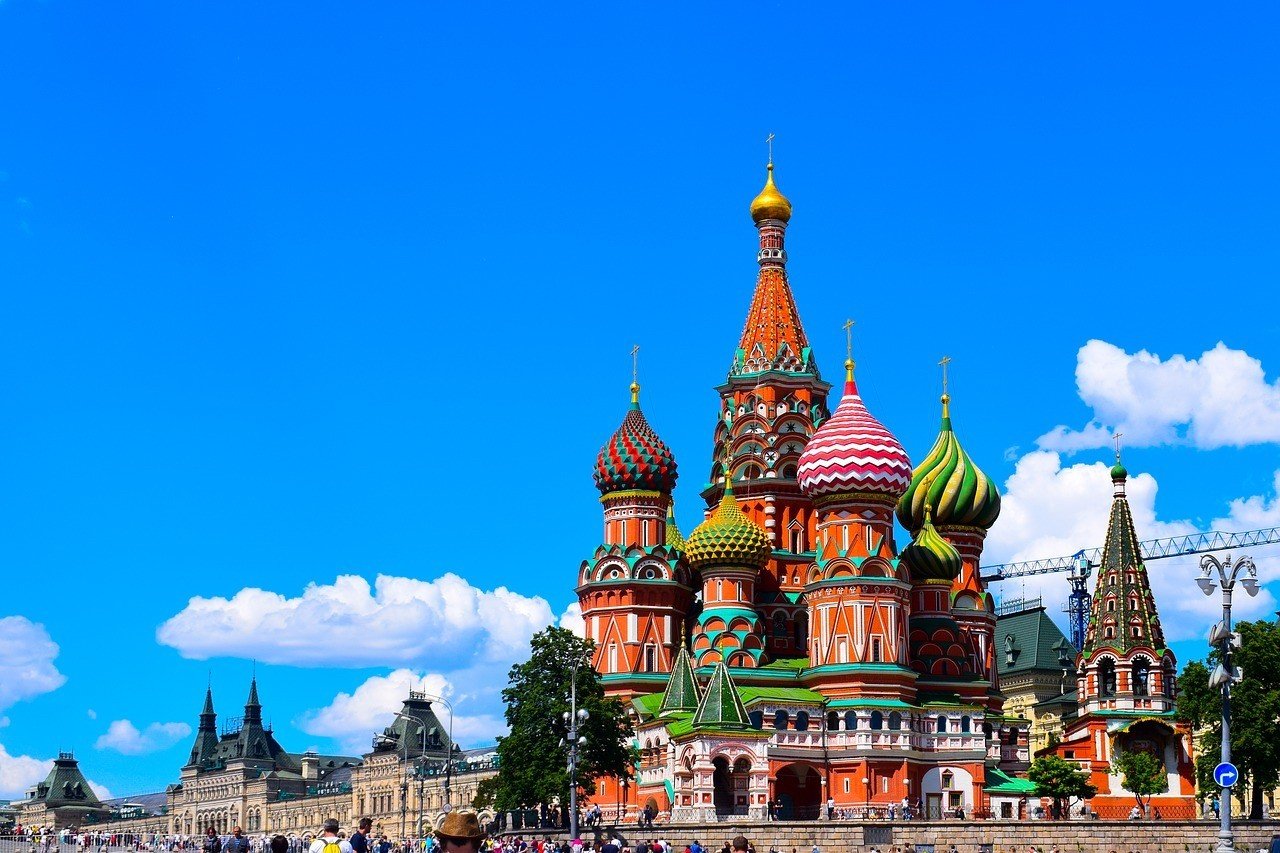
The interior of the church surprises most people when they visit. In contrast to the large exterior, the inside is not so much one large area, but rather a collection of smaller areas, with many corridors and small rooms. There are 9 small chapels and one mausoleum grouped around a central tower.
Visiting the inside is like walking through a maze, there are even small signs all around the cathedral tracing where to walk, and pointing you in the right direction! The walls are meticulously decorated and painted with intricate floral designs and religious themes.
The church rarely holds service and is instead a museum open for the public to visit.
Insider Tip: During the summer months the line to go inside the cathedral can get quite long! Make sure to arrive early or reserve your tickets online to guarantee quick access into the cathedral!
Day 1 / Stop 5 – GUM Department Store
- Why it’s awesome: This is Russia’s most famous shopping mall! It’s designed with elegant and opulent architecture and provides a real sense of nostalgia!
- Cost: Free to enter
- Food nearby: Stolovaya 57 is a cafeteria-style restaurant with a variety of inexpensive Russian cuisine menu items including soups, salads, meat dishes, and desserts. It’s also located inside the GUM department store, making it very easily accessible when you’re shopping!
The enormous GUM Department Store is located within the historic Red Square. It has a whimsical enchantment to it that sets it apart from your typical department store.
A massive domed glass ceiling lines the top of the building and fills the interior with natural sunlight. There are live plants and flowers placed throughout the mall that give the shopping complex a lively and cheerful feel! A playful fountain sits in the center, further adding to the malls inviting a sense of wonder and amusement!
The GUM department store opened on December 2, 1893. Today, it includes local and luxury stores, including Fendi, Louis Vuitton, Prada, and many more! There are numerous cafes, restaurants, and even a movie theater inside!
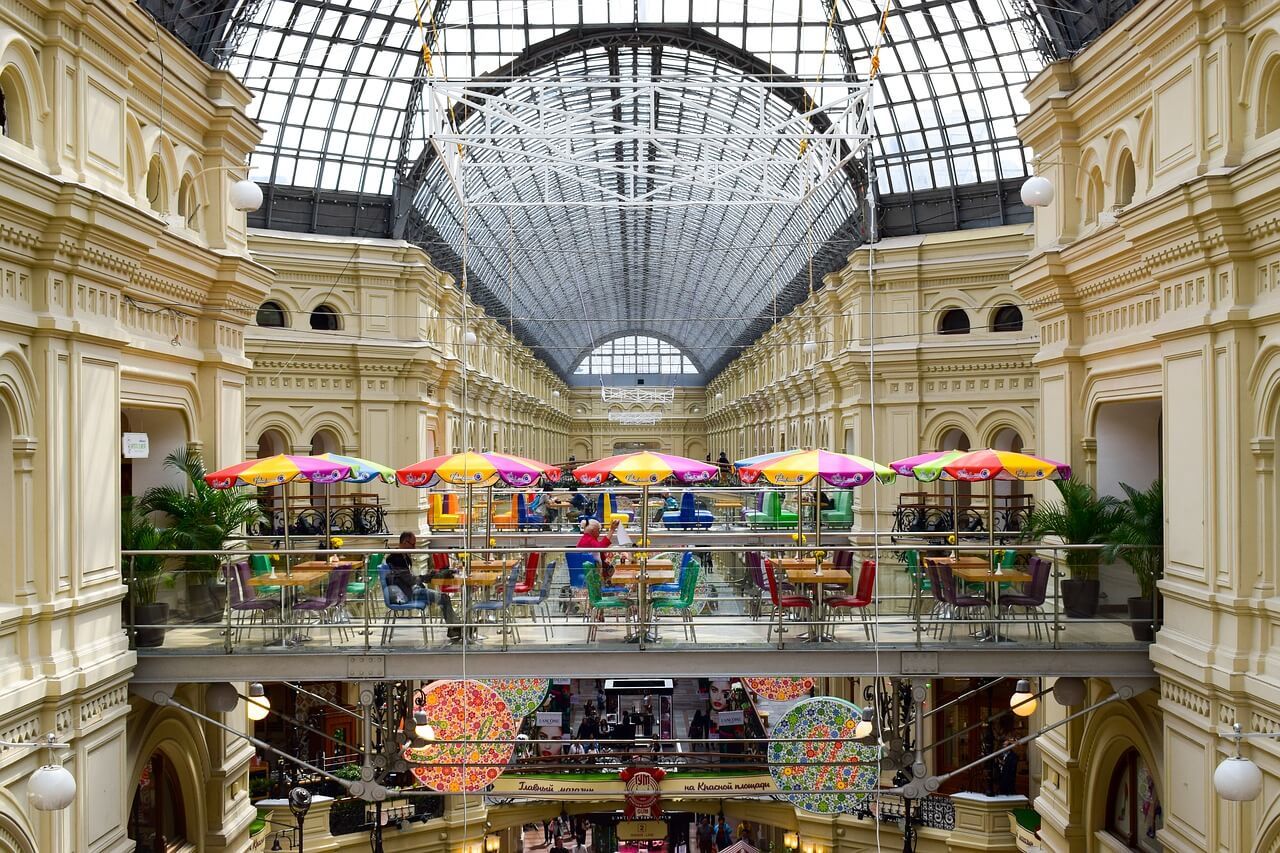
For a special treat, head into Gastronom 1. This 1950s-style shop sells gourmet food items, like wine, freshly-baked pastries, cheese, Russian chocolate, and of course, vodka! Also, be on the lookout for a bicycle pedaling ice cream truck with an employing selling ice cream!
The ambiance is simply amazing, a trip to this idyllic shopping mall is an absolute must on any Moscow itinerary!
Insider Tip: Make sure to carry some small change on you in case you need to use the restroom, you’ll need to pay 50 rubles – or about USD $0.80 to use the bathroom in GUM.
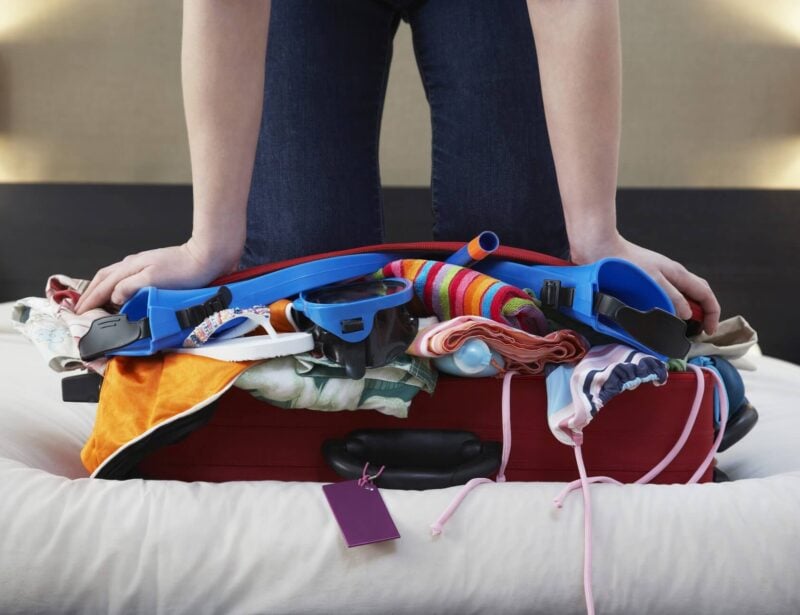
Wanna know how to pack like a pro? Well for a start you need the right gear….
These are packing cubes for the globetrotters and compression sacks for the real adventurers – these babies are a traveller’s best kept secret. They organise yo’ packing and minimise volume too so you can pack MORE.
Or, y’know… you can stick to just chucking it all in your backpack…
Novodevichy Convent | Gorky Park | State Tretyakov Gallery | All-Russian Exhibition Center | Bolshoi Theater
On your 2 day itinerary in Moscow, you’ll have a chance to use the city’s excellent public transportation service! You’ll explore a few more of Moscow’s historic highlight as well as some modern attractions. These sites are a little more spread out, but still very easily accessible thanks to the metro!
Day 2 / Stop 1 – Novodevichy Convent
- Why it’s awesome: The Novodevichy Convent is rich in imperial Russian history and contains some of Russia’s best examples of classical architecture!
- Cost: USD $5.00
- Food nearby: Culinary Shop Karavaevs Brothers is a cozy and simple place to have a quick bite, they also have vegetarian options!
The Novodevichy Convent is the best-known and most popular cloister of Moscow. The convent complex is contained within high walls, and there are many attractions this site is known for!
The six-pillared five-domed Smolensk Cathedral is the main attraction. It was built to resemble the Kremlin’s Assumption Cathedral and its facade boasts beautiful snowy white walls and a pristine golden onion dome as its centerpiece. It’s the oldest structure in the convent, built from 1524 -1525, and is situated in the center of the complex between the two entrance gates.
There are other churches inside the convent as well, all dating back from many centuries past. The convent is filled with an abundance of 16th and 17th-century religious artworks, including numerous large and extravagant frescos!
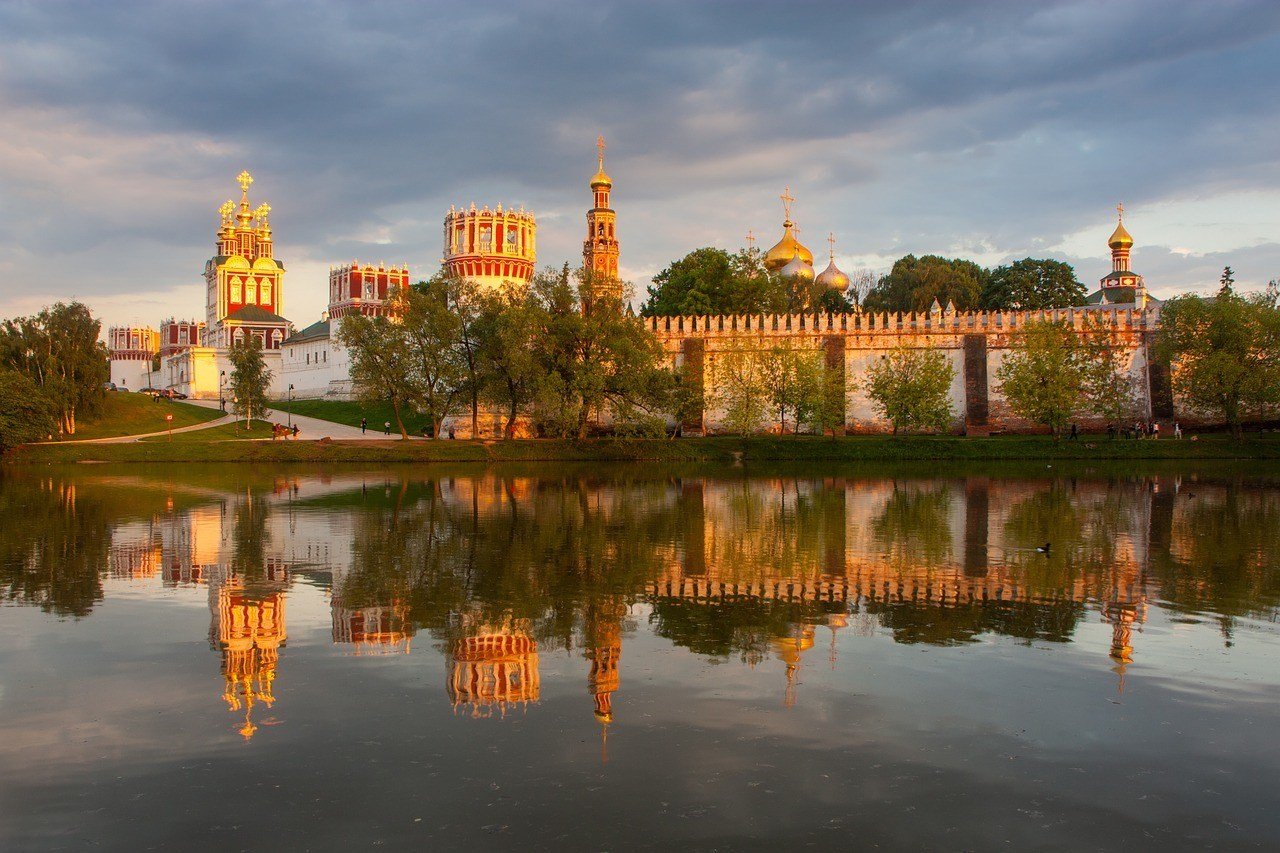
Just outside the convent’s grounds lies the Novodevichy Cemetery. Here, you can visit the graves of famous Russians, including esteemed authors, composers, and politicians. Probably the most intriguing gravestone belongs to Russian politician Nikita Khruschev!
The Novodevichy Convent is located near the Moscow River and offers a peaceful retreat from the busy city. In 2004, it was proclaimed a UNESCO World Heritage Site. The convent remains remarkably well-preserved and is an outstanding example of Moscow Baroque architecture!
Insider Tip: To enter the cathedrals inside the complex, women are advised to cover their heads and shoulders, while men should wear long pants.
Day 2 / Stop 2 – Gorky Central Park of Culture and Leisure
- Why it’s awesome: A large amusement area in the heart of the city offering many attractions!
- Cost: Free!
- Food nearby: Check out Mepkato, located inside Gorky Central Park for a casual meal in a cozy setting. There are indoor and outdoor seating options and the restaurant is child-friendly!
Gorky Central Park of Culture and Leisure is a large green space in the heart of Moscow. The park opened in 1928, and it stretches along the scenic embankment of the Moskva River. It covers an area of 300-acres and offers a lovely contrast from the compact city center.
You’ll find all sorts of wonderful attractions, from boat rides to bike rentals to tennis courts and ping-pong tables, and much more! there are an open-air cinema and festive events and concerts scheduled in the summer months. A wide selection of free fitness classes is also offered on a regular basis, including jogging, roller skating, and dancing!
Although many of the options you’ll find here are more suited for outdoor leisure during the summer, you’ll also a selection of winter attractions, including one of Europe’s largest ice rinks for ice-skating!
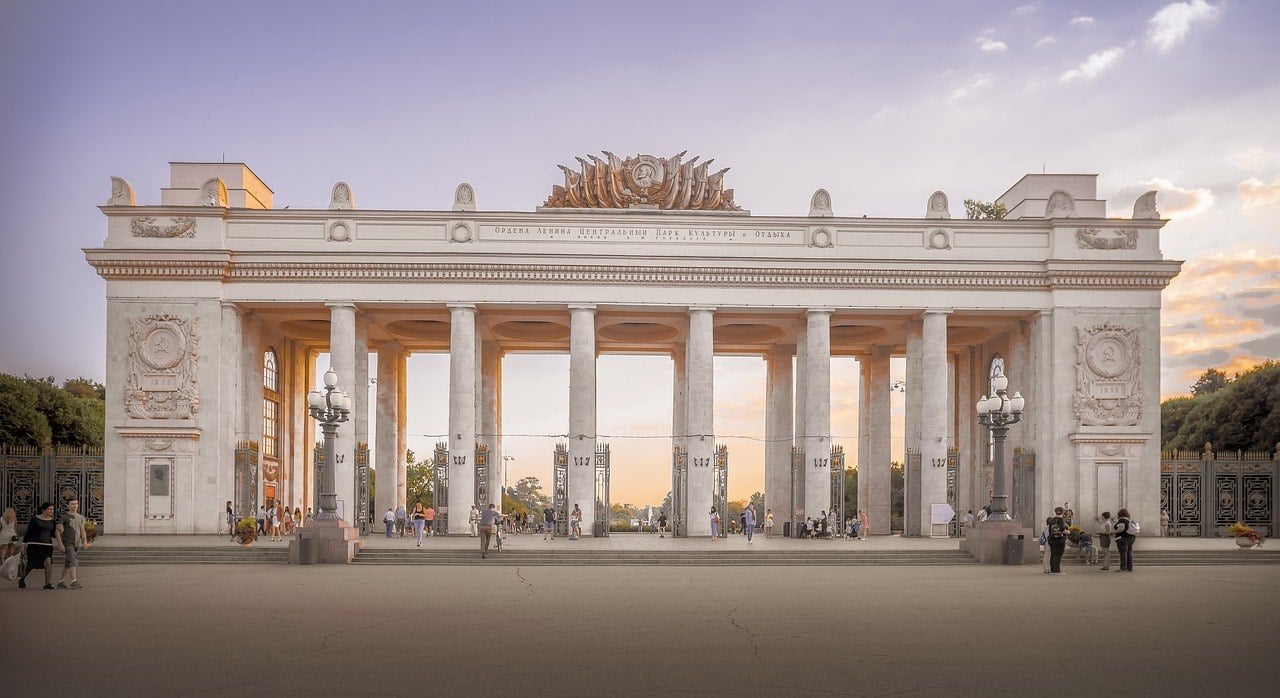
If you’re trying to decide what to do in Moscow with kids, the park also offers several venues designed specifically for kids. Check out the year-round Green School which offers hands-on classes in gardening and art! You can also feed the squirrels and birds at the Golitsinsky Ponds!
The park is very well maintained and kept clean and the entrance is free of charge, although most individual attractions cost money. There is also Wi-Fi available throughout the park.
With so many attractions, you could easily spend all day here! If you’re only planning a 2 day itinerary in Moscow, make sure to plan your time accordingly and map out all the areas you want to see beforehand!
Day 2 / Stop 3 – The State Tretyakov Gallery
- Why it’s awesome: The gallery’s collection consists entirely of Russian art made by Russian artists!
- Food nearby : Brothers Tretyakovs is located right across the street from the gallery. It’s a wonderfully atmospheric restaurant serving top quality food and drinks!
The State Tretyakov Gallery was founded in 1856 by influential merchant and collector Pavel Tretyakov. The gallery is a national treasury of Russian fine art and one of the most important museums in Russia!
It houses the world’s best collection of Russian art and contains more than 130, 000 paintings, sculptures, and graphics! These works have been created throughout the centuries by generations of Russia’s most talented artists!
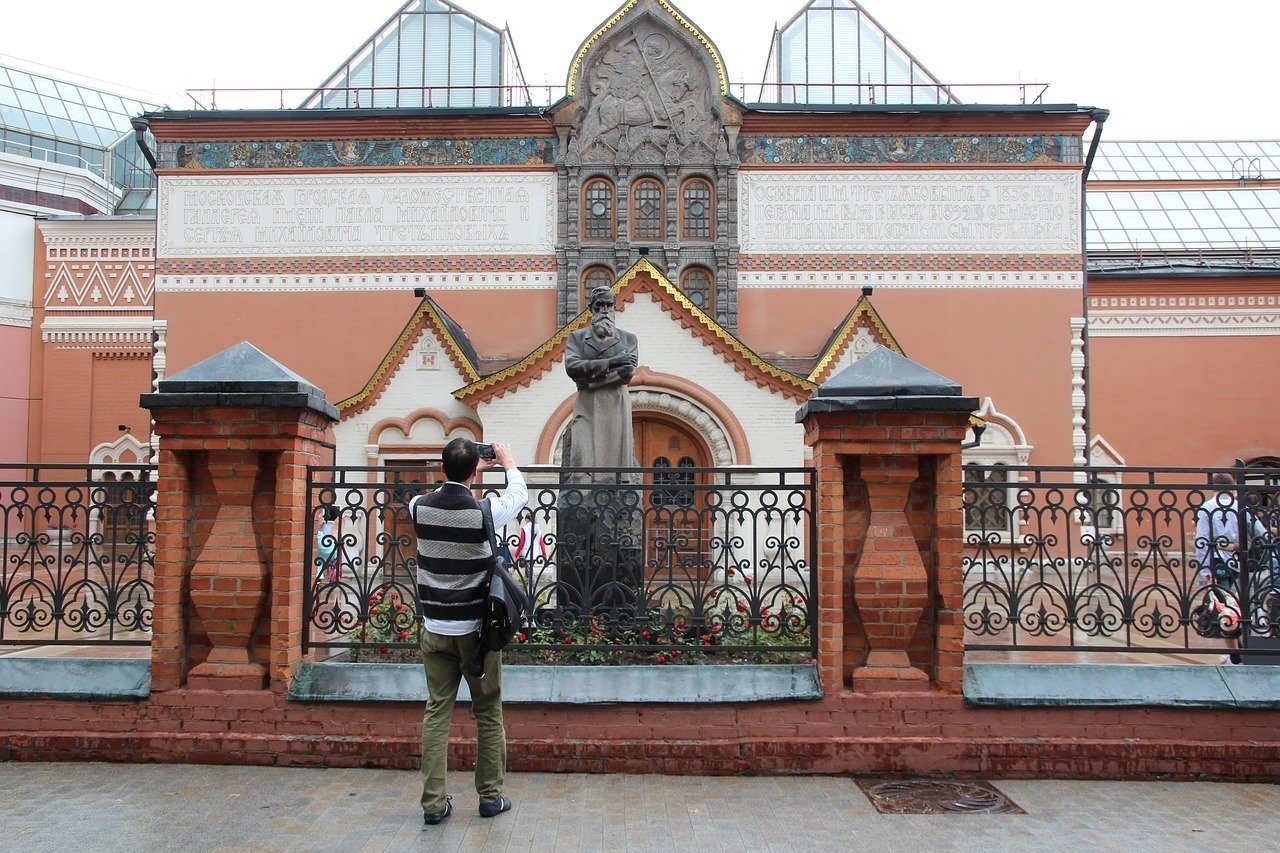
The exhibits range from mysterious 12th-century images to politically charged canvases. The collection is rich and revealing and offers great insight into the history and attitudes of this long-suffering yet inspired people!
All pictures are also labeled in English. If you plan to take your time and see everything inside the museum it will take a good 3-4 hours, so make sure to plan your Moscow trip itinerary accordingly! This gallery is a must-see stop for art lovers, or anyone wanting to explore the local culture and history of Russia in a creative and insightful manner!
Insider Tip: When planning your 2 days in Moscow itinerary, keep in mind that most museums in Moscow are closed on Mondays, this includes The State Tretyakov Gallery!
Day 2 / Stop 4 – All-Russian Exhibition Center
- Why it’s awesome: This large exhibition center showcases the achievements of the Soviet Union in several different spheres.
- Food nearby: Varenichnaya No. 1 serves authentic and homestyle Russian cuisine in an intimate and casual setting.
The All-Russian Exhibition Center is a massive park that presents the glory of the Soviet era! It pays homage to the achievements of Soviet Russia with its many different sites found on the property.
The center was officially opened in 1939 to exhibit the achievements of the Soviet Union. It’s a huge complex of buildings and the largest exhibition center in Moscow. There are several exhibition halls dedicated to different achievements and every year there are more than one hundred and fifty specialized exhibitions!
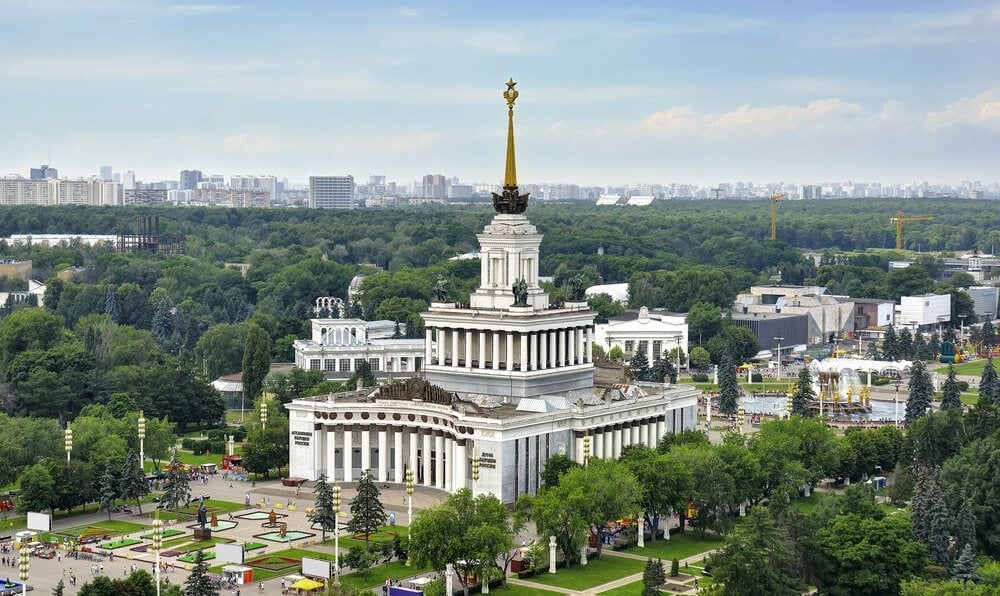
The Peoples Friendship Fountain was constructed in 1954 and is a highlight of the park. The stunning gold fountain features 16 gilded statues of girls, each representing the former Soviet Union republics.
The Stone Flower Fountain was also built in 1954 and is worth checking out. The centerpiece of this large fountain is a flower carved from stones from the Ural Mountains! Along the side of the fountain are various bronze sculptures.
You will find many people zipping around on rollerblades and bicycles across the large area that the venue covers. It’s also home to amusement rides and carousels, making it the perfect place to stop with kids on your Moscow itinerary! Make sure to wear comfortable shoes and allow a few hours to explore all the areas that interest you!
Day 2 / Stop 5 – Bolshoi Theater
- Why it’s awesome: The Bolshoi Theater is a historic venue that hosts world-class ballet and opera performances!
- Cost: Prices vary largely between USD $2.00 – USD $228.00 based on seat location.
- Food nearby: Head to the Russian restaurant, Bolshoi for high-quality food and drinks and excellent service!
The Bolshoi Theater is among the oldest and most renowned ballet and opera companies in the world! It also boasts the world’s biggest ballet company, with more than 200 dancers!
The theater has been rebuilt and renovated several times during its long history. In 2011 it finished its most recent renovation after an extensive six-year restoration that started in 2005. The renovation included an improvement in acoustics and the restoration of the original Imperial decor.
The Bolshoi Theater has put on many of the world’s most famous ballet acts! Tchaikovsky’s ballet Swan Lake premiered at the theater in 1877 and other notable performances of the Bolshoi repertoire include Tchaikovsky’s The Sleeping Beauty and The Nutcracker!
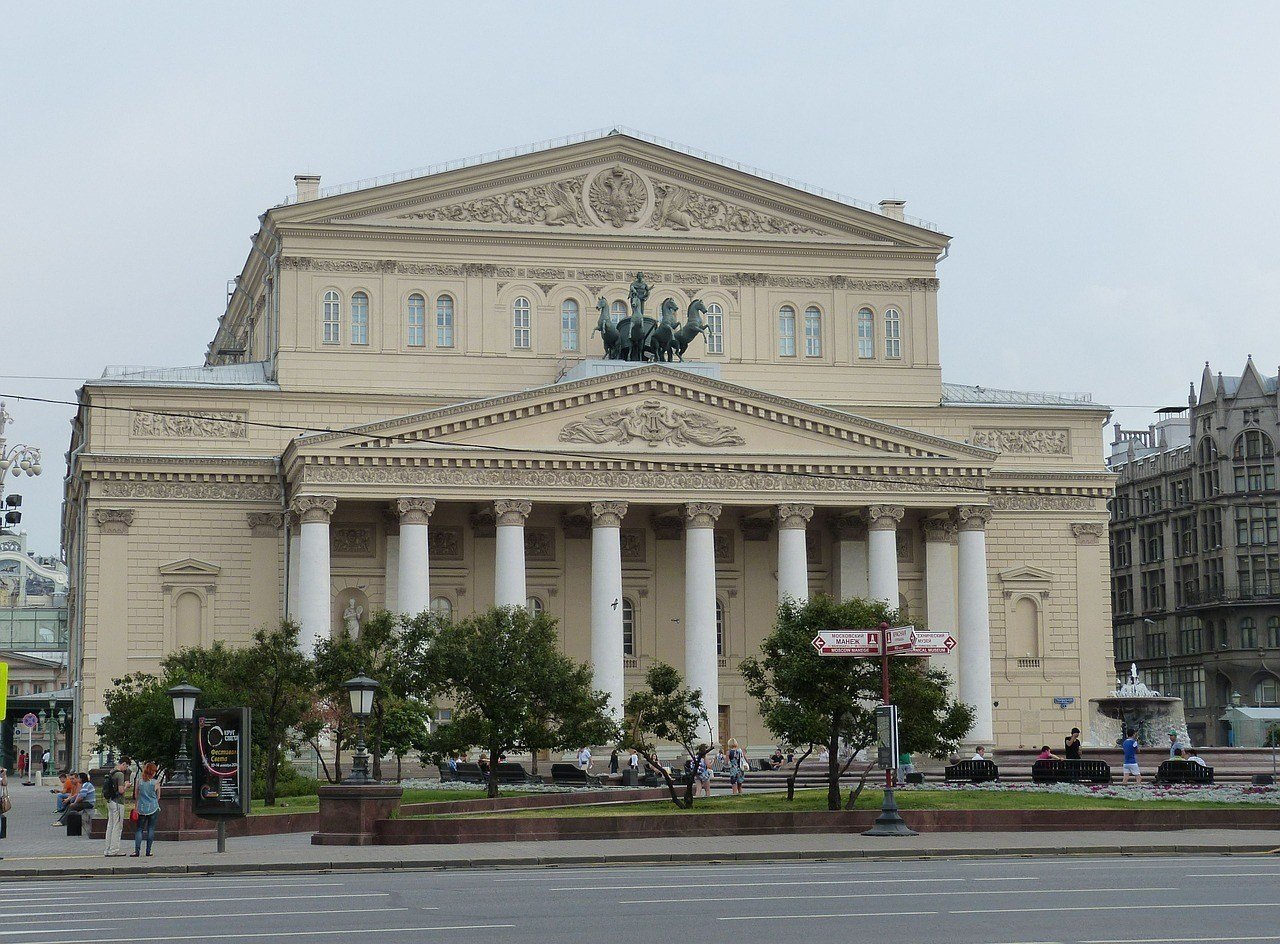
Today, when you visit the theater, you can expect a magical performance from skilled singers, dancers, and musicians with the highest level of technique!
If you don’t have time to see a show, the theater also provides guided tours on select days of the week. Tours are given in both Russian and English and will provide visitors with a more intimate look at the different areas of the theater!
The stage of this iconic Russian theater has seen many outstanding performances. If you’re a fan of the performing arts, the Bolshoi Theater is one of the greatest and oldest ballet and opera companies in the world, making it a must-see attraction on your Moscow itinerary!

Godzillas Hostel
Godzillas Hostel is located in the center of Moscow, just a short walk from all the major tourist attractions and the metro station.
- Towels Included
Cosmonautics Museum | Alexander Garden | Ostankino Tower | Izmaylovo District | Soviet Arcade Museum
Now that we’ve covered what to do in Moscow in 2 days, if you’re able to spend more time in the city you’re going to need more attractions to fill your time. Here are a few more really cool things to do in Moscow we recommend!
Memorial Museum of Cosmonautics
- Hear the timeline of the ‘space race’ from the Russian perspective
- This museum is fun for both adults and children!
- Admission is USD $4.00
The Memorial Museum of Cosmonautics is a museum dedicated to space exploration! The museum explores the history of flight, astronomy, space exploration, space technology, and space in the arts. It houses a large assortment of Soviet and Russian space-related exhibits, and the museum’s collection holds approximately 85,000 different items!
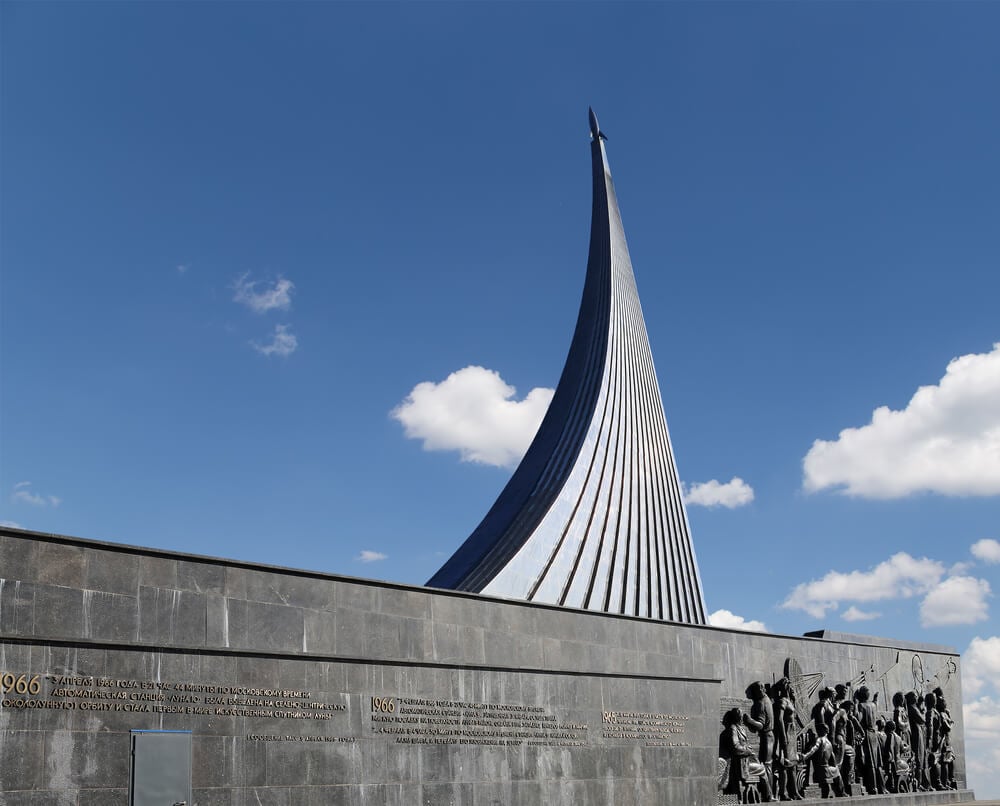
The museum does an excellent job of telling the full story of the exciting space race between the USSR and the US! It highlights the brightest moments in Russian history and humanity and is very interesting and fun for all ages!
If you’re a fan of space or just curious about gaining insight into Russia’s fascinating history of space exploration, make sure to add this to your 3 day itinerary in Moscow!
The Alexander Garden
- A tranquil place to relax near the Red Square
- Green lawns dotted with sculptures and lovely water features
- The park is open every day and has no entrance fee
The Alexander Garden was one of the first urban public parks in Moscow! The garden premiered in 1821 and was built to celebrate Russia’s victory over Napoleon’s forces in 1812!
The park is beautiful and well maintained with paths to walk on and benches to rest on. The park contains three separate gardens: the upper garden, middle garden, and lower garden.
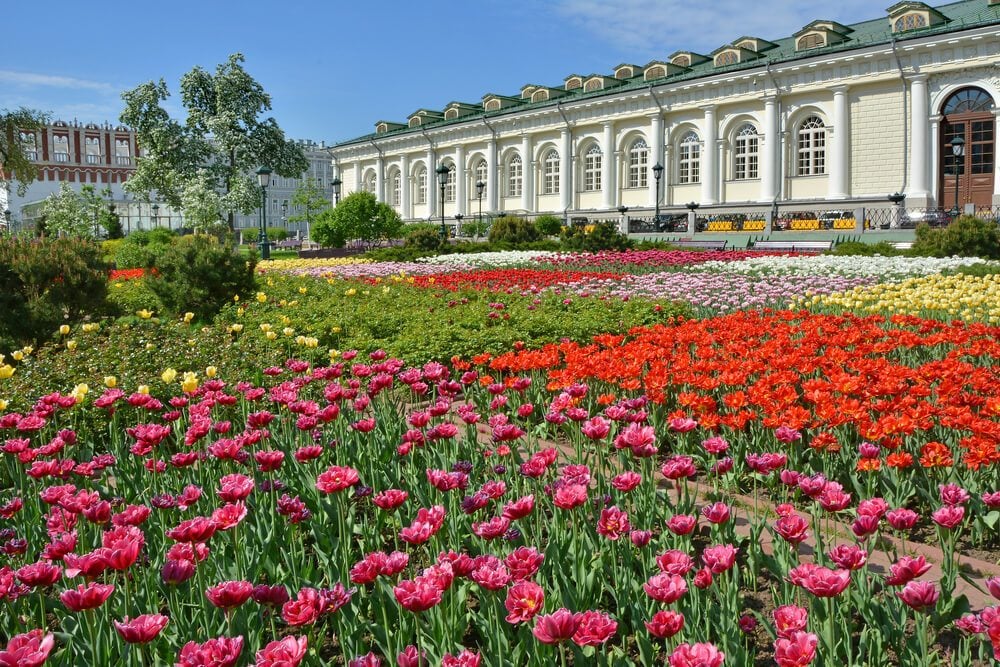
Located in the upper garden, towards the main entrance to the park is the Tomb of the Unknown Soldier with its eternal flame. This monument was created in 1967 and contains the body of a soldier who fell during the Great Patriotic War!
The park stretches along all the length of the western Kremlin wall for about half a mile. Due to its central location in the city, it’ll be easily accessible when you’re out exploring The Red Square.
It provides a bit of relief from the city’s high-energy city streets. Bring a picnic lunch, go for a walk, or just sit and people watch, this is one of the best Moscow sites to wind-down and relax!
Ostankino Television Tower
- Television and radio tower in Moscow
- Currently the tallest free-standing structure in Europe
- Make sure you bring your passport when you visit, you can’t go up without it!
For spectacular views of the city, make sure to add the Ostankino Television Tower to your itinerary for Moscow! This impressive free-standing structure provides stunning views of the city in every direction. The glass floor at the top also provides great alternative views of the city!
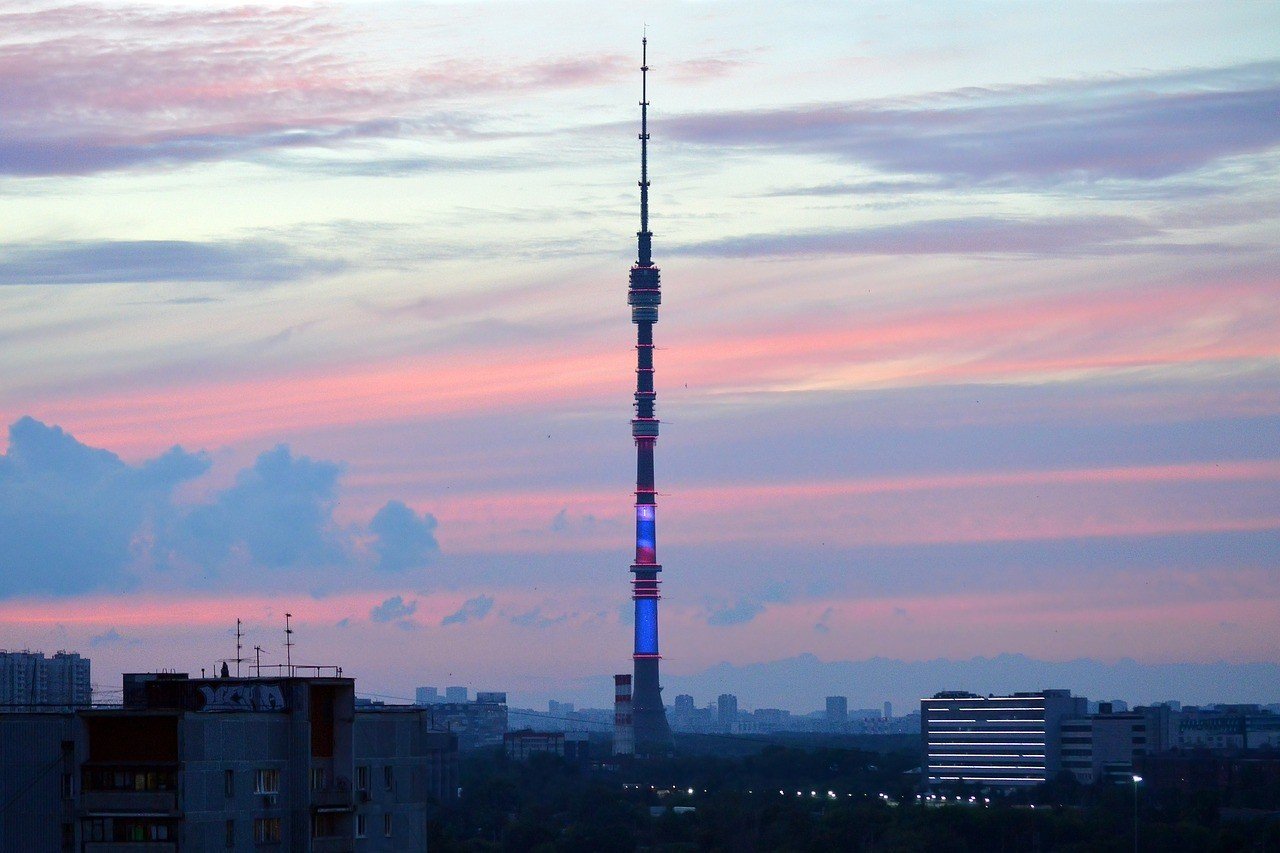
It takes just 58 seconds for visitors to reach the Tower’s observation deck by super fast elevator. The tower is open every day for long hours and is a great site in Moscow to check out! There is even a restaurant at the top where you can enjoy rotating views of the city while you dine on traditional Russian cuisine or European cuisine!
The tower is somewhat of an architectural surprise in a city that is not known for skyscrapers! To see the city from a new perspective, make sure to add this stop to your Moscow itinerary!
Izmaylovo District
- The most popular attractions in this district are the kremlin and the flea market
- Outside of the city center and easy to reach via metro
- Most popular during the summer and on weekends
Travel outside the city center and discover a unique area of the city! The Izmaylovo District is a popular destination for locals and tourists alike, and one of the coolest places to see in Moscow! The two main attractions we recommend checking out are the Kremlin and the flea market.
The Izmailovo Kremlin was established as a cultural center and molded after traditional Russian architecture. This colorful complex is home to several single-subject museums, including a Russian folk art museum and a vodka museum!
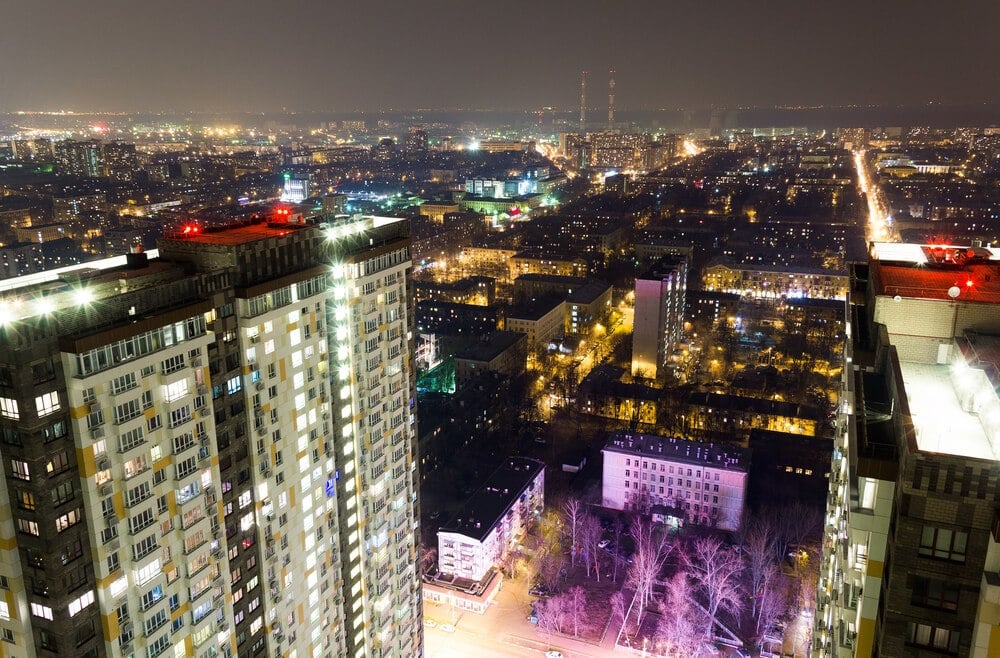
Next to the Kremlin is the Izmailovo open-air market, which dates back to the 17th century! The market is connected to the Izmailovo Kremlin by a wooden bridge. Pick up all your Russian souvenirs here, including traditional handicrafts, paintings, books, retro toys, and Soviet memorabilia!
You will find many hand-made and hand-painted options available at higher prices, as well as mass-produced souvenir options at lower prices!
Museum of Soviet Arcade Games
- Closed on Mondays
- Filled with old arcade games that visitors get to try out!
- The museum also includes a small cafe and burger shop
For something a little different, check out the Museum of Soviet Arcade Games! The museum features roughly 60 machines from the Soviet era, including video games, pinball machines, and collaborative hockey foosball! The machines inside the museum were produced in the USSR in the mid-1970s.

The best part is, most of the games are still playable! Purchase tickets and try the games out for yourself! The museum also has a neat little screening room that plays old Soviet cartoons and an area with Soviet magazines! This unique attraction is a fun addition to a 3 day itinerary in Moscow, and an attraction that all ages will enjoy!
Whether you’re spending one day in Moscow, or more, safety is an important thing to keep in mind when traveling to a big city! Overall, Moscow is a very safe place to visit. However, it is always recommended that tourists take certain precautions when traveling to a new destination!
The police in Moscow is extremely effective at making the city a safe place to visit and do their best to patrol all of the top Moscow, Russia tourist attractions. However, tourists can still be a target for pickpockets and scammers.
Moscow has a huge flow of tourists, therefore there is a risk for pickpocketing. Simple precautions will help eliminate your chances of being robbed. Stay vigilant, keep your items close to you at all times, and don’t flash your valuables!
If you’re planning a solo Moscow itinerary, you should have no need to worry, as the city is also considered safe for solo travelers, even women. Stay in the populated areas, try and not travel alone late at night, and never accept rides from strangers or taxis without a meter and correct signage.
The threat of natural disasters in Moscow is low, with the exception of severe winters when the temperature can dip below freezing! Bring a good, warm jacket if you visit in Winter.
However, please note that Russian views on homsexuality are far less accepting than those in Western Europe. Likewise, Non-Caucasian travellers may sadly encounter racism in Russia .
Don’t Forget Your Travel Insurance for Moscow
ALWAYS sort out your backpacker insurance before your trip. There’s plenty to choose from in that department, but a good place to start is Safety Wing .
They offer month-to-month payments, no lock-in contracts, and require absolutely no itineraries: that’s the exact kind of insurance long-term travellers and digital nomads need.

SafetyWing is cheap, easy, and admin-free: just sign up lickety-split so you can get back to it!
Click the button below to learn more about SafetyWing’s setup or read our insider review for the full tasty scoop.
Now that we’ve covered all the top things to see in Moscow, we thought we’d include some exciting day trips to other areas of the country!
Sergiev Posad (Golden Ring)
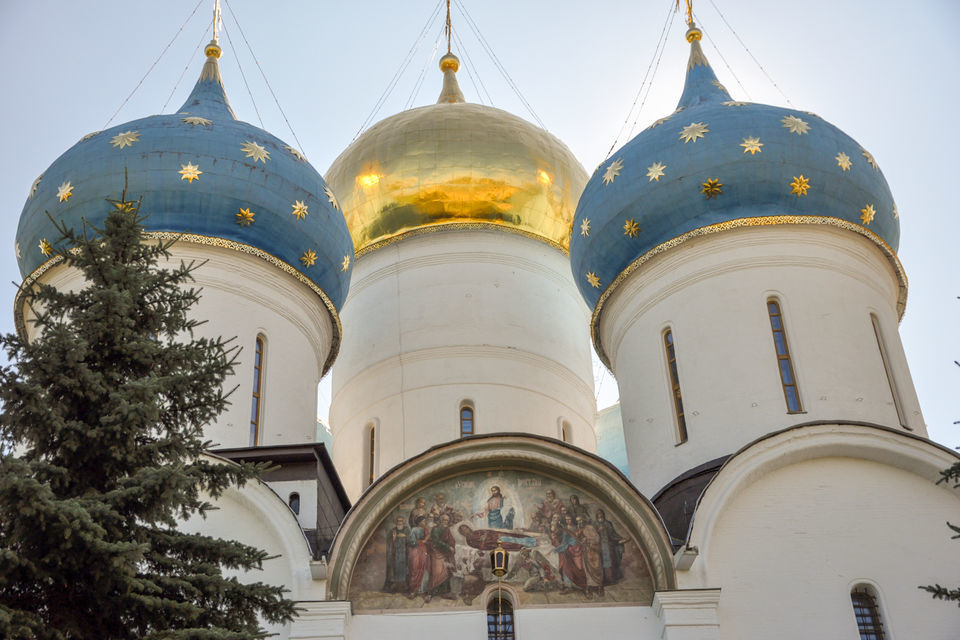
On this 7-hour guided tour, you’ll visit several scenic and historic areas of Russia. Start your day with hotel pick-up as you’re transferred by a comfortable car or minivan to Sergiev Posad. Admire the charming Russian countryside on your drive and enjoy a quick stop to visit the Russian village, Rudonezh!
You’ll see the majestic Saint Spring and the Church of Sergiev Radonezh. You’ll also visit the UNESCO World Heritage Site, Trinity Lavra of St. Sergius, one of the most famous Orthodox sites in Russia!
Lastly, you’ll swing by the local Matreshka market and enjoy a break in a nice Russian restaurant before returning to Moscow!
Day Trip to Vladimir and Suzdal
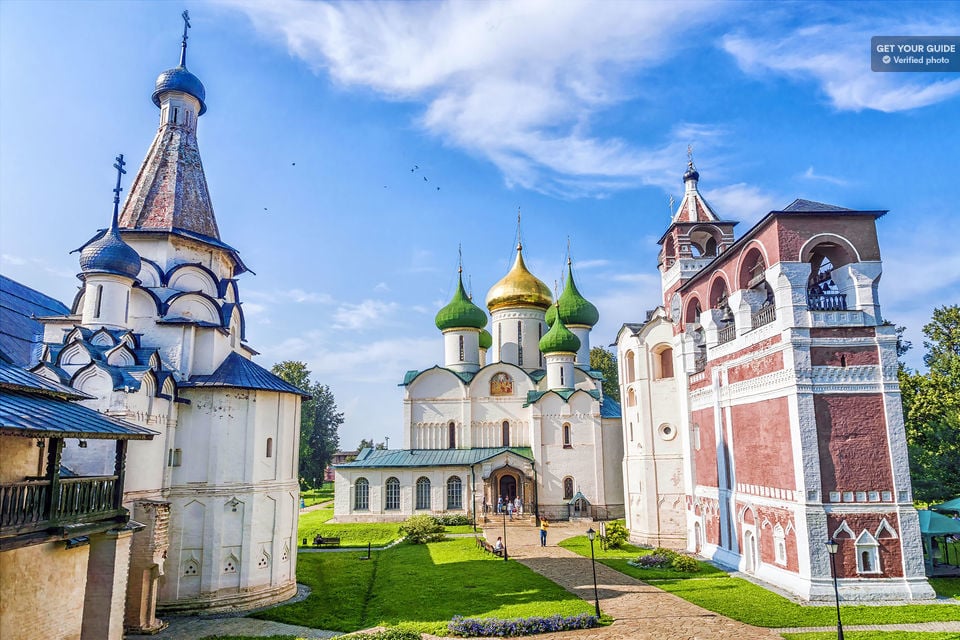
On this 13-hour trip, you’ll discover old Russia, with its picturesque landscapes and white-stoned beautiful churches! You’ll visit the main towns of the famous Golden Ring of Russia – the name for several cities and smaller towns north-east of Moscow.
Your first stop will be in the town of Vladimir, the ancient capital of all Russian principalities. The city dates back to the 11th century and is one of the oldest and the most important towns along the Ring! Next, you’ll visit Suzdal, a calm ancient Russian town north of Vladimir with only 13,000 inhabitants!
The old-style architecture and buildings of Suzdal are kept wonderfully intact. If you’re spending three days in Moscow, or more, this is a great option for exploring the charming areas outside the city!
Zvenigorod Day Trip and Russian Countryside
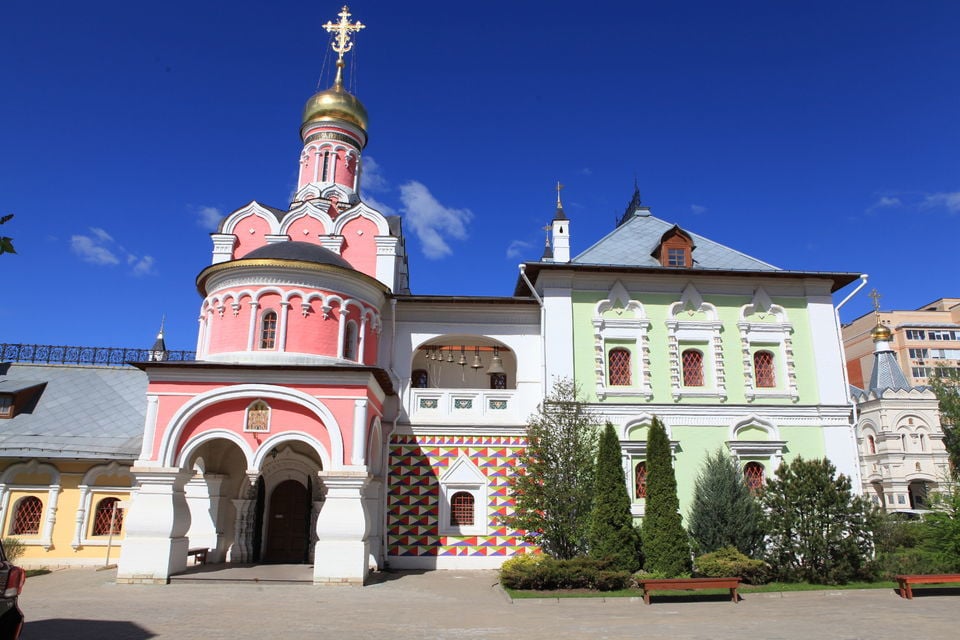
On this 9-hour private tour, you’ll explore the ancient town of Zvenigorod, one of the oldest towns in the Moscow region! As you leave Moscow you’ll enjoy the stunning scenery along the Moscow River, and make a few stops at old churches along the way to Zvenigorod.
Upon arrival, you’ll explore the medieval center, including the 14th-century Savvino-Storozhevsky Monastery. Next, you’ll take a break for lunch (own expense) where you’ll have the chance to try out the Russian cuisine! Next, you’ll visit the Museum of Russian Dessert and sip on tea at a Russian tea ceremony.
The final stop of the day is at the Ershovo Estate, a gorgeous place to walk around and enjoy nature!
Day Trip to St Petersburg by Train visiting Hermitage & Faberge

On this full-day tour, you’ll enjoy a a full round trip to St Petersburg where you’ll spend an exciting day exploring another popular Russian city! You’ll be picked up from your hotel in Moscow and be transferred to the train station where you’ll ride the high-speed train ‘Sapsan’ to St Petersburg.
Upon arrival, you’ll start the day by touring the Hermitage Museum and the Winter Palace. Next, you’ll visit the Faberge Museum, where you’ll explore the impressive collection of rare Faberge Eggs! In the afternoon, enjoy a sightseeing boat ride and a traditional 3-course Russian lunch.
If you’re spending 3 days in Moscow, or more, this is an excellent trip to take!
Trip to Kolomna – Authentic Cultural Experience from Moscow
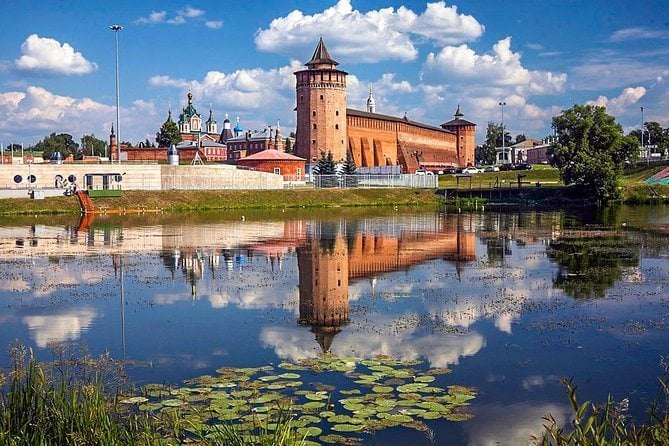
On this 10-hour tour, you’ll escape the city and travel to the historic town of Kolomna! First, you’ll visit the 14th-century Kolomna Kremlin, home to the Assumption Cathedral and an abundance of museums!
Next, enjoy lunch at a local cafe (own expense) before embarking on a tour of the Marshmallow Museum – of course, a marshmallow tasting is provided! Your final stop is the Museum of Forging Settlements, where displays include armor and accessories for fishing and hunting.
Discover this beautiful Russian fairytale city on a private trip, where all of the planning is taken care of for you!

Stash your cash safely with this money belt. It will keep your valuables safely concealed, no matter where you go.
It looks exactly like a normal belt except for a SECRET interior pocket perfectly designed to hide a wad of cash, a passport photocopy or anything else you may wish to hide. Never get caught with your pants down again! (Unless you want to…)
Find out what people want to know when planning their Moscow itinerary.
How many days you need in Moscow?
We recommend that you spend at least two or three days in Moscow to take it all in.
What’s the best month to visit Moscow?
The best time to visit Moscow is over the spring, from March to May as temperatures are mild, crowds are thin and prices are reasonable.
What are some unusual things to do in Moscow?
I mean, queuing up to see an almost 100 year old corpse is pretty unsual! Check out Lenin’s Mausoleum if you fancy it!
What are some fun things to do in Moscow?
The Memorial Museum of Cosmonautics is a fun place to explore the famous space race from the perspective of the ‘other side’!
We hope you enjoyed our Moscow itinerary! We’ve made sure to cover all the Moscow must-sees as well as some unique attractions in the city! Our addition of insider tips, favorite food stops, and day trips from Moscow is an added bonus and will guarantee you make the most out of your exciting Russian vacation!
Immerse yourself in the modern and traditional Russian lifestyle! Get lost in museums, witness awe-inspiring architecture, and indulge in Russian cuisine! Spend the day strolling through all of the charming sites of Moscow, admiring the beautiful scenery and discovering the city’s fairytale-like enchantment!

And for transparency’s sake, please know that some of the links in our content are affiliate links . That means that if you book your accommodation, buy your gear, or sort your insurance through our link, we earn a small commission (at no extra cost to you). That said, we only link to the gear we trust and never recommend services we don’t believe are up to scratch. Again, thank you!
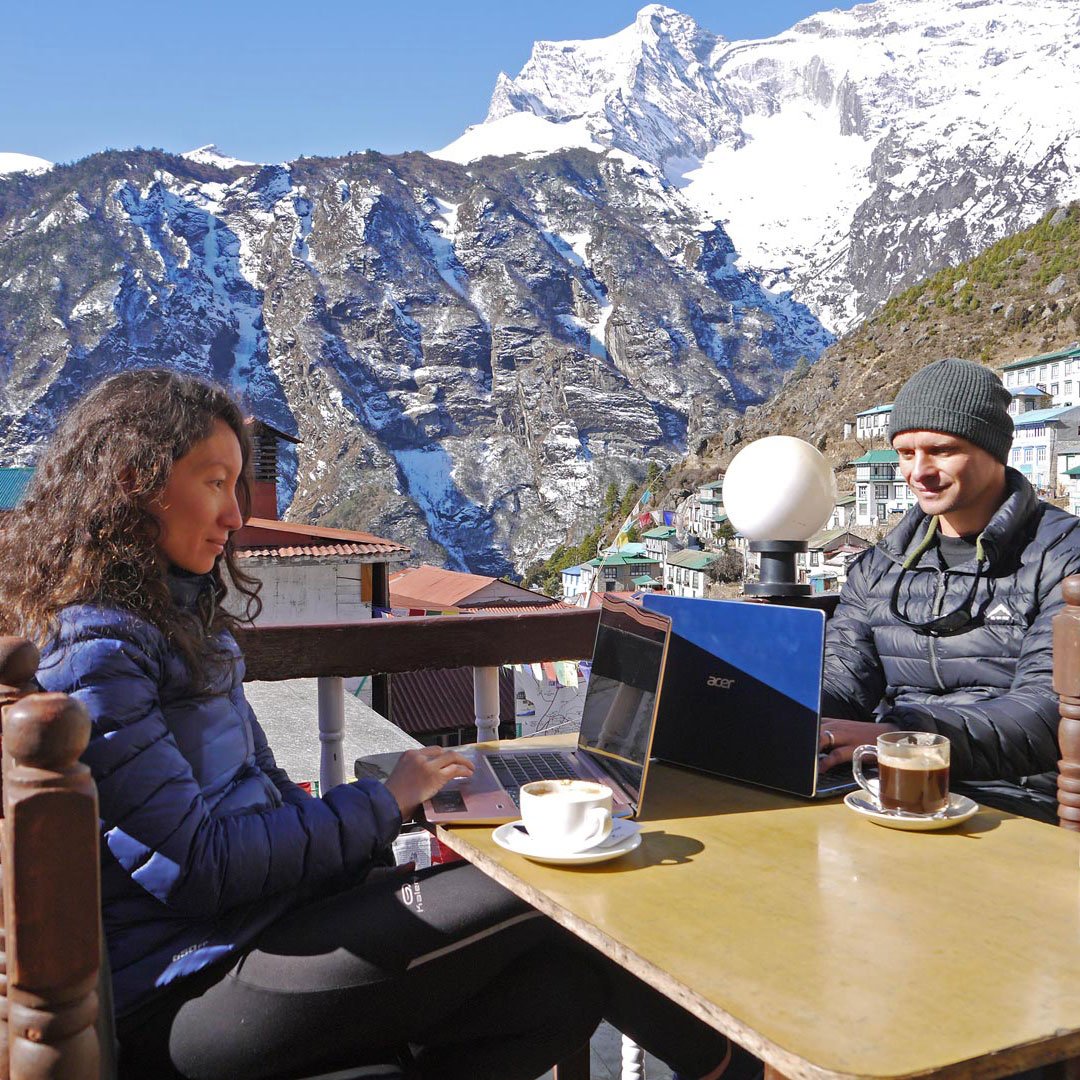
Alya and Campbell

Share or save this post

Leave a Reply Cancel reply
Your email address will not be published. Required fields are marked *
Save my name, email, and website in this browser for the next time I comment.
Notify me of followup comments via e-mail.

Search Smartraveller

Latest update
We continue to advise:
Do not travel to Russia due to the security situation and the impacts of the military conflict with Ukraine.

Russia (PDF 2.04 MB)
Europe (PDF 2.62 MB)
Local emergency contacts
All emergency services, fire and rescue services, medical emergencies, advice levels.
Do not travel to Russia.
Do not travel to Russia due to the dangerous security situation and the impacts of the military conflict with Ukraine.
Do not travel to North Caucasus.
Do not travel to North Caucasus due to the high threat of terrorism and political unrest.
See Safety .
- There's an ongoing threat of terrorism. Terrorist groups, including al-Qaeda and Daesh-aligned groups, continue to call for attacks in Russia. Attacks can be indiscriminate and may occur on or around seasonal, festive, or religious events in public places and could include popular tourist sites. Attacks may occur with little or no warning. Always be alert to possible threats and have a clear exit plan. On 23 March, there was a terrorist attack at Crocus City Hall in Moscow, resulting in significant loss of life.
- Security incidents, such as drone attacks and explosions, often occur in southern and western areas of Russia, including regions bordering Ukraine, Moscow, and St Petersburg. This can cause significant flight delays and travel disruption. You shouldn't attempt to travel to the Russia-Ukraine border or cross into Ukraine from Russia.
- The security situation could deteriorate further with little warning. If you're in Russia, leave immediately using the limited commercial options available or private means if it's safe to do so. Departure routes from Russia may become disrupted at short notice, so have an alternate exit plan.
- If you decide to stay in Russia, review your personal security plans. You're responsible for your own safety and that of your family. Our ability to provide consular assistance in Russia is limited. The Australian Government will not be able to evacuate you from Russia.
- There are limited transportation options, restrictions on financial transactions and possible shortages of essential products and services.
- The Russian Government has introduced a 'medium response level' in several regions of Russia, including Krasnodar, Belgorod, Bryansk, Voronezh, Kursk, and Rostov and a 'heightened preparedness level' in the remainder of the Central and Southern Federal districts. A basic readiness level covers the rest of Russia. There may be an increase in security personnel and installations. Security measures or restrictions may be introduced with little to no notice. Monitor the media for developments.
- Russian authorities have made strong, negative comments in relation to Western countries. Local authorities may adopt a more negative attitude towards foreigners in Russia in reaction to perceived support for Ukraine and sanctions on Russia. Non-participating bystanders can draw scrutiny from security forces and have been detained. Remain vigilant, avoid protests or demonstrations and avoid commenting publicly on political developments.
- Continue to follow the advice on Smartraveller. If you have significant concerns for your welfare or that of another Australian, contact the Consular Emergency Centre on 1300 555 135 in Australia or +61 2 6261 3305 outside Australia.
Full travel advice: Safety
- Laws about the import and use of medicines are strict. You need a doctor's letter and a notarised translation confirming your need for each medication that contains restricted substances. Contact the Embassy of Russia for details.
- Rabies and tick-borne encephalitis are on the rise. Ticks are common from April to October. Take care when travelling through forests.
- Infectious diseases such as typhoid, hepatitis, diphtheria, measles and tuberculosis are a risk. Boil drinking water or drink bottled water.
- Public medical facilities in Russian cities are below Australian standards and basic in rural areas.
Full travel advice: Health
- Russia may subject males it regards as Russian to mobilisation, regardless of any other citizenship held. Laws introducing heavy penalties for 'crimes against military service' have been passed. The Australian Government won't be able to intervene if you're subjected to mobilisation.
- Conscription occurs regularly in Russia. The Government may subject males it regards as Russian to mandatory conscription, regardless of any other citizenship held. From 1 January 2024, the maximum age of conscription will change from 27 to 30 years old. Russian authorities have also passed laws allowing for the draft notice to be serviced to the conscripts online, preventing conscripts from leaving the country once the notice is registered and sent.
- Russia has passed laws that severely inhibit free speech related to the current situation, imposing severe restrictions on the publishing and distribution of information related to the Russian armed forces and any military operations. Foreign journalists and other media workers in Russia may face considerable risks, including arrest and imprisonment. Don't share or publish information related to the current events in Ukraine and Russia.
- Russian authorities may enforce local laws in an arbitrary manner. You may be interrogated without cause by Russian officials and may become a victim of harassment, mistreatment, and extortion.
- Don't use or carry any illegal drugs. Penalties are severe. Carry your passport, visa and migration card at all times. Authorities won't accept copies.
- Don't take photos of military places or sensitive areas, such as passport control. It's also illegal to use commercial film, television, camera equipment or drones in public without permission. Hand-held video cameras are legal.
- Russia doesn't recognise dual nationals. We can only provide limited consular assistance to dual nationals who are arrested or detained. You'll need a valid Russian passport to leave.
- Same-sex relationships are technically legal but are not widely accepted. Violence against members of the LGBTI community occurs. Russia's parliament passed a law banning "LGBT propaganda", criminalising any act regarded as an attempt to promote what Russia calls "non-traditional sexual relations". The promotion of LGBTI issues may be considered illegal by local authorities, and activists may face consequences under Russian law. In July 2023, the Russian President signed a decree banning gender changes without medical requirements. The law also annuls marriages in which one person "changed gender" and prevents transgender couples from adopting children.
- Law enforcement agencies in Russia cooperate closely with agencies in the Commonwealth of Independent States (CIS) countries. If you commit an offence in one of these countries, you may be detained in another (including at the border) and extradited for prosecution.
Full travel advice: Local laws
- If you're in Russia, leave immediately using the limited commercial options available or private means if it's safe to do so. The security situation could deteriorate further with little warning. If you decide to stay in Russia, review your personal security plans. You're responsible for your own safety and that of your family. Have an alternate exit plan.
- Confirm with your transport operator that services are still operating if you plan to depart Russia. Commercial travel routes between Russia and Europe are often disrupted due to measures taken in response to military action in Ukraine. Several Russian airports are now closed to the public, disrupting internal flights to and from Moscow and other cities. The train and bus service between St Petersburg and Helsinki is suspended.
- If you're travelling through an overland border crossing into Estonia or Latvia , confirm the entry requirements for your destination before arrival. Finland has closed border crossings with Russia indefinitely and maritime borders will close on 15 April. Latvia introduced an entry ban on vehicles registered in Russia in September 2023. There's a ban on vehicles crossing into/from Estonia at the Ivangorod- Narva crossing. Train service is also suspended. Entry and exit on foot will still be allowed. Additional restrictions or entry requirements could be imposed or changed suddenly. Be aware that some borders may close without notice. Australia and other countries have placed sanctions on Russia. Russia's response to these sanctions may disrupt travel and affect travellers.
- Russian airlines and railways may be affected by shortages of parts and essential technical components for their fleets, affecting maintenance and safety standards. Research your railway and aviation provider before choosing their services. The International Civil Aviation Organisation has issued a Significant Safety Concern (or 'red flag') notice regarding the capacity of Russian airlines to oversee safety.
- If, despite our advice, you decide to enter Russia, expect thorough security checks at the border, including questioning and inspections of electronic devices. Entry requirements can change at short notice. Contact your airline or the nearest embassy or consulate of Russia to confirm entry requirements.
- Bank cards issued outside of Russia don't work in Russia. You won't be able to access funds from these cards once you enter Russia. You may not be able to exchange Australian dollars as well as old, worn, or damaged US dollar and euro banknotes into Russian rubles in Russia. Ensure you have enough money to cover your stay.
- Dual nationals can't leave Russia without a valid Russian passport. If your Russian passport expires while you're in Russia or if you enter Russia using a repatriation certificate, you'll need to get a new Russian passport before you leave. This can take up to 3 months. The Australian Government won't be able to intervene or fast-track this process.
Full travel advice: Travel
Local contacts
- The Consular Services Charter details what we can and can't do to help you overseas.
- For consular help, contact the Australian Embassy in Moscow. Our ability to provide consular assistance in Russia is limited due to the evolving security situation. The Australian Government will not be able to evacuate you from Russia.
- The Australian Consulate in St Petersburg can provide limited help.
- If you have significant concerns for your welfare or that of another Australian, contact the Consular Emergency Centre on 1300 555 135 in Australia or +61 2 6261 3305 outside Australia.
Full travel advice: Local contacts
Full advice
Terrorists are very likely to try to carry out attacks in Russia. Terrorist groups, including al-Qaeda and Daesh-aligned groups, continue to call for attacks in Russia. Attacks can be indiscriminate and may occur on or around seasonal, festive, or religious events in public places and could include popular tourist sites. Attacks may occur with little or no warning. Always be alert to possible threats and have a clear exit plan. Russia has seen a number of terrorist attacks which have caused large casualty numbers. On 23 March, there was a terrorist attack at Crocus City Hall in Moscow, resulting in significant loss of life. Russia's aviation has also been targeted.
Russian authorities continue to announce arrests and the disruption of planned attacks.
Terrorists have attacked other European cities. Targets have included:
- places of worship
- government buildings
- shopping areas
- tourist sites
- restaurants
- entertainment venues
- transportation hubs
- major events which attract large crowds
To protect yourself from terrorism:
- be alert to possible threats, especially in public places
- be extra cautious around possible terrorist targets
- always have a clear exit plan
- report anything suspicious to the police
- monitor the media for any new threats
- take official warnings seriously and follow the instructions of local authorities
If there's an attack, leave the area as soon as it's safe. Avoid the affected area in case of secondary attacks.
Terrorism is a threat worldwide.
More information:
North Caucasus
There's a high threat of terrorism in parts of the North Caucasus, including:
- North Ossetia
- the south-eastern part of Stavropol bordering Chechnya
- Karbardino-Balkaria
- Karachay-Cherkessia
Terrorist attacks continue to occur in Chechnya. Several people have been killed and injured.
Our ability to provide consular assistance to Australians in those parts of the North Caucasus is limited.
If, despite our advice, you travel to these parts of the North Caucasus:
- monitor local conditions via media and travel operators
- arrange personal security measures
Georgia-Russia border
The Georgia-Russia border area is volatile because of tensions in Georgia.
If, despite our advice, you travel in the border region, read our Georgia travel advice .
Security situation
Security incidents, such as drone attacks and explosions, often occur in southern and western areas of Russia, including regions bordering Ukraine, Moscow, and St Petersburg. This can cause significant flight delays and flight cancellations. You shouldn't attempt to travel to the Russia-Ukraine border or cross into Ukraine from Russia.
The security situation could deteriorate further with little warning. If you're in Russia, leave immediately using the limited commercial options available or private means if it's safe to do so. Departure routes from Russia may become disrupted at short notice. If you decide to stay in Russia, review your personal security plans. You're responsible for your own safety and that of your family.
The Russian Government has introduced a 'medium response level' in several regions of Russia, including Krasnodar, Belgorod, Bryansk, Voronezh, Kursk, and Rostov and a 'heightened preparedness level' in the remainder of the Central and Southern Federal districts. A basic readiness level has been introduced in the rest of Russia. There may be an increase in security personnel and installations. Security measures or restrictions may be introduced with little to no notice. Monitor the media for developments.
Ukraine border areas and Crimea
The Russia-Ukraine border is volatile due to the Russian invasion of Ukraine.
Security incidents regularly occur in Belgorod, Bryansk, Kursk and other regions of Russia bordering Ukraine, including explosions and large fires. The security situation in the region could deteriorate at short notice. You shouldn't travel to the Russia-Ukraine border or cross into Ukraine from Russia.
We currently advise you do not travel to Ukraine due to the volatile security environment and military conflict. Read the Ukraine travel advice for more information.
The Australian Government doesn't recognise Russia's claimed annexation of the Ukrainian region of Crimea or its other territorial claims in occupied Ukraine.
Leaving Russia
Where it's safe to do so, you should leave Russia immediately. Use your judgment to decide the best time and safest means of exit.
Transport routes may be disrupted. Plan for delays at land border crossings. Expect disruption to travel and changes at short notice. Make sure you have an adequate supply of food, water, medication and fuel. Make sure you have payment options that will work during your journey and at your destination.
Read your destination's travel advice to ensure you meet the entry requirements. These may differ when entering by road, rail or air. Be aware that some borders may close without notice. Commercial travel routes between Russia and Europe have been impacted by measures taken in response to the Russian invasion of Ukraine. Check with your airline or travel agent for current flight availability. Any travel options you pursue are at your own risk. See ' Travel '
For more information on entry requirements for countries bordering Russia, read the travel advice:
The European Union also has a website with information on travel restrictions for people seeking to enter member states .
If you decide to stay in Russia:
- follow the instructions of authorities
- ensure your travel documents are up-to-date, and keep your passport and other travel documentation safe
- contact your family and friends in Australia so they're aware of your location and situation
- keep up to date with developments on the security situation, monitor reputable media, and regularly check our travel advice and social media
- review your personal security plans and make contingency plans to leave as soon as you judge it safe to do so
- always be alert and aware of your surroundings
- avoid large gatherings and areas with groups of fighters and military equipment.
Civil unrest and political tension
Russia's parliament has passed laws that severely restrict free speech related to the current situation. Foreign journalists and other media workers in Russia may face considerable risks, including arrest and imprisonment.
While the effects of this law are still unclear, you may be detained or fined for:
- sharing or publishing information that local authorities deem false
- sharing or publishing information that may be detrimental to the armed forces
- calling for, sharing or publishing speech in support of sanctions against Russia
You should not:
- share or publish information related to the current events in Ukraine and Russia
- participate in demonstrations and large gatherings
Russian authorities may adopt a more negative attitude towards foreigners in Russia due to perceived support for Ukraine and sanctions on Russia. Russian authorities may enforce local laws in an arbitrary manner. You may be interrogated without cause by Russian officials and may become a victim of harassment, mistreatment, and extortion.
Avoid commenting publicly on political developments.
Anti-war and anti-mobilisation protests have taken place in cities across Russia over the invasion of Ukraine. Many protesters have been arrested.
Unsanctioned protests are illegal, and you can be arrested if you participate. Remain vigilant and avoid rallies, protests, demonstrations and other large public gatherings, as they can turn violent, and you may be arrested.
- Demonstrations and civil unrest
Theft and assault
Petty crime, pickpocketing and mugging is common. Groups of children sometimes commit crimes, too.
Hot spots for crime include:
- the Izmailovsky Market
- other tourist attractions
- the Moscow and St Petersburg metros
Thieves often steal passports. They target travellers in robberies and assaults , particularly in large cities.
To protect yourself from theft and assault:
- keep your personal belongings close, particularly in tourist areas
- be aware of your security in public places, particularly at night
- monitor local media on crime
- racially or religiously motivated assaults may occur throughout Russia.
Drink spiking
Criminals may drug and rob travellers at nightclubs and bars. Sometimes this happens after people accept offers of food, drink or transportation from strangers.
To protect yourself from spiking-related crime:
- never accept food or drinks from strangers
- don't leave drinks unattended
- leave your drink if you're not sure it's safe
- stick with people you trust in bars, nightclubs and taxis
- don't accept offers of transport from strangers
- Partying safely
Using taxis
People have reported extortion and robbery while taking unauthorised taxis.
To protect yourself from robbery while travelling in taxis:
- only use official taxi companies
- always book your taxi in advance
- don't flag down taxis on the street
- don't share taxis with strangers
- always negotiate and confirm the fare before you get in a taxi
Credit card and ATM fraud
Credit card and ATM fraud is common.
To protect yourself from fraud:
- only exchange currency at banks
- keep your credit card in sight during transactions
- only use ATMs inside banks and during business hours
- always hide your PIN
Other scams
Criminals may try to cheat you by changing money in the street or a bank queue.
Some Australians have been victims of fraud by bogus internet friendship, dating and marriage schemes operating from Russia.
These are large-scale, well-organised scams .
Criminals arrange to meet people through internet dating schemes or chat rooms. After getting to know each other, the criminal asks the Australian to send money so they can travel to Australia. However, the relationship ends after the money has been received, and the funds can't be recovered.
Be wary of people you meet through internet dating schemes or chat rooms.
People have also reported harassment, mistreatment and extortion by police and other local officials.
If you suspect you're being extorted by a police officer or other local official, offer to walk with them to the nearest police station. Once there, you can check their identity and their demands.
Cyber security
You may be at risk of cyber-based threats during overseas travel to any country. Digital identity theft is a growing concern. Your devices and personal data can be compromised, especially if you're connecting to Wi-Fi, using or connecting to shared or public computers, or to Bluetooth.
Social media can also be risky in destinations where there are social or political tensions or laws that may seem unreasonable by Australian standards. Travellers have been arrested for things they have said on social media. Don't comment on local or political events on your social media.
More information:
- Cyber security when travelling overseas
Kidnapping is common in parts of the Northern Caucasus.
It can be for:
- political purposes
- retribution
Foreigners have been targeted in the past.
If, despite the risks, you travel to an area where there is a particular threat of kidnapping:
- get professional security advice
The Australian Government's longstanding policy is that it doesn't make payments or concessions to kidnappers.
Climate and natural disasters
Severe weather during winter can disrupt travel in Russia.
To protect yourself from accidents caused by severe weather:
- take care when walking in snowy, icy or windy conditions
- take care when driving
- use appropriate driving equipment, such as winter tyres or chains
- monitor the media and other sources for updates
If you're delayed, contact local authorities about a visa extension if required.
In April, severe flooding affected multiple settlements across Russia in the South Urals region east of Moscow, in Western Siberia and near the Volga River.
Snow and ice
People are injured or killed yearly in wind, snow and ice-related accidents. These include:
- traffic accidents
- collapsed roofs and snow falling from roofs
- falling debris
- prolonged exposure to extreme cold
Slipping on ice can result in serious injuries, such as broken bones, back injuries or paralysis.
During summer, forest and peat fires can occur in Russia, including in the Moscow region.
Earthquakes and tsunamis
The North Caucasus and the far eastern region of Russia can experience earthquakes .
Tsunamis are common in all oceanic regions of the world.
To protect yourself from natural disasters, take official warnings seriously.
If a natural disaster occurs, follow the advice of local authorities.
Get updates on major disasters from the Global Disaster Alert and Coordination System .
Travel insurance
Most Australian travel insurance policies won't cover you for travel to Russia. Do not travel to Russia. See ' Safety '
If you're not insured, you may have to pay thousands of dollars up-front for medical care.
Physical and mental health
Do not travel to Russia. If, despite our advice, you travel to Russia, consider your physical and mental health before you travel, especially if you have an existing medical condition.
See your doctor or travel clinic to:
- have a basic health check-up
- ask if your travel plans may affect your health
- plan any vaccinations you need
Do this at least eight weeks before you leave.
If you have immediate concerns for your welfare or the welfare of another Australian, call the 24-hour Consular Emergency Centre on +61 2 6261 3305 or contact your nearest Australian Embassy, High Commission or Consulate to discuss counselling hotlines and services available in your location.
- General health advice (World Health Organization)
- Healthy holiday tips (Healthdirect Australia)
Medications
Not all medication available over the counter or by prescription in Australia is available in other countries. Some may even be considered illegal or a controlled substance, even if prescribed by an Australian doctor.
Russia has imposed temporary restrictions on exporting certain categories of goods, including foreign-made medical products.
If you plan to bring medication, check if it's legal in Russia. Take enough legal medication for your trip.
Russia has strict laws about the import and use of medications. This includes medications that are available over the counter in Australia, such as cold and flu tablets.
When you arrive in Russia, you must present a doctor's letter to authorities confirming your need for each medication. This is the case if your medications contain the following:
- barbiturate
- sibutramine
- anabolic steroids
- androgens and other sex hormones
- analgesic, such as tramadol
- psychostimulants
- other restricted substances
The letter must:
- contain a description of the medication, including the chemical composition
- describe the required dosage
- explain the underlying medical condition
- confirm the medicine is for personal use only
- be signed by your treating doctor
You must also have a notarised translation of the letter into Russian.
Before you leave Australia, contact the Embassy of Russia for the latest rules for bringing medicines into Russia.
- Russian Government website
Health risks
Tick-borne diseases.
Tick-borne encephalitis (World Health Organization) and other tick-borne diseases are a risk, especially if you travel through forested areas.
Ticks are common in rural areas from spring to autumn: April to October.
People have reported increased incidents of tick-borne encephalitis.
Measles cases can routinely occur in Russia, with the country currently experiencing increased measles activity. Make sure your vaccinations are up-to-date before you travel.
- Measles immunisation service (Department of Health and Aged Care)
Bird flu (avian influenza)
Avian influenza is a risk in Russia.
HIV/AIDS is a risk.
Take steps to reduce your risk of exposure to the virus.
There has been a reported increase in rabies across Russia.
Rabies is deadly. Humans can get rabies from mammals, such as:
- other animals
If you're bitten or scratched by a dog, monkey or other animal, get treatment as soon as possible.
Other health risks
Waterborne, foodborne, parasitic and other infectious diseases are common, including these listed by the World Health Organization:
- tuberculosis
Serious outbreaks sometimes occur.
To protect yourself from illness:
- drink boiled water or bottled water with sealed lids
- avoid ice cubes
- avoid uncooked and undercooked food, such as salads
- avoid unpasteurised dairy products
Get urgent medical attention if you have a fever or diarrhoea or suspect food poisoning.
Medical facilities
Public medical facilities in Russian cities are below Australian standards.
Standards are extremely basic in rural areas.
There are a few international-standard private facilities in major cities – these clinics can be very expensive to access.
Before you're treated, private facilities need either:
- up-front payment
- evidence of adequate insurance
- a written guarantee of payment
If you become seriously ill or injured, you'll need to be evacuated to get proper care. Medical evacuation can be very expensive.
You're subject to all local laws and penalties, including those that may appear harsh by Australian standards. Research local laws before travelling.
In July, the Russian President signed a decree banning gender changes, including gender transition surgery, hormone therapy and changing gender on official documents without medical requirements. The law also annuls marriages in which one person "changed gender" and prevents transgender couples from adopting children.
In November 2022, Russia's parliament passed a law banning "LGBT propaganda", criminalising any act regarded as an attempt to promote what Russia calls "non-traditional sexual relations". Sharing information or public display of any material promoting "non-traditional relationships" is now a serious criminal offence.
In November 2022, Russia announced that the partial mobilisation of military reservists for the conflict in Ukraine was complete. However, a decree formalising the completion has not been issued. The Russian Government may subject males it regards as Russian to mobilisation, regardless of any other citizenship held. Laws introducing heavy penalties for 'crimes against military service' have been passed. The Australian Government will not be able to intervene if you are subjected to mobilisation.
The US Government issued travel advice in March 2022 advising that Russian security services have arrested US citizens on spurious charges, singled out US citizens in Russia for detention and/or harassment, denied them fair and transparent treatment, and have convicted them in secret trials and/or without presenting credible evidence. The US Government warns that Russian officials may unreasonably delay consular assistance to detained US citizens.
Russian authorities have introduced criminal liability for publishing and distributing 'deliberately misleading' information about the Russian armed forces and any military operations. These laws have been interpreted and applied very broadly to many forms of dissent.
Law enforcement agencies in Russia cooperate closely with agencies in the Commonwealth of Independent States (CIS) countries. If you commit an offence in one of these countries, you may be detained in another (including at the border) and extradited for prosecution.
If you're arrested or jailed, the Australian Government will do what it can to help you under our Consular Services Charter . But we can't get you out of trouble or out of jail.
Russian authorities imposed restrictions on real estate and foreign currency transactions for foreign residents. These restrictions can be revised at short notice. Seek advice from local authorities.
Possessing, selling, consuming, or carrying any illegal drugs is illegal.
Penalties are severe and include long prison terms.
Russia has strict rules around medication carried into the country for personal use, including some medications that you can get over the counter in Australia.
If you don't declare restricted medications, authorities could detain you. See Health .
- Carrying or using drugs
Routine police checks are common in public places.
Carry your passport, visa and migration card with you at all times. Authorities won't accept copies.
If you can't provide travel documentation on request, authorities can detain and fine you.
In Russia, it's illegal to:
- take photos of military places, strategic sites and other sensitive areas, such as passport control and guarded railway sites
- use commercial film, television or camera equipment in public areas without permission, but hand-held home video cameras are allowed
- use drones without permission from the Russian aviation authority.
Penalties for breaching the law include fines, jail and deportation.
Russia regulates religious activity. Authorities restrict activities such as preaching and distributing religious materials.
If you plan to engage in religious activity, ensure you're not breaking local laws.
Contact the Embassy or Consulate of Russia for more information.
Cybersecurity laws
Russia has blocked or restricted some social media platforms and websites, including Facebook, Instagram, LinkedIn and Twitter.
Russia has banned certain Virtual Private Networks (VPN) and has indicated it will implement a nationwide ban on VPNs in March 2025.
- Cyber security when travelling overseas
- Federal Service for Supervision of Communications, Information Technology and Mass Media (Roskomnadzor)
Official documents
Some Australian documents, such as birth or marriage certificates, need to be legalised before Russian authorities will accept them.
If you have an Australian document that you need to use while in Russia, contact the Embassy or Consulate of Russia for information.
Apostilles and some legal certificates can be issued by:
- DFAT in Australia
- Australian embassies and high commissions overseas
Surrogacy laws
Russia has laws governing child surrogacy and has passed legislation banning surrogacy for all foreigners except those married to Russian citizens. Recent court cases have resulted in long custodial sentences for some providers of surrogacy services. All children born through surrogacy in Russia are granted Russian citizenship, regardless of their parent's citizenship.
Get independent legal advice before making surrogacy arrangements in Russia or with residents of Russia.
- Going overseas for international surrogacy
- Going overseas to adopt a child
Australian laws
Some Australian criminal laws still apply when you're overseas. If you break these laws, you may face prosecution in Australia.
- Staying within the law and respecting customs
Dual nationality
Russia doesn't recognise dual nationality.
In November 2022, Russia announced that the partial mobilisation of military reservists for the conflict in Ukraine was complete. However, a decree formalising the completion hasn't been issued. Russia may subject males it regards as Russian to mobilisation, regardless of any other citizenship held. Laws introducing heavy penalties for 'crimes against military service' have been passed. The Australian Government won't be able to intervene if you are subjected to mobilisation.
Conscription occurs regularly, and Russia may subject males it regards as Russian to mandatory conscription, regardless of any other citizenship held. Conscription in Russia occurs semi-annually, and conscripts typically serve one year. From 1 January 2024, the maximum conscription age will change from 27 to 30 years old. Russian authorities have also passed laws allowing for the draft notice to be serviced to the conscripts online and preventing conscripts from leaving the country once the notice is registered and sent.
Russian authorities won't recognise your Australian nationality if you're a dual national. They will treat you like any other national of Russia.
If you're a dual national:
- you must enter and leave Russia on a Russian passport
- you can enter Russia using a repatriation certificate (svidetelstvo na vozvrashcheniye) if you don't have a Russian passport, but you must still leave Russia on a Russian passport
- you must declare any other nationalities or foreign residency permits to the Russian Ministry of Internal Affairs
- you could be conscripted into the Russian military if you're a male between the ages of 18 and 30
If you're a dual national, this limits the consular services we can give if you're arrested or detained.
Contact the Embassy or Consulate of Russia well before any planned travel to Russia.
Dual nationals can't leave Russia without a valid Russian passport.
You'll need to get a new Russian passport before you leave if:
- your Russian passport expires while you're in Russia
- you enter Russia using a repatriation certificate
Getting a new Russian passport for non-residents is complex and can take up to 3 months. The Australian Government is unable to intervene or fast-track this process.
Children born outside Russia and added to their parents' Russian passports need their own passport to leave Russia.
If you're travelling alone with a child, Russian border authorities may require the following:
- documentary evidence of your relationship to the child
- written permission for the child to travel from the non-travelling parent
- Dual nationals
Local customs
Same-sex relationships are legal in Russia but not widely accepted.
Intolerance towards the LGBTI community is common, particularly outside Moscow and St Petersburg.
People have reported violence against members of the LGBTI community, including by local security forces.
In April 2017, there were reports of arrests and violence against LGBTI people in Chechnya.
In November 2022, Russia passed a law banning "LGBT propaganda", criminalising any act regarded as an attempt to promote what Russia calls "non-traditional sexual relations". Sharing or displaying material promoting "non-traditional relationships" is now a serious criminal offence. The bill broadens the existing law banning the promotion of 'non-traditional sexual relationships' to minors.
- Advice for LGBTI travellers
Visas and border measures
Every country or territory decides who can enter or leave through its borders. For specific information about the evidence you'll need to enter a foreign destination, check with the nearest embassy, consulate or immigration department of the destination you're entering.
Australia and other countries have placed sanctions on Russia. Russia's response to these sanctions may disrupt travel and affect travellers.
You need a visa to enter Russia unless you're travelling on certain commercial cruise ships.
You can't get a visa on arrival.
If you arrive in Russia without a valid visa, authorities will fine, detain and deport you at your own expense. They may bar you from re-entering.
Make sure you apply for the correct visa type, such as 'tourist' and 'visitor' visas.
If your visa type doesn't match the purpose of your visit, authorities may:
- not let you enter
You may need to provide biometric fingerprints for the visa application process.
After you get your Russian visa, check your passport details are correct, including the following:
- passport number
- date of birth
- intention of stay
- validity dates
If there are errors, return your passport to the Russian Embassy or Consulate for correction.
It's impossible to amend visa details once you're in Russia.
Australians sanctioned by Russia
The Russian Foreign Ministry issued statements on its website advising that, in response to Australian sanctions, the Russian Government had added several Australians to a 'stop list', denying them entry into Russia on an indefinite basis.
These statements can be viewed here (copy and paste the URL into a new browser if you can't open the link):
- 21 June 2023 statement - https://mid.ru/en/foreign_policy/news/1890258/
- 16 September 2022 statement - https://mid.ru/ru/foreign_policy/news/1830085/ (in Russian)
- 21 July 2022 statement - https://www.mid.ru/en/foreign_policy/news/1823204/
- 16 June 2022 statement - https://www.mid.ru/en/foreign_policy/news/1818118/
- 7 April 2022 statement - https://www.mid.ru/en/foreign_policy/news/1808465/
DFAT can't provide advice on the implications of another country's sanctions. If you're listed, you should obtain legal advice if you have concerns about the potential impacts of the Russian sanctions. Do not travel to Russia if you're on Russia's 'stop list'.
Discuss your travel plans with your cruise operator before you travel to check if you need a visa.
Check transit visa requirements if you transit through Russia to a third country.
- Russian Embassy
- Going on a cruise
Border measures
If, despite our advice, you decide to enter Russia, expect thorough security checks at the border, including questioning and inspections of electronic devices.
Entry and exit conditions can change at short notice. Contact the nearest embassy or consulate for details about visas, currency, customs and quarantine rules.
Other formalities
Migration card.
All foreign visitors receive a migration card on arrival in Russia.
If you receive a paper migration card, keep the stamped exit portion of the card with your passport.
The migration card covers both Russia and Belarus. You must show the stamped card to passport control when leaving either country.
If you lose your migration card:
- your departure could be delayed
- you could be stopped from staying at a hotel in Russia
You can get a replacement from the Russian Ministry of Internal Affairs, which is complex and could delay your departure.
Biometric fingerprinting
Foreign citizens entering Russia for work or intending to stay over 90 calendar days may be subject to biometric fingerprinting and regular medical check-ups. The procedure of biometric fingerprinting will need to be done only once. Medical check-ups will need to be re-taken upon the certificate's expiry (valid for 1 year).
Travel with children
If you're travelling with a child , you may need to show evidence of parental, custodial or permission rights. This is particularly the case for dual nationals. See Local laws
- Advice for people travelling with children
Electronics
The government strictly controls the import of electrical and some high-technology equipment.
The rules are complex.
You may import terminal global positioning systems (GPS) devices if you declare them on arrival. However, you'll need a special permit to import a GPS device connected to a computer or an antenna.
Authorities can detain you if you don't have a permit.
You must show proof of advanced approval to import a satellite phone. Request approval from the Federal Service for the Supervision of Communications .
Russian border officials can demand to inspect any electronic device, including installed software when you leave.
Travel between Russia and Belarus
Do not travel to Russia and Belarus due to the security environment and impacts of the Russian invasion of Ukraine. If you’re in Russia or Belarus, leave immediately using the limited commercial options available or private means if it's safe to do so.
If, despite our advice, you decide to enter Belarus from Russia, note that the government doesn't allow foreigners to cross the land border between Russia and Belarus.
If you travel between Russia and Belarus, it must be by air.
If you're travelling between Russia and Belarus, you must have visas for both countries.
Visa-free entry into Belarus doesn't apply to travellers arriving from or travelling to Russia.
Contact the Embassy of Russia and the Ministry of Foreign Affairs of Belarus for details.
Registering your stay in Russia
If you stay more than 7 working days, including your arrival and departure day, you must register with the Russian Ministry of Internal Affairs.
You have to pay a registration fee.
Most hotels do this for their guests, but you're legally responsible. Confirm with check-in staff on arrival that they've registered you.
The registration process can be complex if you're not staying at a hotel.
Register at the nearest post office if you're travelling on a visitor visa.
Register through your employer if you're travelling on a visa that lets you work. Confirm with your employer that they've registered you.
If you don't register, authorities can fine you or delay your departure.
- The Russian Embassy
Visa overstays
Make sure you leave Russia before your visa expires. Some visas, including tourist visas, can't be extended.
If you overstay your visa, you won't be allowed to leave Russia until the Russian Ministry of Internal Affairs determines your legal status or deports you.
Authorities can detain you until they've processed your case.
Penalties for overstaying include fines and deportation.
You may be banned from re-entering.
Exporting goods
Russia has imposed temporary restrictions on exporting certain categories of goods, including foreign-made medical products. Seek advice from local authorities.
Russia has strict regulations on the export of antiques, artworks and items of historical significance. This is for items purchased in Russia or imported to Russia from overseas. It includes modern art and posters if they are particularly rare or valuable.
Authorities may not allow the export of items more than 100 years old.
If you want to export any antiques, artworks or items of historical significance:
- keep receipts of your purchases
- obtain an export permit from the Ministry of Culture in advance of travel — export permits aren't issued at the airport
- declare each item to border authorities when you leave Russia
- be ready to show each item to border authorities
- be ready to show receipts for each item to border authorities
Don't try to export items requiring permits without the relevant paperwork. This is a serious offence.
Legislation about the export of artwork and antiques from Russia may change without warning.
Some countries won't let you enter unless your passport is valid for six months after you plan to leave that country. This can apply even if you're just transiting or stopping over.
Some foreign governments and airlines apply the rule inconsistently. Travellers can receive conflicting advice from different sources.
You can end up stranded if your passport is not valid for more than six months.
The Australian Government does not set these rules. Check your passport's expiry date before you travel. If you're not sure it'll be valid for long enough, consider getting a new passport .
Lost or stolen passport
Your passport is a valuable document. It's attractive to people who may try to use your identity to commit crimes.
Some people may try to trick you into giving them your passport. Always keep it in a safe place.
If your passport is lost or stolen, tell the Australian Government as soon as possible:
- In Australia, contact the Australian Passport Information Service .
- If you're overseas, contact the nearest Australian embassy or consulate .
If your passport is lost or stolen while ashore, you will need to obtain an emergency passport and an exit visa to leave Russia within the 72-hour visa-free period. If it’s not done within 72 hours, you will face a court hearing and possible fine, deportation and entry ban.
To arrange a new visa:
- obtain an official police report
- apply for a replacement passport through the Australian Embassy in Moscow
- apply to Russian authorities for an exit visa
- include the police report with your application
If you replace your passport while in Russia, make sure authorities transfer your visa to the new passport.
Passport with 'X' gender identifier
Although Australian passports comply with international standards for sex and gender, we can't guarantee that a passport showing 'X' in the sex field will be accepted for entry or transit by another country. Contact the nearest embassy, high commission or consulate of your destination before you arrive at the border to confirm if authorities will accept passports with 'X' gender markers.
More information:
- LGBTI travellers
The currency of Russia is the Rouble (RUB).
Russian authorities have imposed temporary restrictions on the export of foreign currency in cash out of Russia. Travellers exiting Russia can't take more than the equivalent of $US10,000 in cash.
Make sure a customs official stamps your declaration. Only stamped declarations are valid.
You must carry proof that your funds were imported and declared or legally obtained in Russia.
Due to the Russian invasion of Ukraine, Mastercard, Visa, and American Express have suspended operations in Russia. Cards issued outside of Russia will not work at Russian merchants or ATMs. Cards issued inside Russia may continue to work, but they won't work outside Russia. It may not be possible for you to access your funds through Russian banks or to make payments to Russian businesses with non-Russian credit/debit cards. Be prepared with alternate means of payment should your cards be declined.
You may not be able to exchange Australian dollars as well as old, worn or damaged US dollar and euro banknotes into Russian rubles in Russia. Ensure you have enough money to cover your stay in Russia.
Traveller's cheques aren't widely accepted, even in Moscow and St Petersburg.
Local travel
Postal services between Russia and Australia are temporarily suspended.
More information
- Australia Post website
Confirm with your transport operator that services are still operating if you plan to depart Russia. Commercial travel routes between Russia and Europe are disrupted. Expect thorough security checks at the border, including questioning and inspections of electronic devices.
Flights between Russia and Europe have been affected by measures taken in response to the Russian invasion of Ukraine. Several Russian airports are now closed to the public, disrupting internal flights to and from Moscow and other cities. The train and bus service between St Petersburg and Helsinki is suspended.
Finland has closed border crossings with Russia indefinitely and maritime borders will close on 15 April.
Latvia introduced an entry ban on vehicles registered in Russia in September 2023. More information can be found on the State Revenue Service website . There's a ban on vehicles crossing into/from Estonia at the Ivangorod-Narva crossing. Train service is also suspended. Entry and exit on foot will still be allowed. Additional restrictions or entry requirements could be imposed or changed suddenly. Be aware that some borders may close without notice.
If you're travelling through an overland border crossing into Estonia or Latvia , confirm the entry requirements for your destination before arrival.
Australia and other countries have placed sanctions on Russia. Russia's response to these sanctions may disrupt travel and affect travellers. Confirm entry requirements for your destination before arrival, as additional restrictions or entry requirements could be imposed or changed suddenly.
If, despite our advice, you decide to go to Chechnya or the North Caucasus, you must first get permission from the Russian Ministry of Internal Affairs.
Several other areas of Russia, especially in Siberia and the Russian Far East, are also 'closed' areas.
Foreigners need government permission to enter 'closed' areas.
If you need government permission or are unsure if you need it, contact the Russian Ministry of Internal Affairs.
Driving permit
You should carry an International Driving Permit (IDP).
You may drive with an Australian driver's license if you carry it with a notarised Russian translation.
Road travel
Driving in Russia can be hazardous due to:
- poor driving standards
- ice and snow in winter
- poor road conditions in rural areas
The blood alcohol limit for drivers is 0%.
- Driving or riding
- the Russian Embassy
Some taxis appear official but aren't licensed by local authorities.
People have reported extortion and robbery while taking unauthorised taxis. See Safety
Book an official taxi by phone, at major hotels and from inside airports.
Flights from Russia to other countries are limited. These may change or be suspended at short notice. You should contact airlines or travel agents directly for the most current information.
The EU announced that 21 Russian-owned airlines were banned from flying in EU airspace due to safety concerns.
Russian airlines and railways may be affected by shortages of parts and essential technical components for their fleets, affecting maintenance and safety standards. If you're flying domestically or internationally, research your aviation provider before choosing their services.
DFAT doesn't provide information on the safety of individual commercial airlines or flight paths.
Check Russia's air safety profile with the Aviation Safety Network
Emergencies
Depending on what you need, contact your:
- family and friends
- travel agent
- insurance provider
Always get a police report when you report a crime.
Your insurer should have a 24-hour emergency number.
Consular contacts
Read the Consular Services Charter for what the Australian Government can and can't do to help you overseas.
For consular help, contact the Australian Embassy in Moscow. Our ability to provide consular assistance in Russia is limited. The Australian Government will not be able to evacuate you from Russia.
Australian Embassy, Moscow
13 Kropotkinsky Pereulok Moscow 119034 Russia Phone: (+7 495) 956-6070 Fax: (+7 495) 956-6170 Website: russia.embassy.gov.au Twitter: @PosolAustralia
If you're in St Petersburg, you can also contact the Australian Consulate for limited consular help.
Australian Consulate, St Petersburg
Moika 11 St Petersburg 191186 Russia Tel: (+7 964) 333 7572 (NOT for visas) Email: [email protected] (NOT for visas)
Check the Embassy website for details about opening hours and any temporary closures.
24-hour Consular Emergency Centre
Australians in need of consular assistance should contact the Australian Government 24-hour Consular Emergency Centre:
- +61 2 6261 3305 from overseas
- 1300 555 135 in Australia

Travelling to Russia?
Sign up to get the latest travel advice updates..
Be the first to know official government advice when travelling.
- Bahasa Indonesia
- Slovenščina
- Science & Tech
- Russian Kitchen
Moscow-City: 7 surprising facts about the Russian capital’s business center
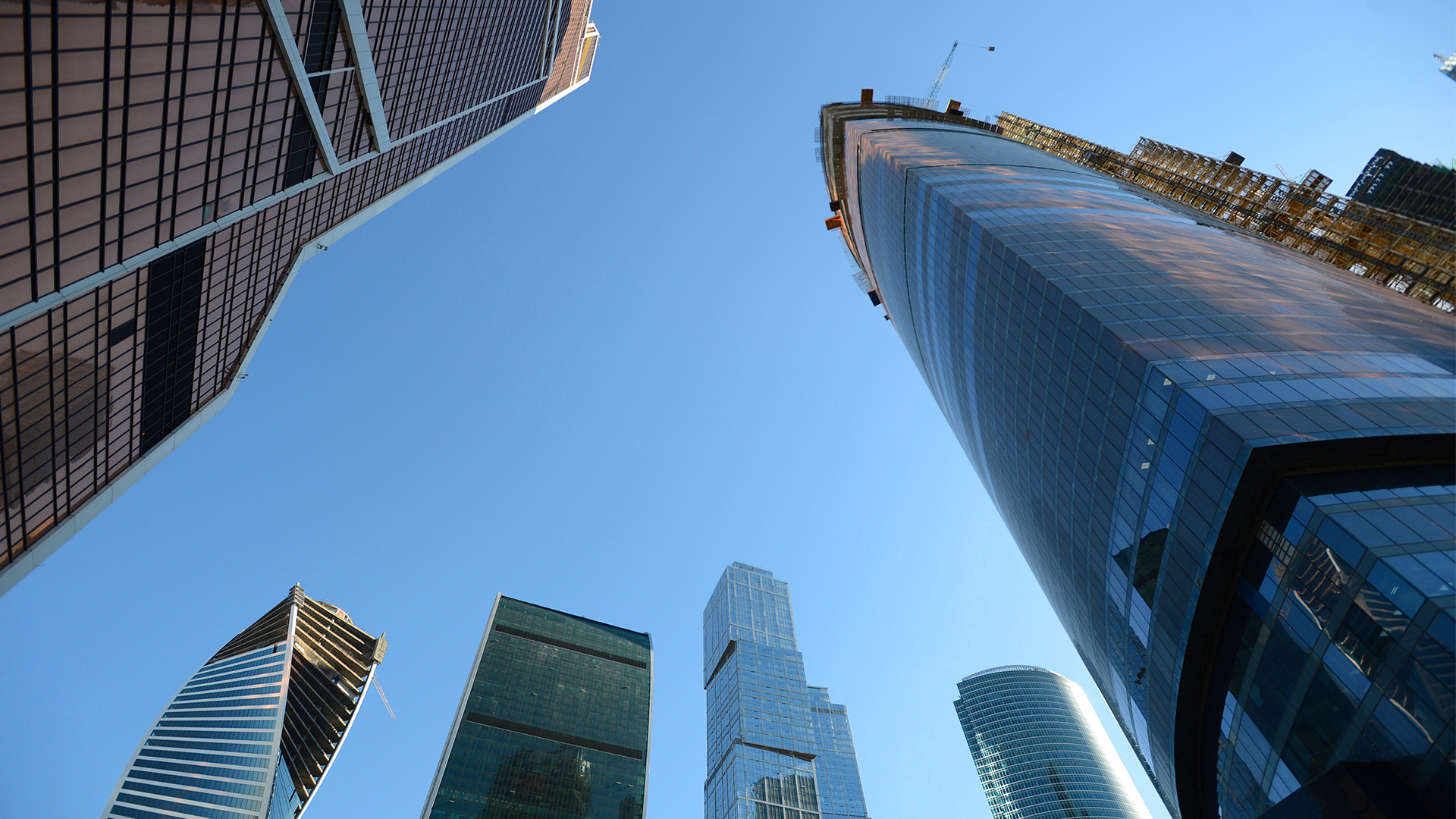
1. Guinness World Record in highlining
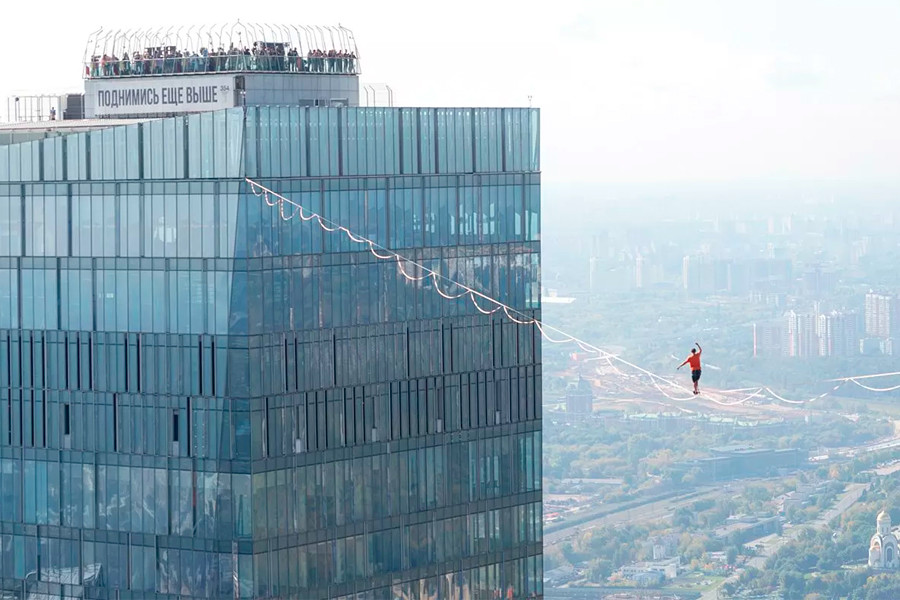
The record was set in 2019 by a team of seven athletes from Russia, Germany, France and Canada. They did it on September 8, on which the ‘Moscow-City Day’ is celebrated. The cord was stretched at the height of 350 m between the ‘OKO’ (“Eye”) and ‘Neva Towers’ skyscrapers. The distance between them is 245 m. The first of the athletes to cross was Friede Kuhne from Germany. The athletes didn't just walk, but also performed some daredevil tricks. Their record is 103 meters higher than the previous one set in Mexico City in December 2016.
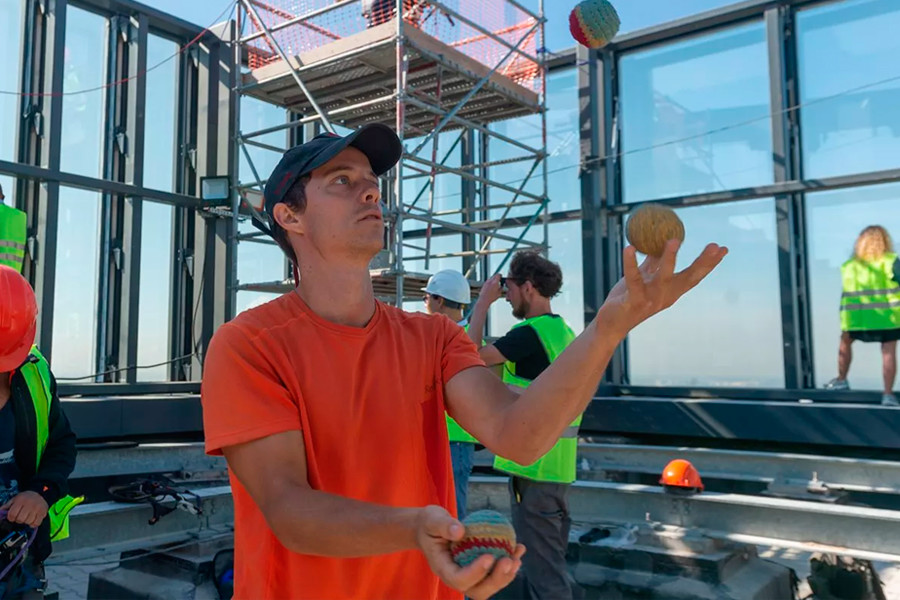
2. Domination of Europe's top-10 highest skyscrapers
7 out of 10 Europe’s highest skyscrapers are located in Moscow-City. Earlier, the ‘Federation Tower’ complex’s ‘Vostok’ (“East”) skyscraper was the considered the tallest in Europe.

Left to right: the lower of the ‘Neva Towers’ (296 m), Commerzbank Tower in Frankfurt (300 m), Gorod Stolits (“City of Capitals”) Moscow tower (302 m), Eurasia tower (309 m), The Shard’ skyscraper in London (310 m), Mercury City Tower (339 m), Neva Towers (345 m).
However, in 2018, the construction of the 462 meter tall ‘Lakhta Center’ in Saint-Petersburg was completed, pushing ‘Vostok’ (374 m) into 2nd place. The 3rd place is taken by OKO’s southern tower (354 m).
3. The unrealized ‘Rossiya’ tower

If all the building plans of Moscow-City were realized, the ‘Lakhta Center’ in St. Petersburg wouldn't have a chance to be Europe's highest skyscraper. Boris Tkhor, the architect who designed the concept of Moscow-City, had planned for the ‘Rossiya’ tower to be the tallest. In his project, it was a 600 meter tall golden cylindrical skyscraper ending with a spire that was inspired by traditional Russian bell towers. Then, the project was reinvented by famous British architect Sir Norman Foster. He had designed ‘Rossiya’ as a pyramid ending with a spire. The skyscraper itself would have been 612 meters tall, and the height including the spire would have reached 744,5 meters (for comparison, the ‘Burj Khalifa’ in Dubai, UAE, would have been just 83,5 meters taller). Unfortunately, the investors faced a lot of economic problems, due to the 2008 financial crisis, so the ‘Rossiya’ skyscraper was never built. A shopping mall and the ‘Neva Towers’ complex was constructed at its place in 2019.
4. Changed appearance of ‘Federation Tower’
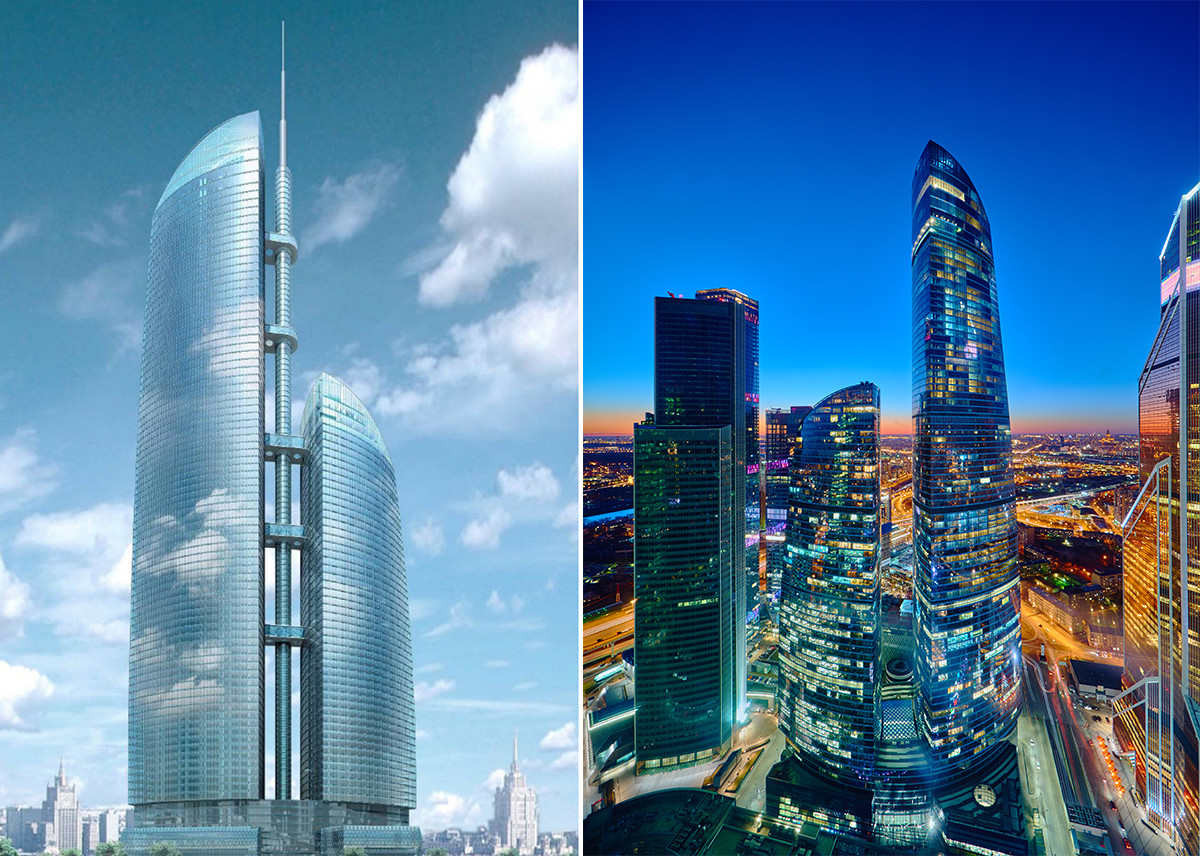
In its first project, the ‘Federation Tower’ was designed to resemble a ship with a mast and two sails. The mast was to be represented by a tall glass spire with passages between the towers. It was planned to make a high-speed lift in it. The top of the spire was going to be turned into an observation deck. But the ship lost its mast in the middle of its construction. Experts at the Moscow-city Museum based in the ‘Imperia’ (“Empire”) tower say, that the construction of the spire was stopped, firstly, due to fire safety reasons and secondly, because it posed a threat to helicopter flights – the flickering glass of the spire could potentially blind the pilots. So, the half-built construction was disassembled. However, an observation deck was opened in the ‘Vostok’ tower.
5. Open windows of ‘Federation Tower’
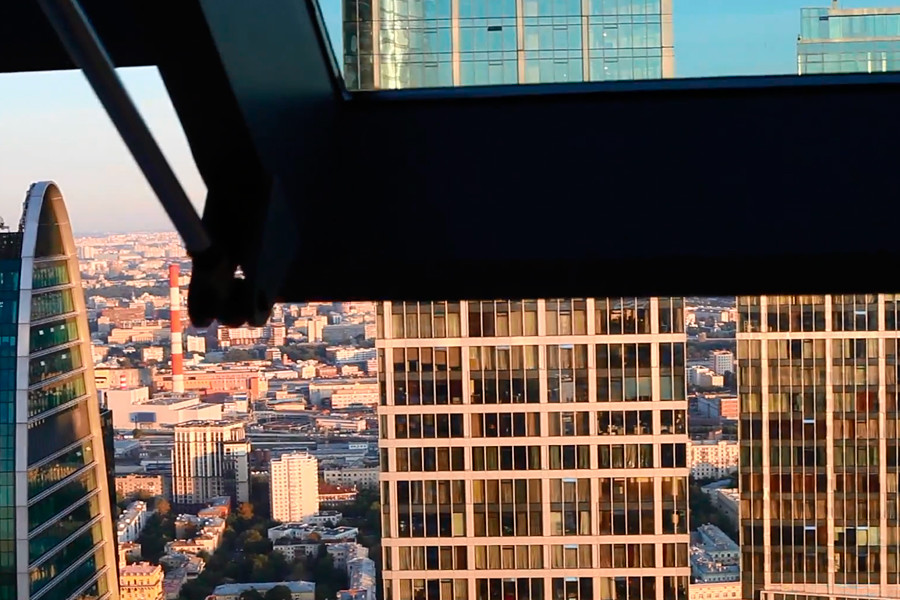
We all know that the windows of the upper floors in different buildings don’t usually open. Experts say that it’s not actually for people’s safety. Falling from a big height is likely to be fatal in any building. The actual reason is the ventilation system. In a skyscraper, it’s managed with a mechanical system, and the building has its own climate. But in the ‘Zapad’ (“West”) tower of the ‘Federation Tower’ complex, the windows can open. The 62nd and last floor of the tower are taken up by a restaurant called ‘Sixty’. There, the windows are equipped with a special hydraulic system. They open for a short period of time accompanied by classical music, so the guests can take breathtaking photos of Moscow.
6. Broken glass units of ‘Federation Tower’
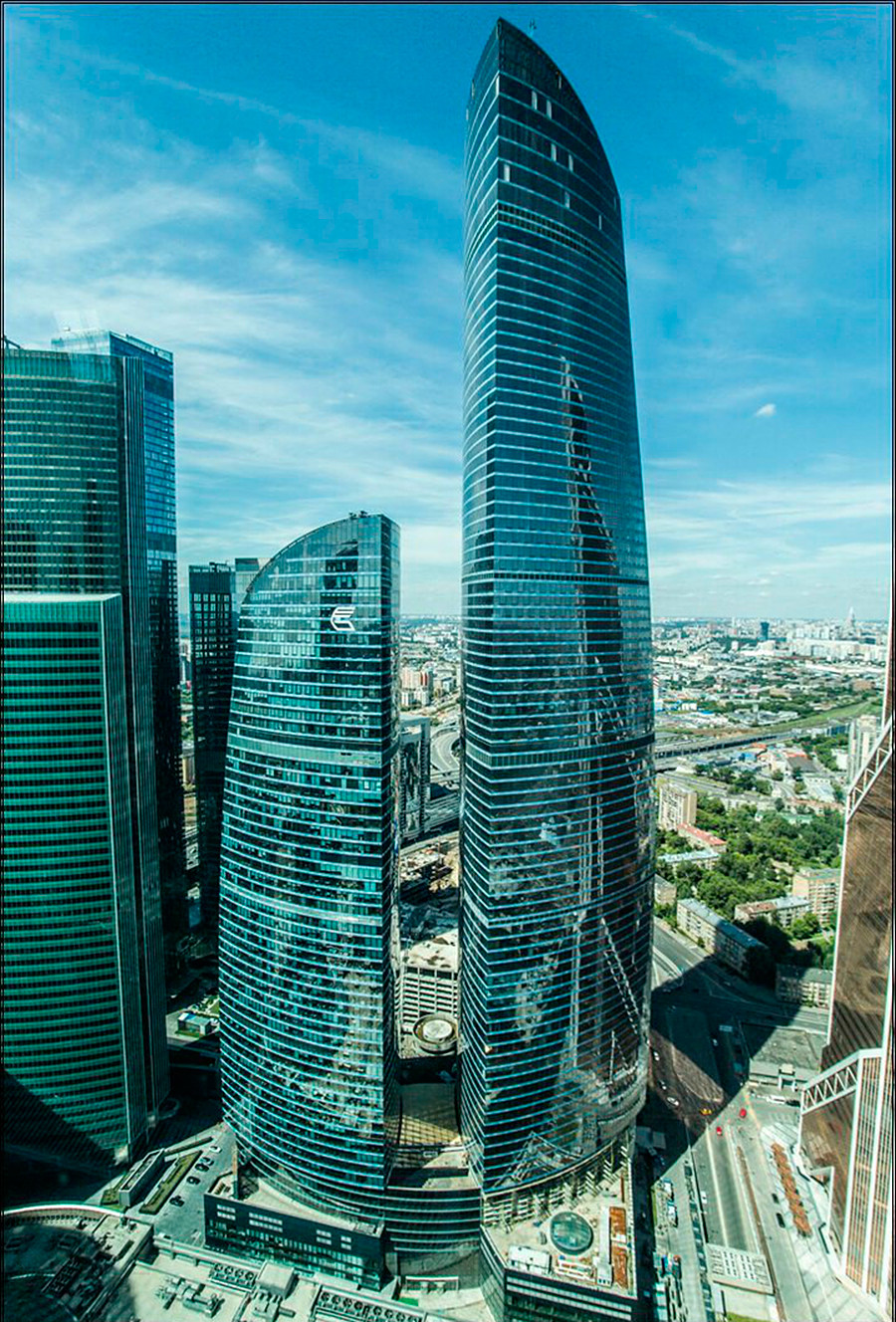
The guests of the ‘Sixty’ restaurant at the top of the ‘Zapad’ tower can be surprised to see cracked glass window panes. It is particularly strange, if we take into consideration the special type of this glass. It is extremely solid and can’t be broken once installed. For example, during experiments people threw all sorts of heavy items at the windows, but the glass wouldn’t break. The broken glass units of ‘Zapad’ were already damaged during shipment . As each of them is curved in its own way to make the tower’s curvature smooth, making a new set of window panes and bringing them to Russia was deemed too expensive . Moreover, the investors had financial problems (again, due to the 2008 financial crisis), so the ‘Vostok’ tower even stood unfinished for several years. Eventually, the cracked window panes were installed in their place.
7. The highest restaurant in Europe

‘Birds’, another restaurant in Moscow-City, is remarkable for its location. It was opened at the end of 2019 on the 84th floor of the ‘OKO’ complex’s southern tower. Guests at the restaurant can enjoy an amazing panoramic view at a height of 336 meters. On January 28, the experts of ‘Kniga Recordov Rossii’ (“Russian Records Book”) declared ‘Birds’ the highest restaurant in Europe, a step toward an application for a Guinness World Record.
If using any of Russia Beyond's content, partly or in full, always provide an active hyperlink to the original material.
to our newsletter!
Get the week's best stories straight to your inbox
- The evolution of Russia's No. 1 news program - from the USSR to now
- The Khodynka tragedy: A coronation ruined by a stampede
- ‘Moskvitch’: the triumph and sad end of a famous Moscow car plant (PHOTOS)
This website uses cookies. Click here to find out more.
Travel expenses: claimant guide
What can and cannot be claimed for travel, including mileage allowances, visas, and insurance.
The University will only reimburse the costs of travel incurred for a clearly defined and necessary business purpose to an external site for activity that could not otherwise be facilitated at the place of work or online.
If a third party is directly covering costs (for example a conference organiser will pay for your travel and accommodation), ideally arrangements should be made directly with the third party; either they pay the costs directly or an expense claim is submitted to them under their expenses process. If this is not possible, the University may be able to cover the costs (either by paying directly or refunding an expense claim) and cross-charge the third party by invoicing. Written evidence must be obtained in advance that the third party agrees to this arrangement.
Please also consider the University's Travel Policy when making arrangements for travel.
If you are travelling on University business you should use the best value for money method of travel.
Public Transport
Rail, metro, bus, coach, plane
- Travel should be by standard / economy class; travel by other classes is unlikely to meet the value for money principle
- In exceptional circumstances, where travel in Premium Economy or Business Class is the only practical option, this should be pre-agreed with the Head of Department (or their authorised delegate) prior to travel being booked. Evidence of the agreement should be retained
- Travel should be paid for by the University directly, using the preferred supplier when possible
Taxis and mini cabs
May be permitted for short and infrequent journeys.
Hired vehicles
In some circumstances where it is impractical to use public transport, hired vehicles may be needed.
- Hired vehicles should be booked by the University where possible
- Hired vehicles may only be kept for as long as necessary for undertaking University business and should not be used for private use
If you hire a vehicle directly you must ensure it is correctly insured for University use.
Private vehicles
If it is necessary to use private vehicles, mileage may only be claimed in line with the standard HMRC rates:
- 45p per mile for the first 10,000 miles in each tax year
- Then 25p per mile thereafter
- An extra 5p per passenger per mile accompanying for University business can be claimed up to the vehicles designed capacity
- Motorcycle/moped: at 24p per mile
- Bicycles: at 20p per mile
By submitting an expenses claim for mileage in a private vehicle, the claimant is declaring that they have a valid driving licence, the vehicle is safe, legal and roadworthy, is maintained to the manufacturer’s recommendations and is insured for business use.
Travel charges
Reasonable parking charges, road tolls and congestion charges incurred on University business can be claimed.
Travel insurance for overseas business travel may be reclaimed with departmental approval, only when University insurance cannot be obtained.
Travel visas - Overseas travel
Cost of essential travel visas can be claimed. To determine whether travel is essential please refer to the University's Travel Policy .
Visas for foreign nationals to work in the UK
In some circumstances, departments may agree to pay for or reimburse an individual's costs if they require a visa to work for the University in the UK. Further guidance is available from the Staff Immigration Team .
Only the cost of initial visas for foreign nationals can be claimed via eExpenses. If your department agrees to cover it, visa renewals should be submitted using the Taxable Benefits Expenses claim form.
What should not be claimed
- Ordinary commuting between your home and your normal place of work
- Charges for parking at your normal place of work
- Season/multiple journey tickets where it cannot be proved that they are solely for business use. Only the cost of individual journeys will be refunded
- First class travel
- Fines e.g. parking or speeding fines
- Vaccinations should be arranged via the University’s Travel Clinic (Occupational Health)
Log in to SAP Concur eExpenses
Only use this link, do not access via SAP Concur website. Re-click here if session times out
SAP Concur 24/7 support: 0800 389 8758
Try the app!
When eExpenses is live in your department, download the app and log in using:
- Verified email address or
- SSO (in format [email protected] ) or
- University unique mobile code (95D6V7)
- Expenses claim form - Externals (xlsx)
- Expenses claim form - Externals (pdf)
- Taxable benefits expenses claim form (xlsx)
- Taxable benefits expenses claim form (pdf)
- Expenses claim form - Non-UK bank account (xlsx)
- Expenses claim form - Non-UK bank account (pdf)
Guidance and support
- Expenses Policy (pdf)
- Expenses process
- Guidance for claimants
- Guidance for departments
- eExpenses Claimant QRG (pdf)
eExpenses Approver QRG (pdf)
eExpenses training and support
eExpenses How to videos
- Travelling for Business
- Key Travel

IMAGES
COMMENTS
University Travel Insurance - Introduction. Provision of University travel insurance is in accordance with the University policy on travel (latest policy 01/08/2022). Activation of the insurance cover requires an approved application (submitted via TIRS unless otherwise indicated) and is subject to compliance with University policies and the ...
TIRS is accessed via https://travelinsurance.admin.ox.ac.uk/. University Business Travellers and those entering information on their behalf (i.e Department PAs) - please request initial access to the TIRS system via the Financial Systems Service Desk on either. T: 01865 (2)84800 8am - 5pm Mon-Fri (except BH, Easter and Christmas) E: financials ...
To be eligible for insurance, staff and students must be travelling on business for the University of Oxford, and must be members of staff or students in the Faculty of Law. Any queries about this should be forwarded to Tarquin Holmes in the first instance. Risk Assessments. In accordance with University policies on fieldwork and overseas ...
Study abroad. As a truly global institution, the University of Oxford understands the importance of international experiences to your academic, career and personal development. There are opportunities to study, work, or undertake research in dozens of countries across the globe. For a wide range of study, exchanges and research opportunities ...
Check the actions Oxford University staff must take when planning business travel or fieldwork to ensure you have a safe and productive trip Pause animated content ... The cover is not automatic and must be applied for through the Travel Insurance Application and Travel Registration System (TIRS). Insurance cover includes emergency assistance.
Travel Insurance for University Staff and Students. The University has a scheme to provide cover for the employee/student and their personal belongings while travelling on University business. Full details of the scheme (and policy coverage /exclusions) can be found on the University insurance web site. Note that cover under the policy is ...
Departments are required to use the standard template for overseas travel. However, the template can be tailored to individual departmental risk profiles. A local decision on whether Section 1 of the template is uploaded to the University's Travel Insurance Application and Travel Registration System (TIRS) can be made. For example, it may be ...
Travel insurance claims will be paid in accordance with the University Expenses Principles and therefore the University's Expenses Policy should be followed when arranging travel: https://finance.admin.ox.ac.uk/expenses - although please note that the insurance claim should not be confused with any other standard expense claim for the trip.
Oxford Travel Guide. Oxford is a charming, historic city located just a short ride from London. The city is famed for its prestigious university, which is one of the oldest in the world (it was founded in the 11th century). Oxford first earned fame in the Middle Ages as a hub for theological learning. It then expanded into medicine and law.
As the nation's original travel insurance comparison site, InsureMyTrip has over 20 years of experience connecting travelers like you with the best policy for your trip. Our simple quote process helps you choose the right coverage by comparing top plans from trusted providers. And if you need help, our licensed insurance agents can assist you ...
By your side, worldwide. UnitedHealthcare Global provides you and your family with around-the-clock support, all over the world. Instant connection, 24/7, through our Emergency Response Center. Access to over 1.9 million physicians, clinics, and hospitals worldwide. 24/7 support available. 100+ languages. 150+ countries. 1.9M providers worldwide.
COVER INFORMATION. EXCLUSIONS. Worldwide cover. Unlimited travel period. Cover for pre-existing medical conditions is included provided the guidance on arranging insurance is followed. Cover is only provided for personal time when it is incidental to the University business trip and the traveller is returning from the same airport.
1. Contact Key Travel directly to request a quote: Tel: 0161 819 9763. Email: [email protected]. Once a quote has been obtained and you wish to make a booking please forward your quote details, including quote number, to [email protected] to obtain a purchase order to secure the booking.
The full policy can be downloaded from this page. Travel necessary for meeting the University's business needs, paid for or reimbursed by the University for staff, students or visitors. Travel that is funded by research grants must also adhere to any additional travel requirements of funders. Follow the travel hierarchy of avoid travel ...
Please enter your home ZIP Code so we can direct you to the correct AAA club's website. AAA is a federation of independent clubs throughout the United States and Canada. Search AAA locations near you. Enjoy all AAA services from roadside assistance to car insurance. Use the store locator to find your local AAA branch.
Atlas Journey Premier offers $150,000 in primary medical coverage. Both plans have top-notch $1 million per person in medical evacuation coverage. Each plan offers travel inconvenience coverage of ...
Walking tour around Moscow-City.Thanks for watching!MY GEAR THAT I USEMinimalist Handheld SetupiPhone 11 128GB https://amzn.to/3zfqbboMic for Street https://...
Travel Insurance Summary Group Personal Accident & Worldwide Travel Policy The Chancellor, Masters & Scholars of the University of Oxford Policy Holder: Oxford Mutual Limited Your Reference Number: P23PATPTP01267 Policy Period: 01 August 2023 - 31 July 2024 AonProtect Assistance Helpline Number 044 207 173 7797
EPIC MOSCOW Itinerary! (2024) Moscow is the heart of Mother Russia. Just the mention of this city conjures images of colorful bulbous pointed domes, crisp temperatures, and a uniquely original spirit! Moscow has an incredibly turbulent history, a seemingly resilient culture, and a unique enchantment that pulls countless tourists to the city ...
The Australian Consulate in St Petersburg can provide limited help. If you have significant concerns for your welfare or that of another Australian, contact the Consular Emergency Centre on 1300 555 135 in Australia or +61 2 6261 3305 outside Australia. Full travel advice: Local contacts.
Moscow-City is a vivid skyscraper cluster with a lot of amazing secrets. 1. Guinness World Record in highlining. mos.ru. The record was set in 2019 by a team of seven athletes from Russia, Germany ...
Travel insurance for overseas business travel may be reclaimed with departmental approval, only when University insurance cannot be obtained. Travel visas - Overseas travel ... Oxford OX1 2ET. Tel: 01865 (6) 16215. VAT registration: GB 125 5067 30 EORI number: GB 125 5067 30 065. QUICK LINKS. Financial Processes. Finance Division A-Z.
Travel insurance often costs 4% to 10% of your trip's total price. So if your backpacking adventure will run you $4,000, the total cost of insurance may be $160 to $400.